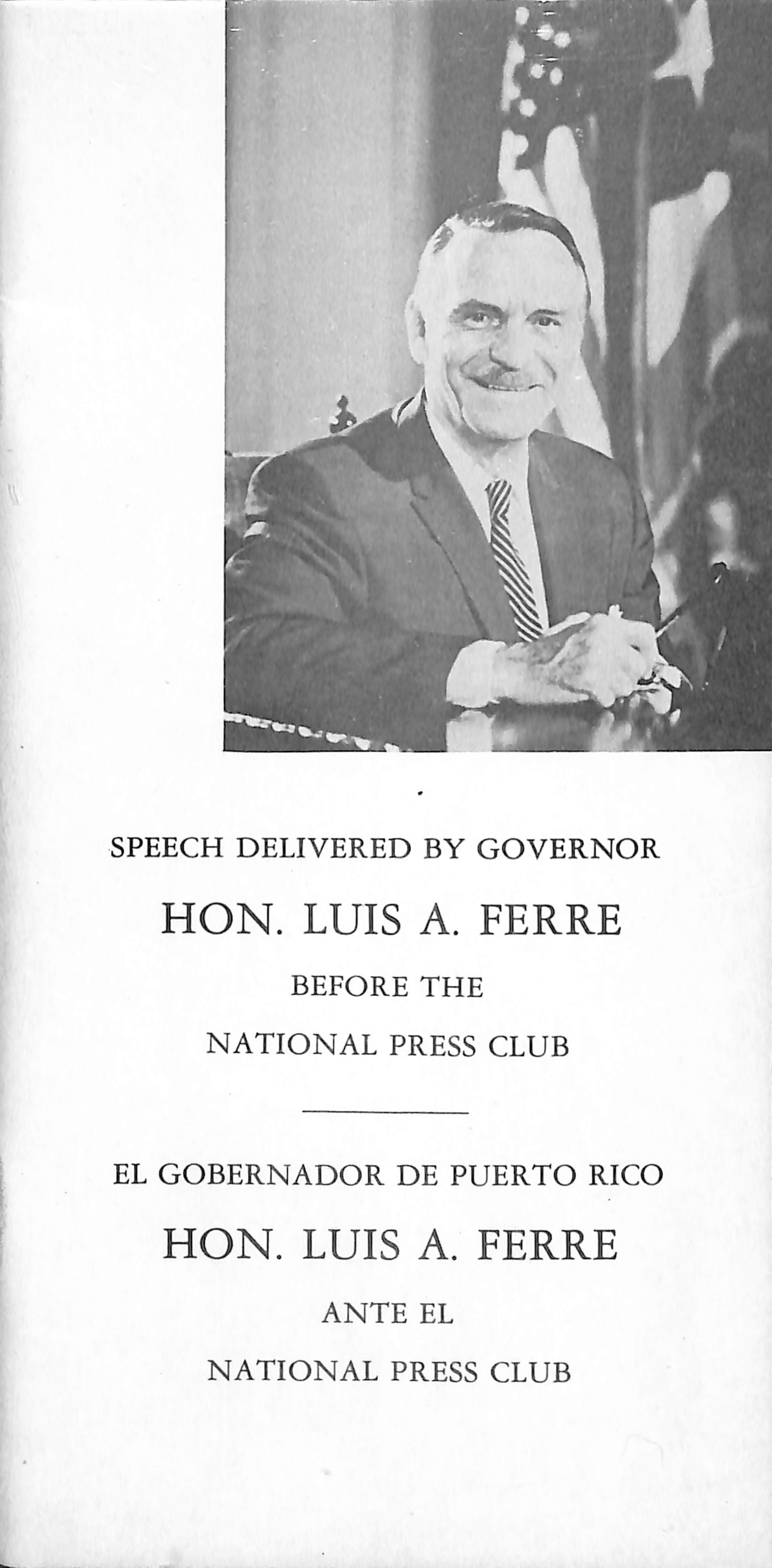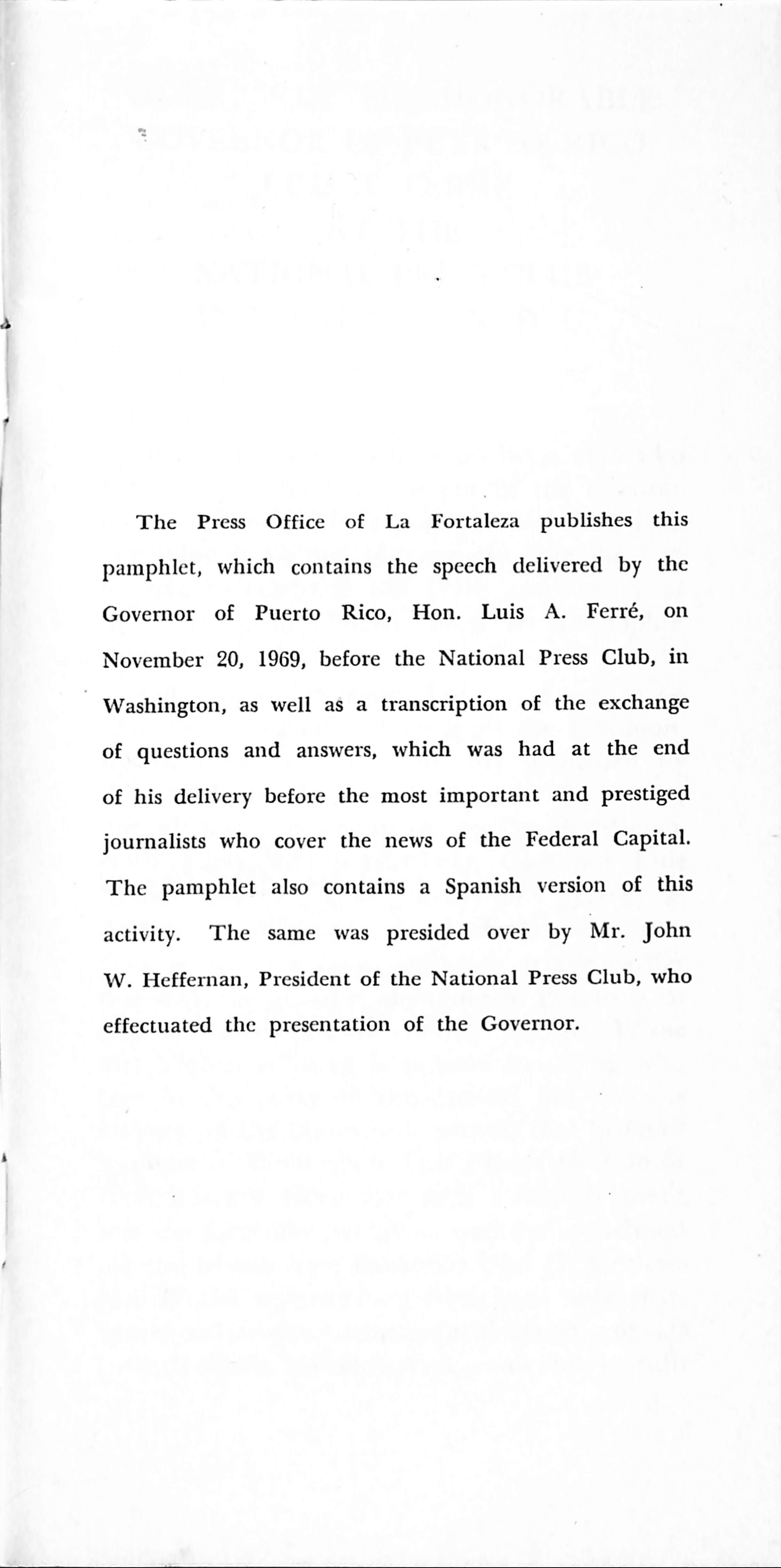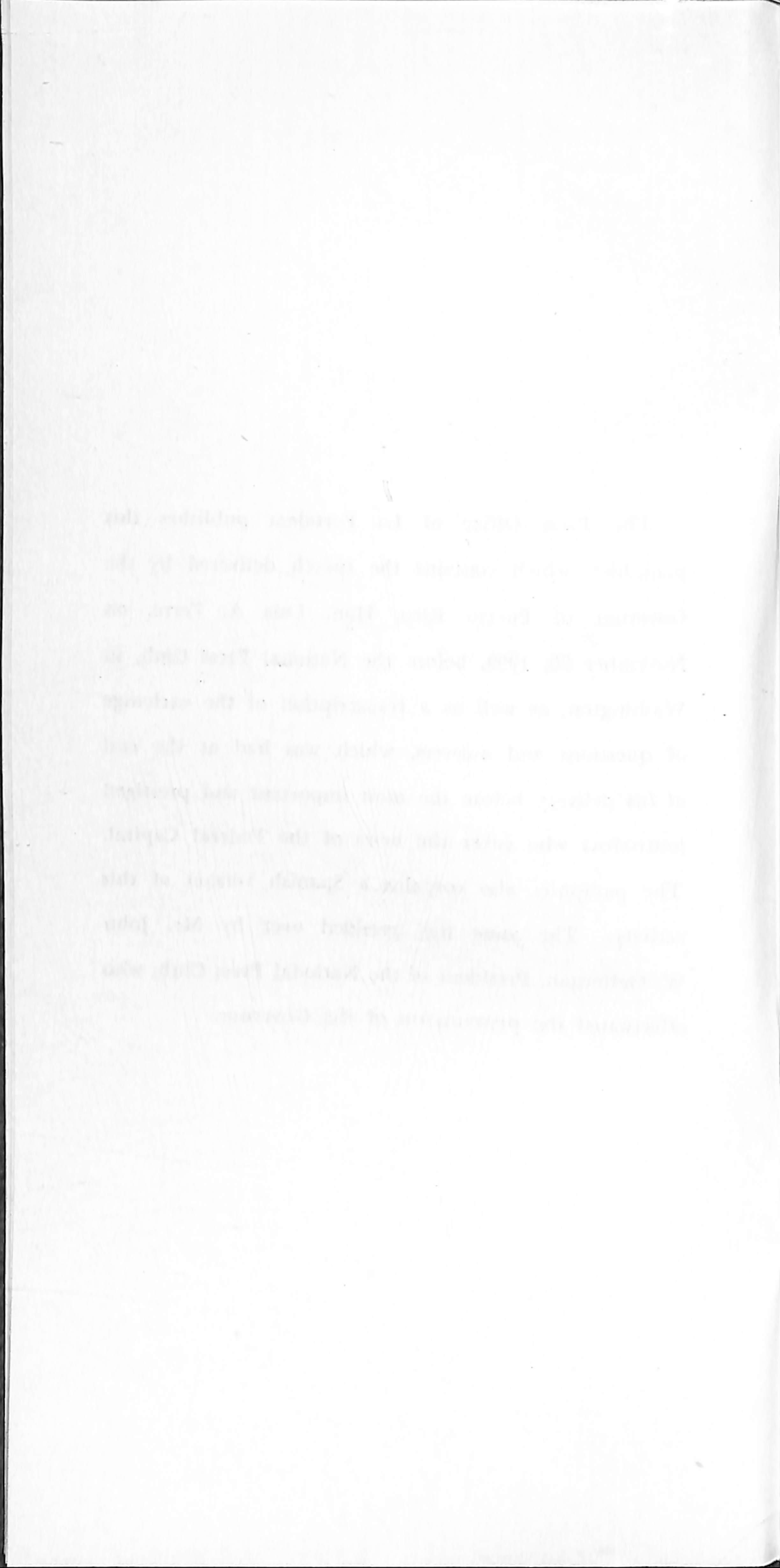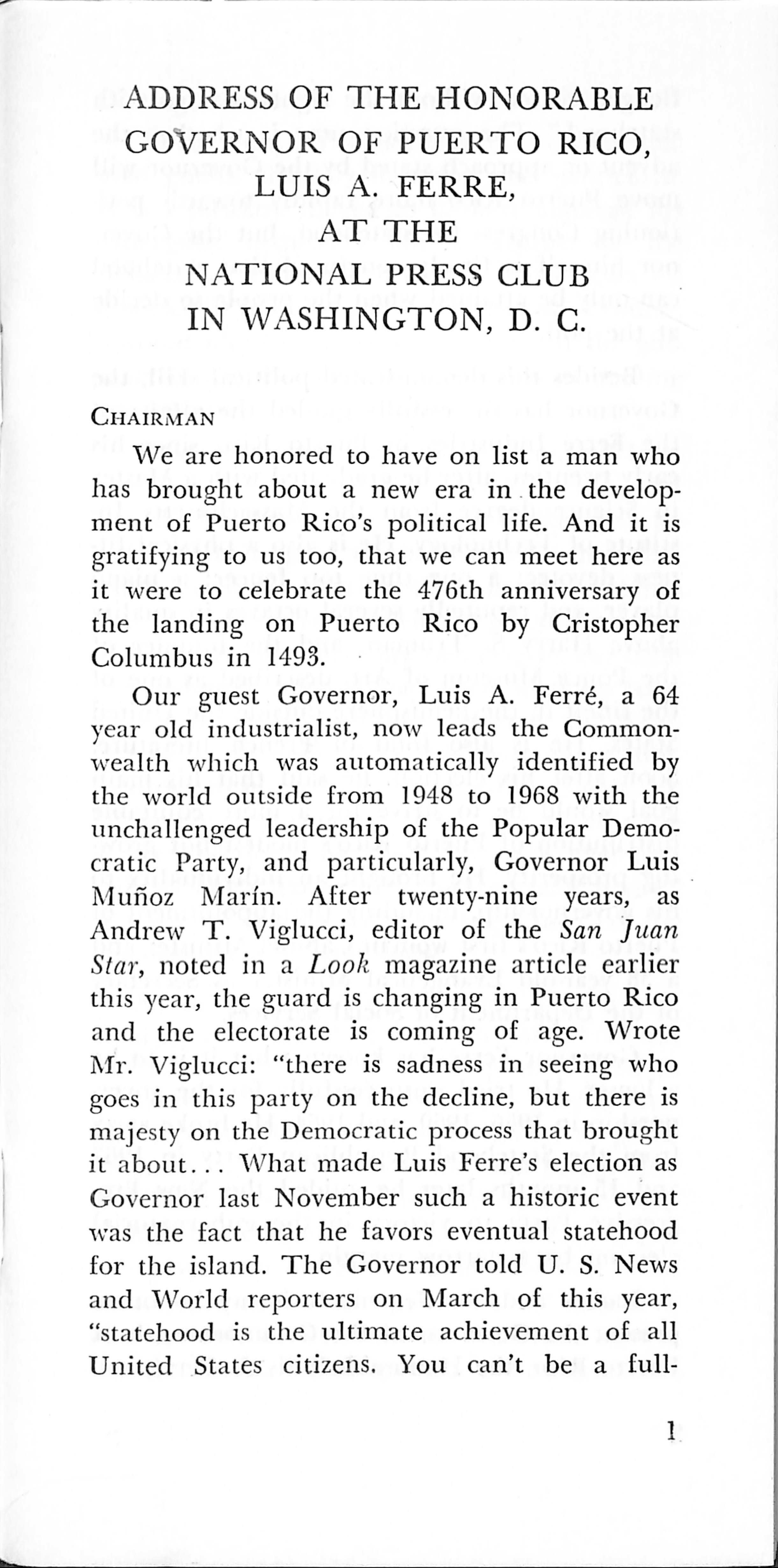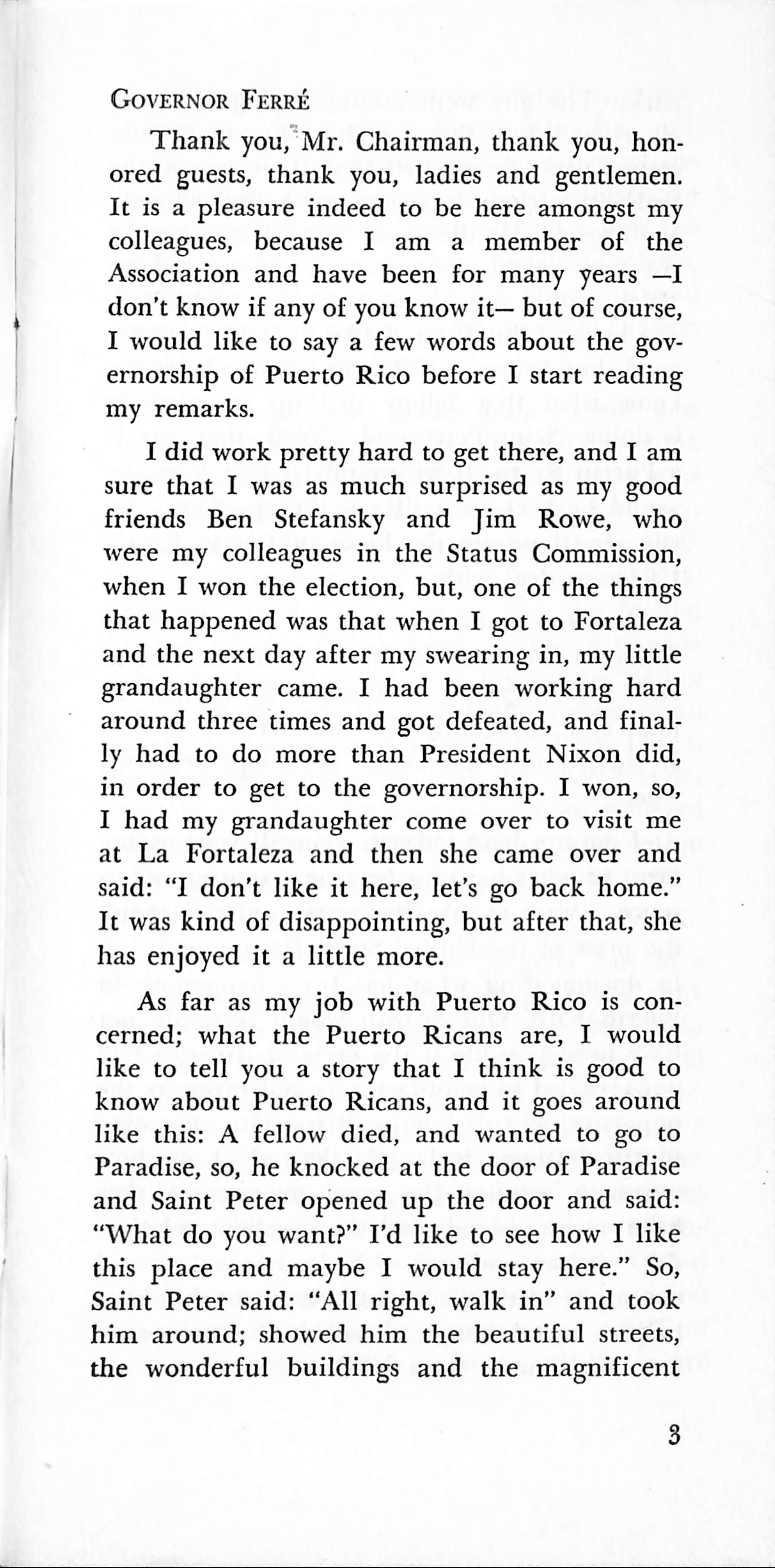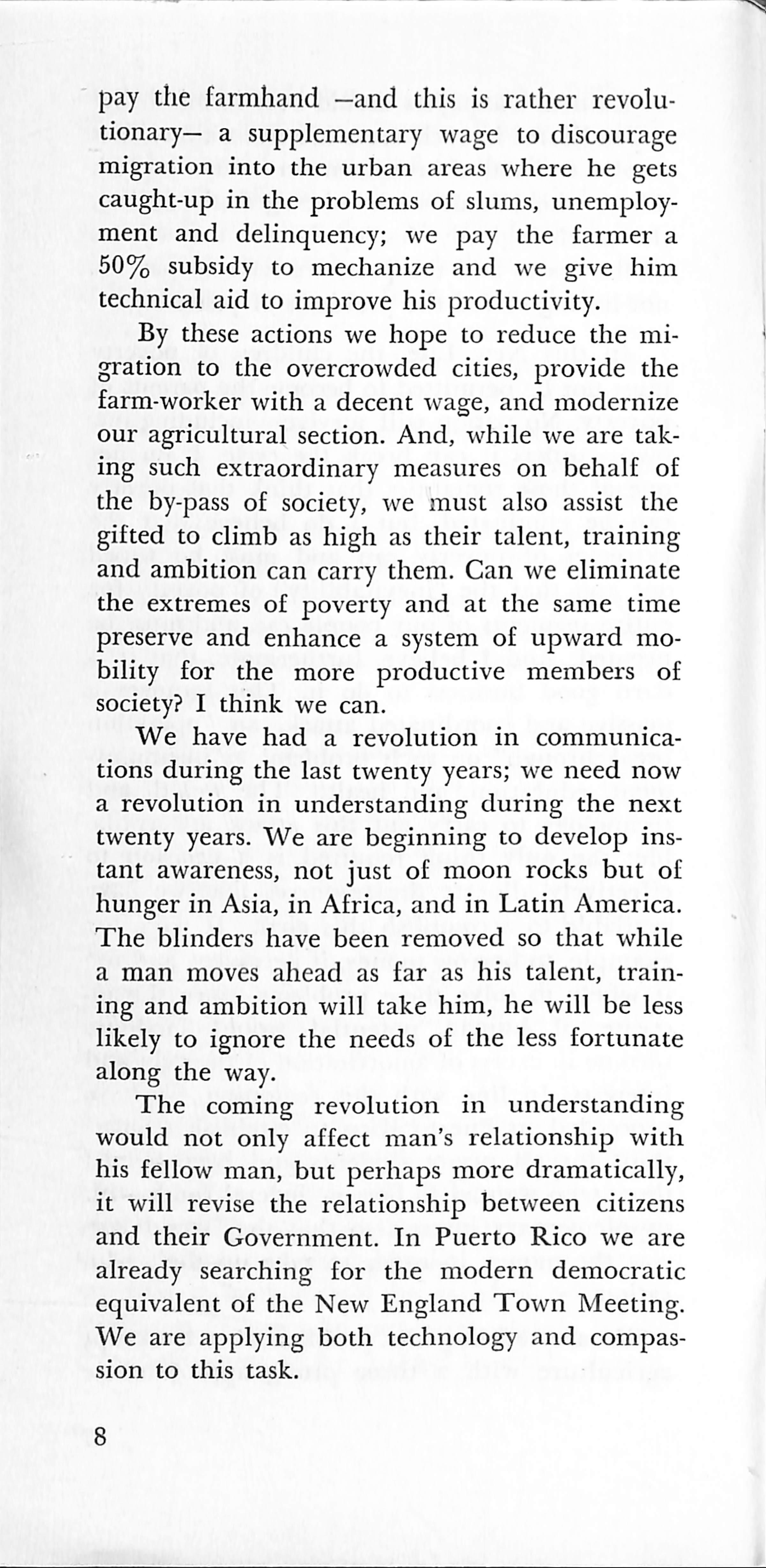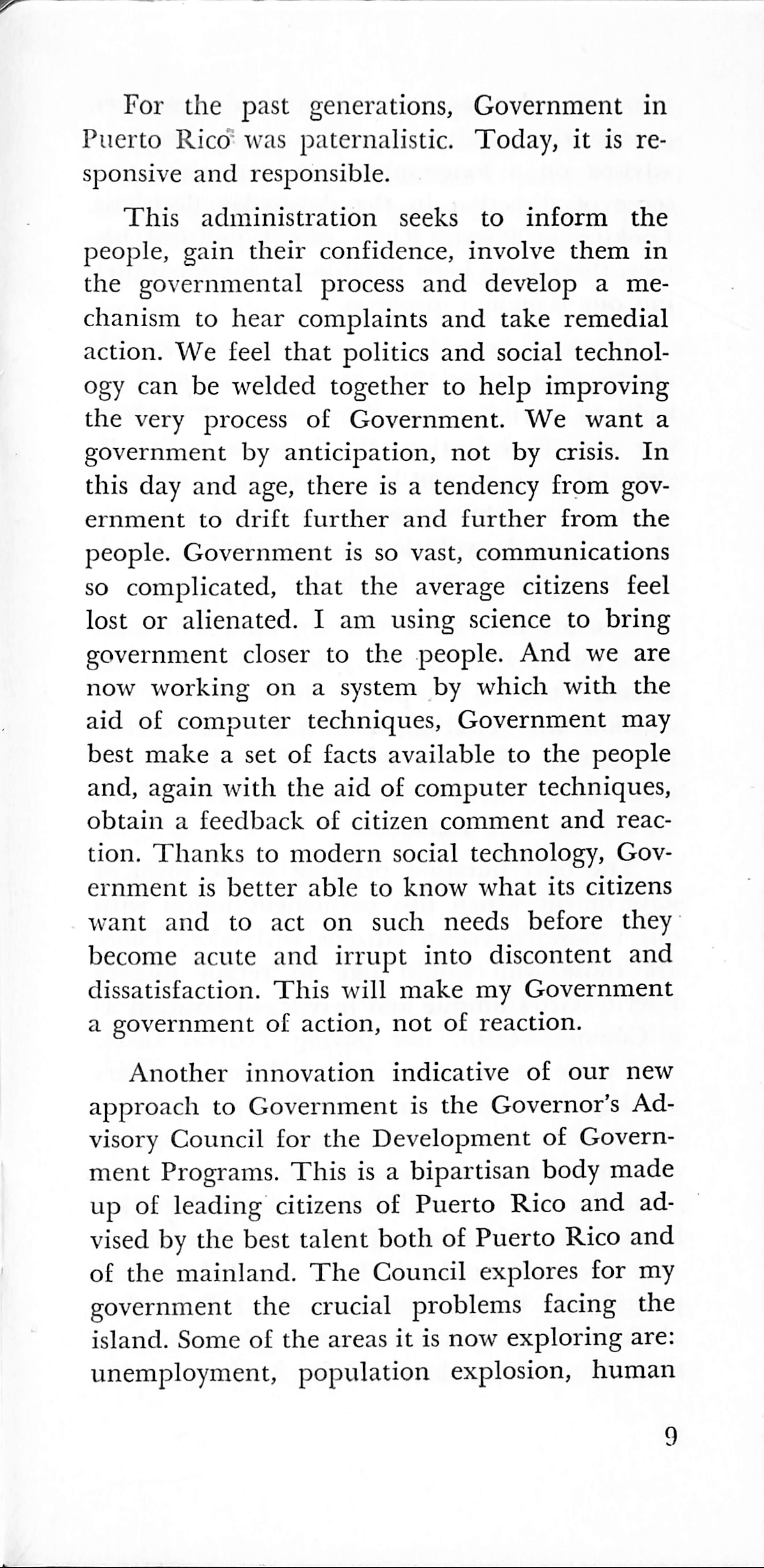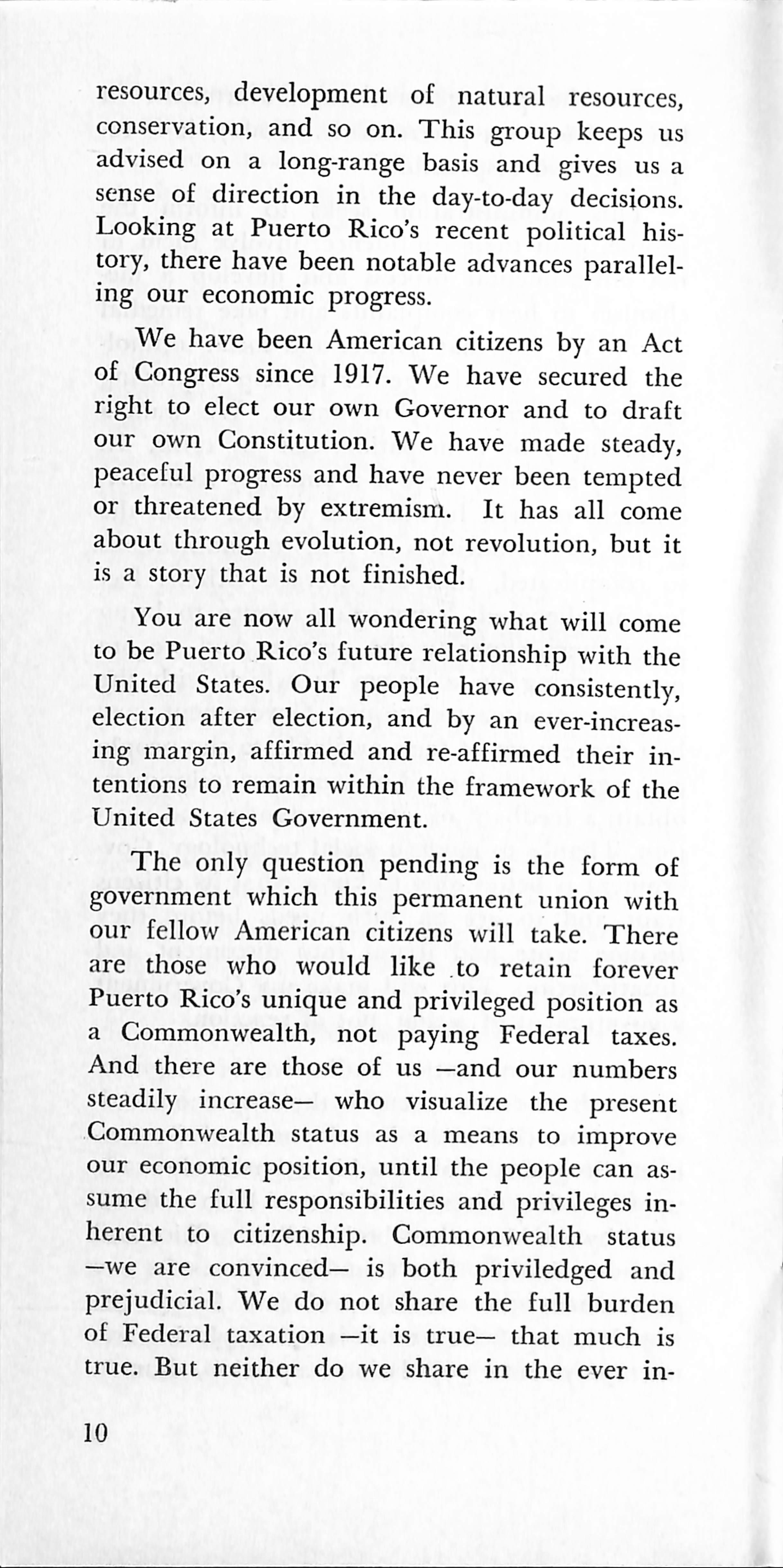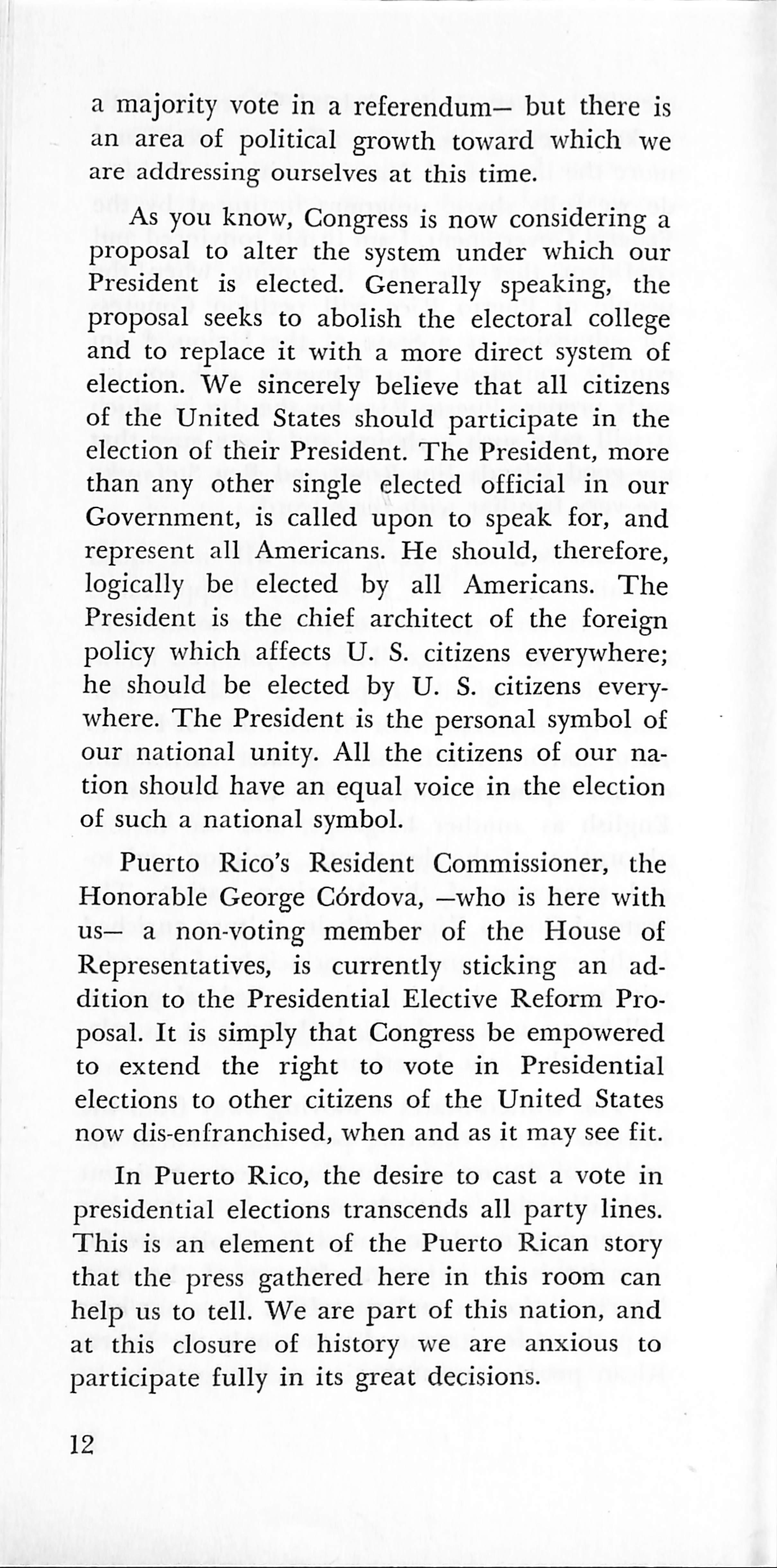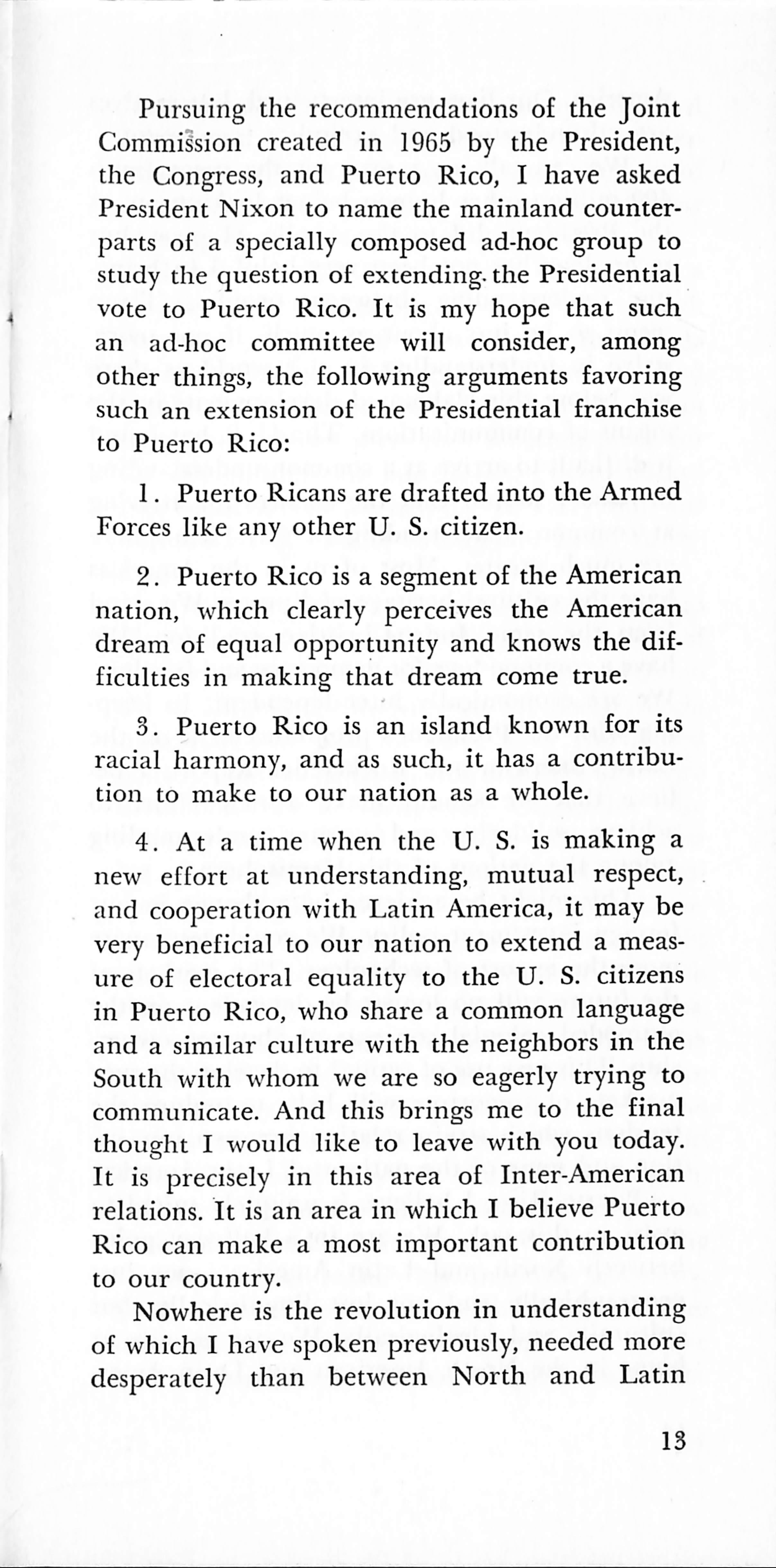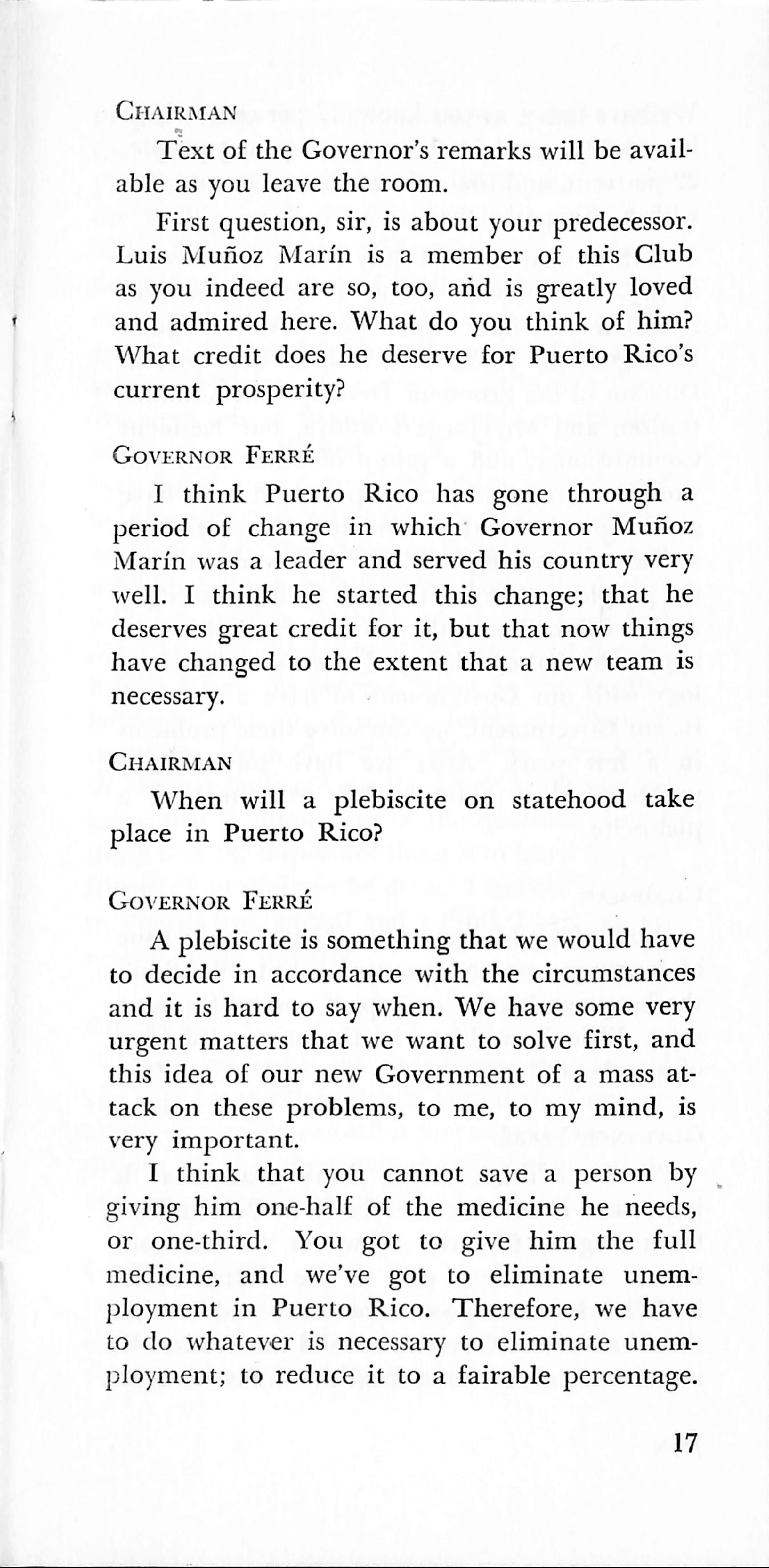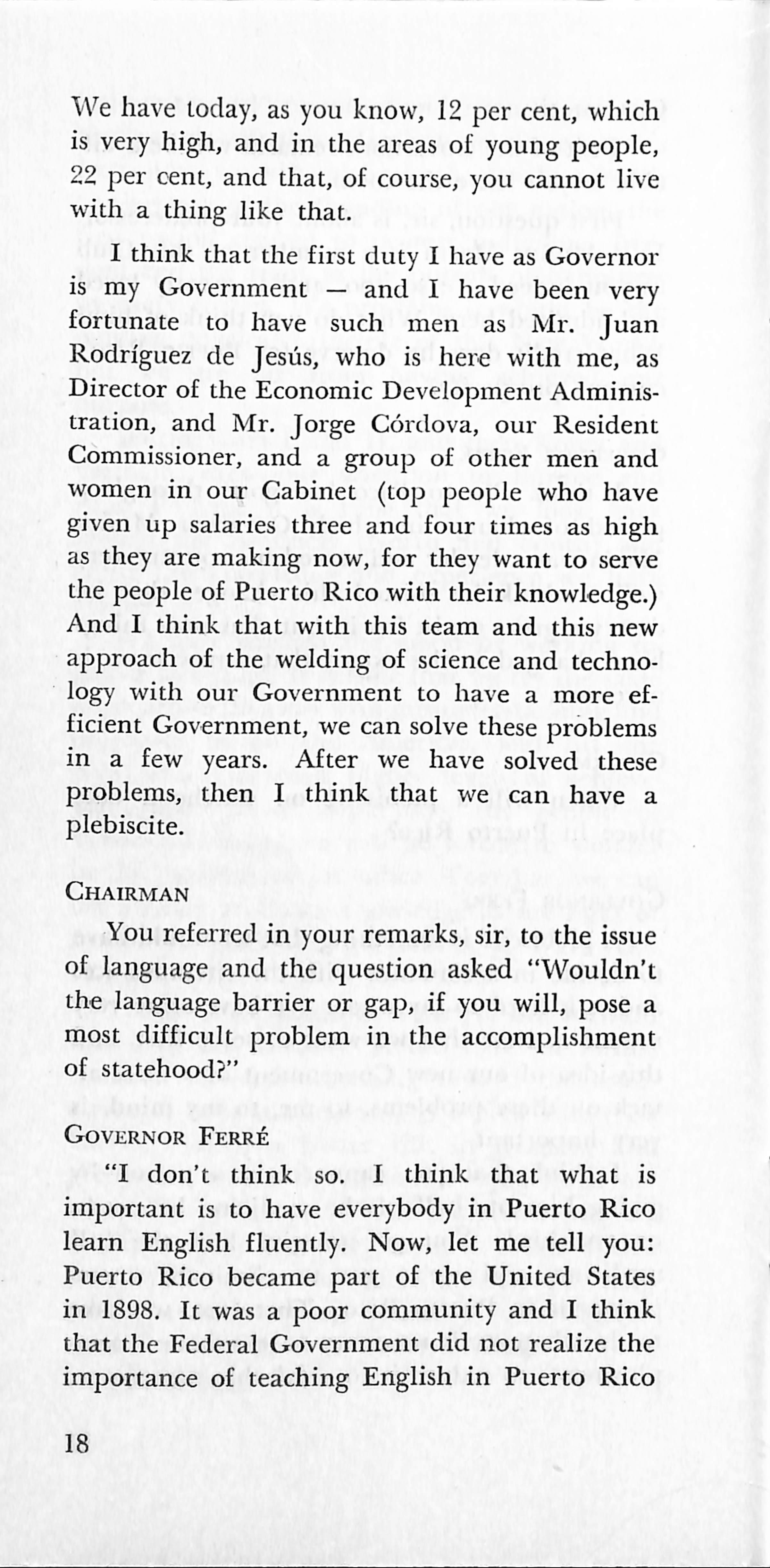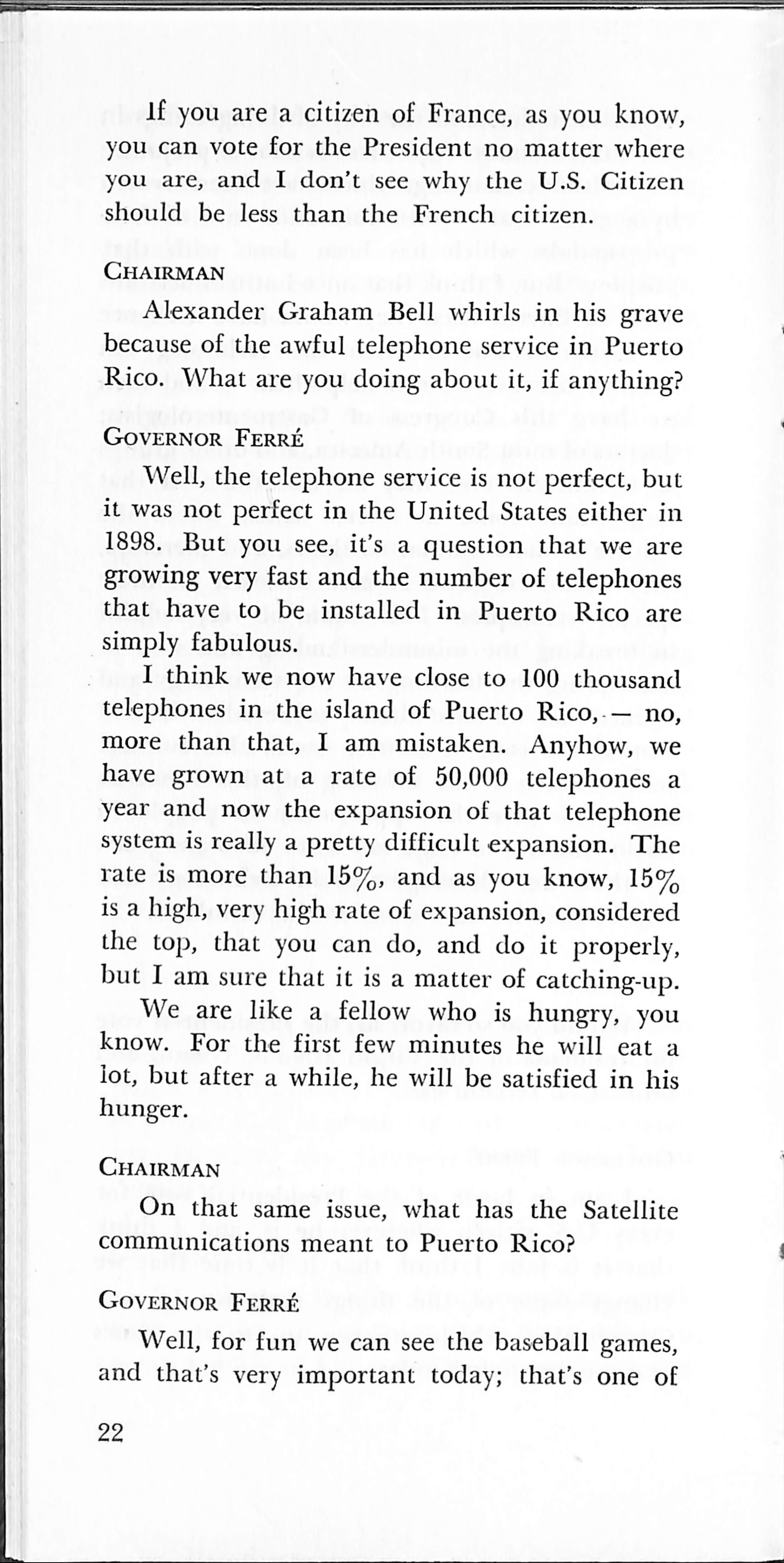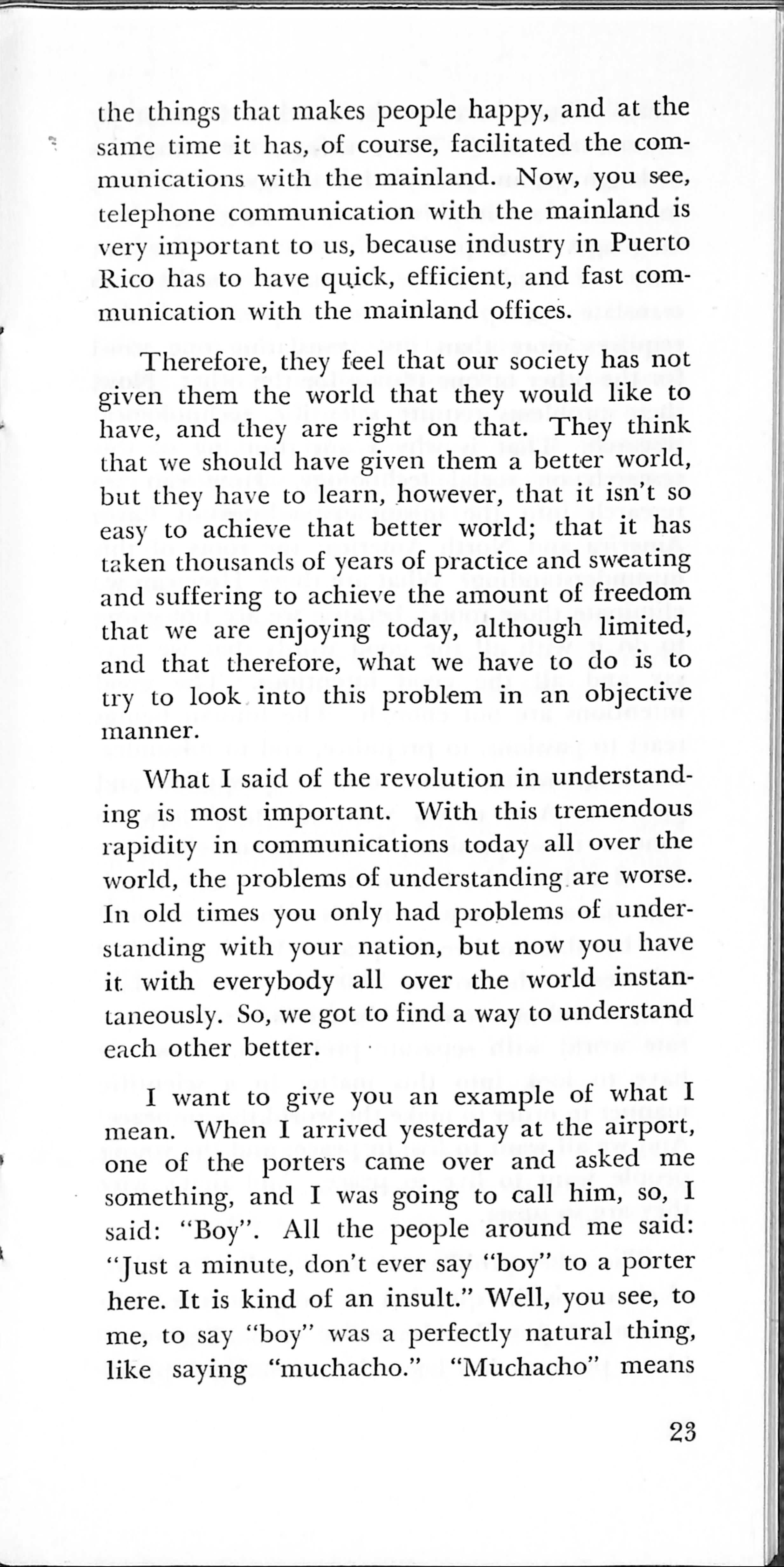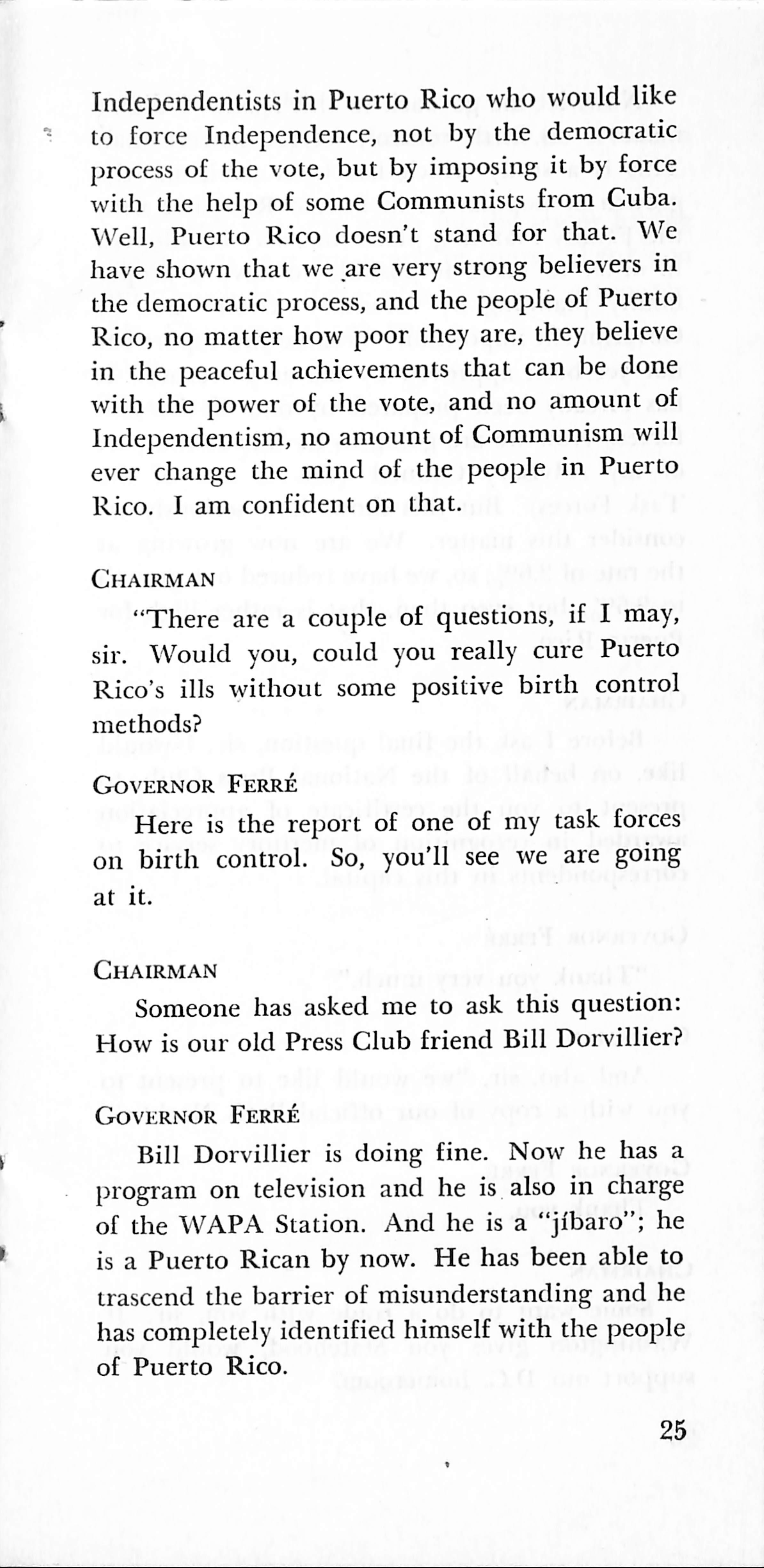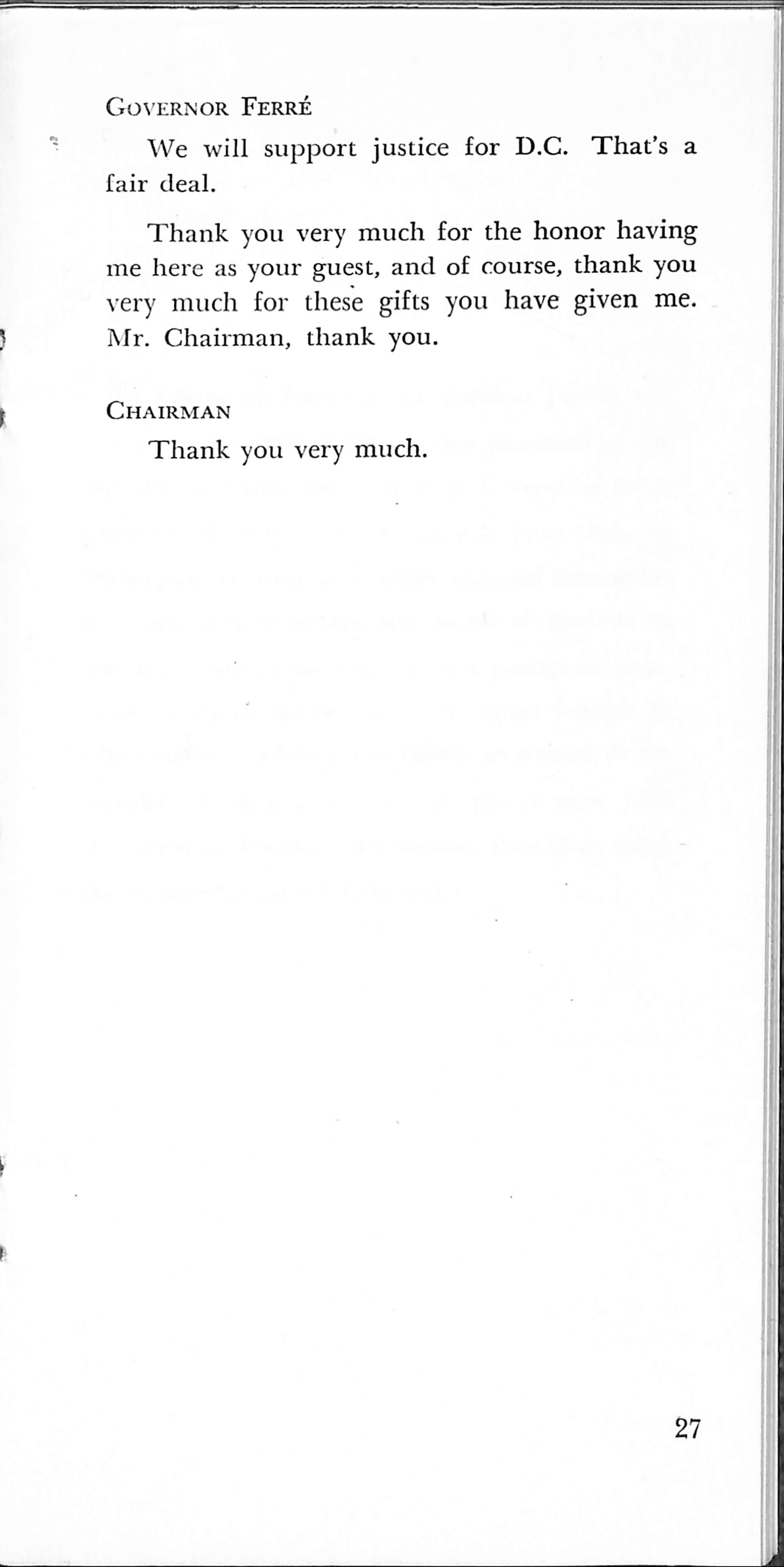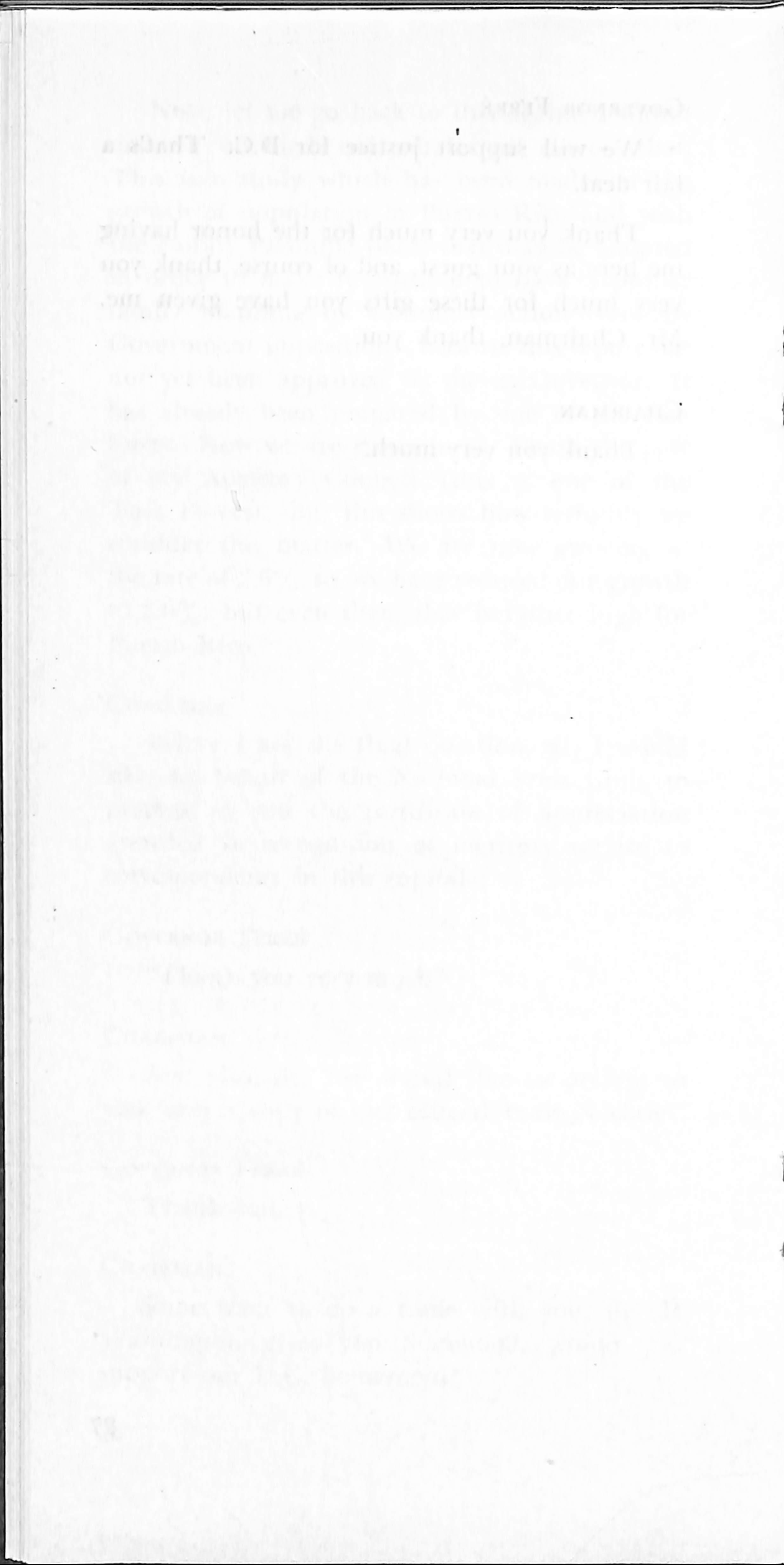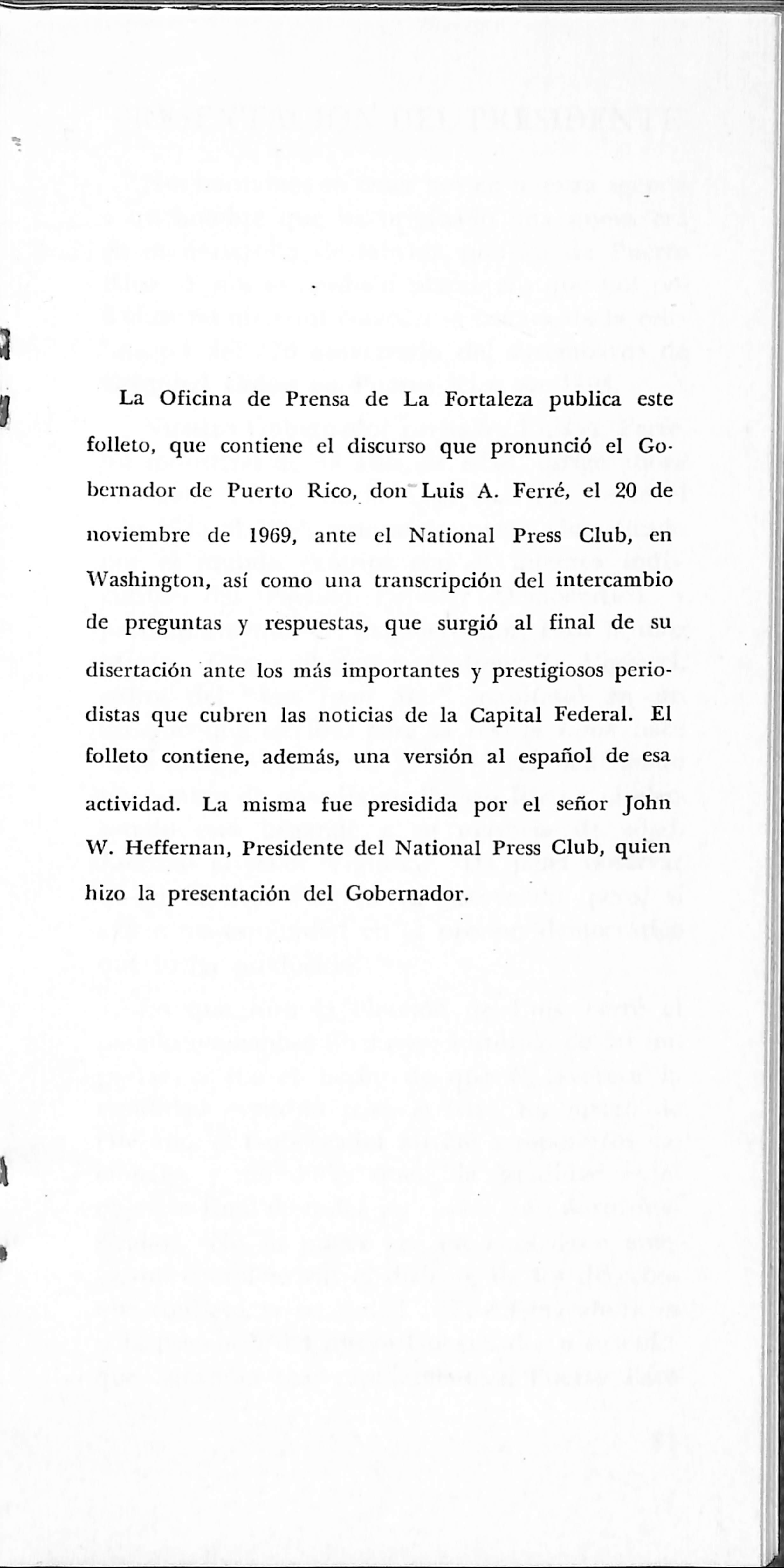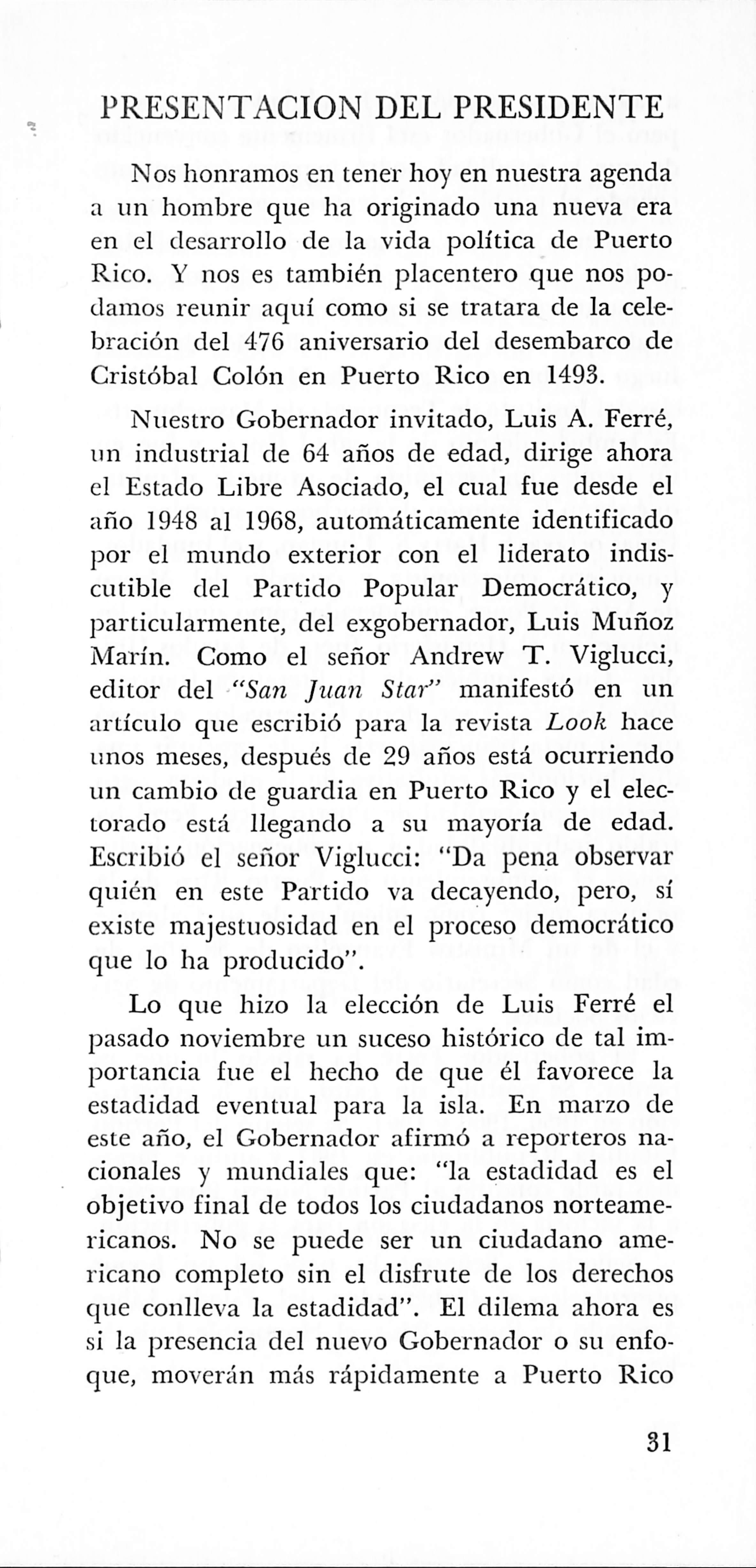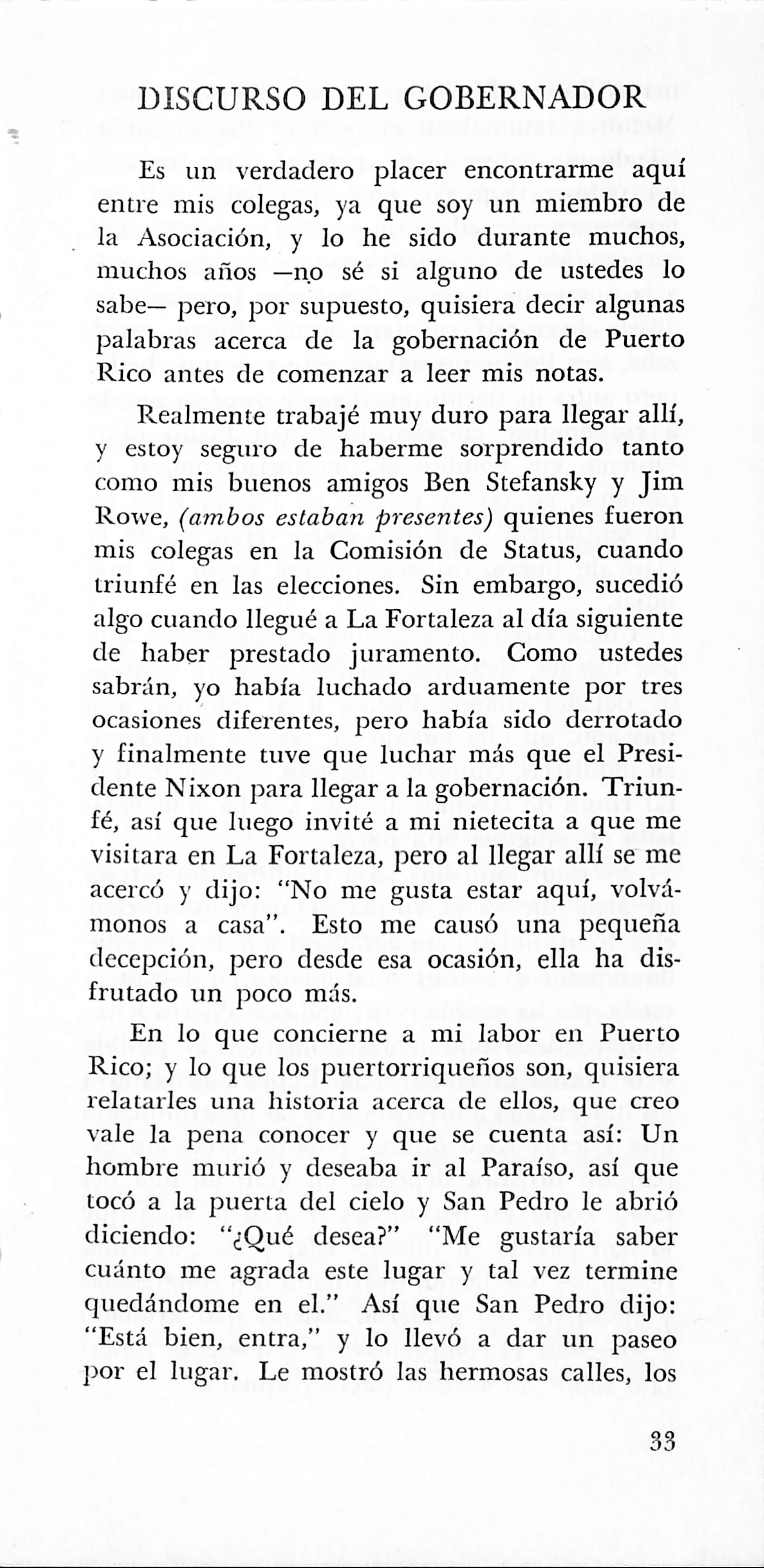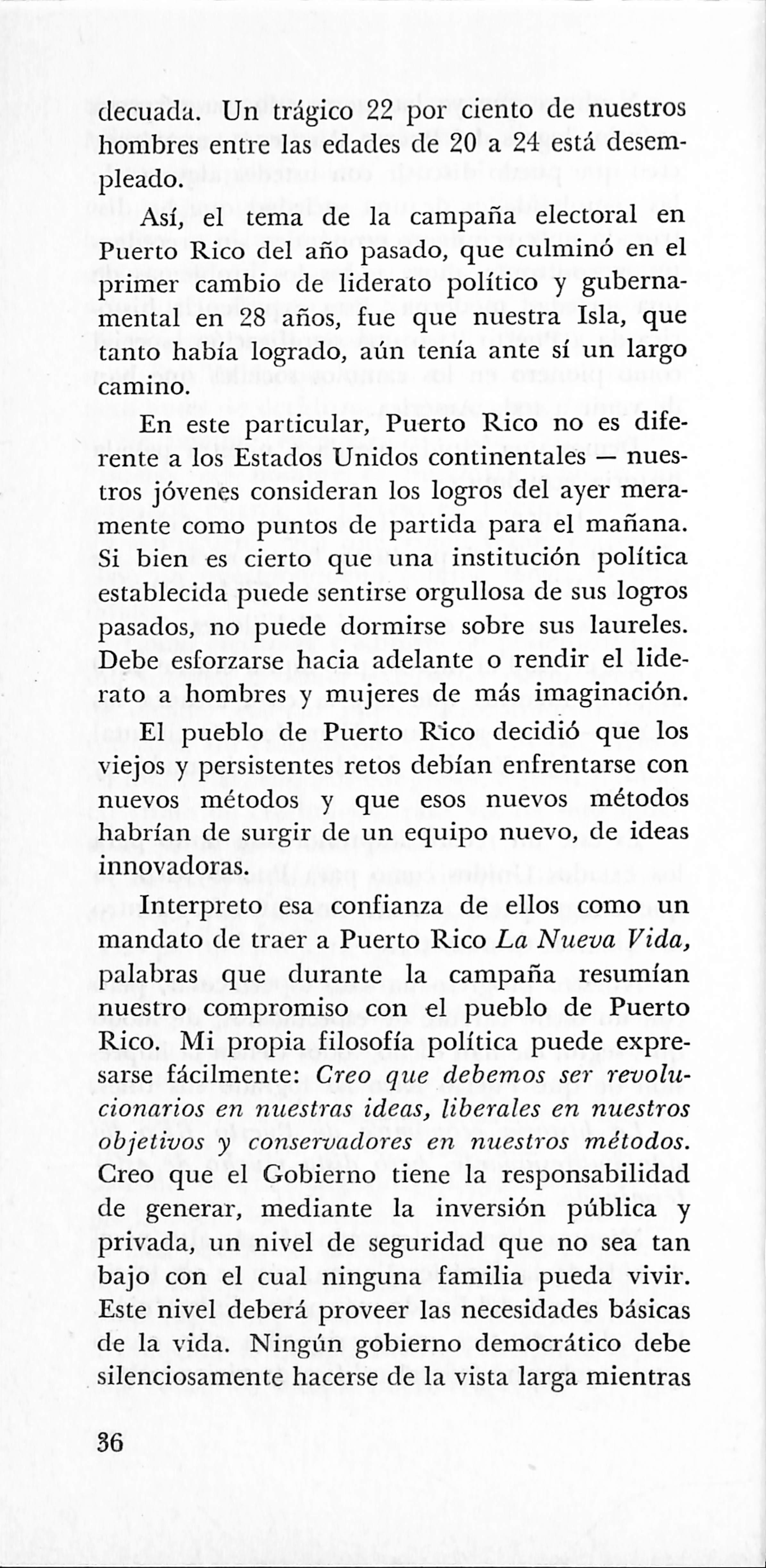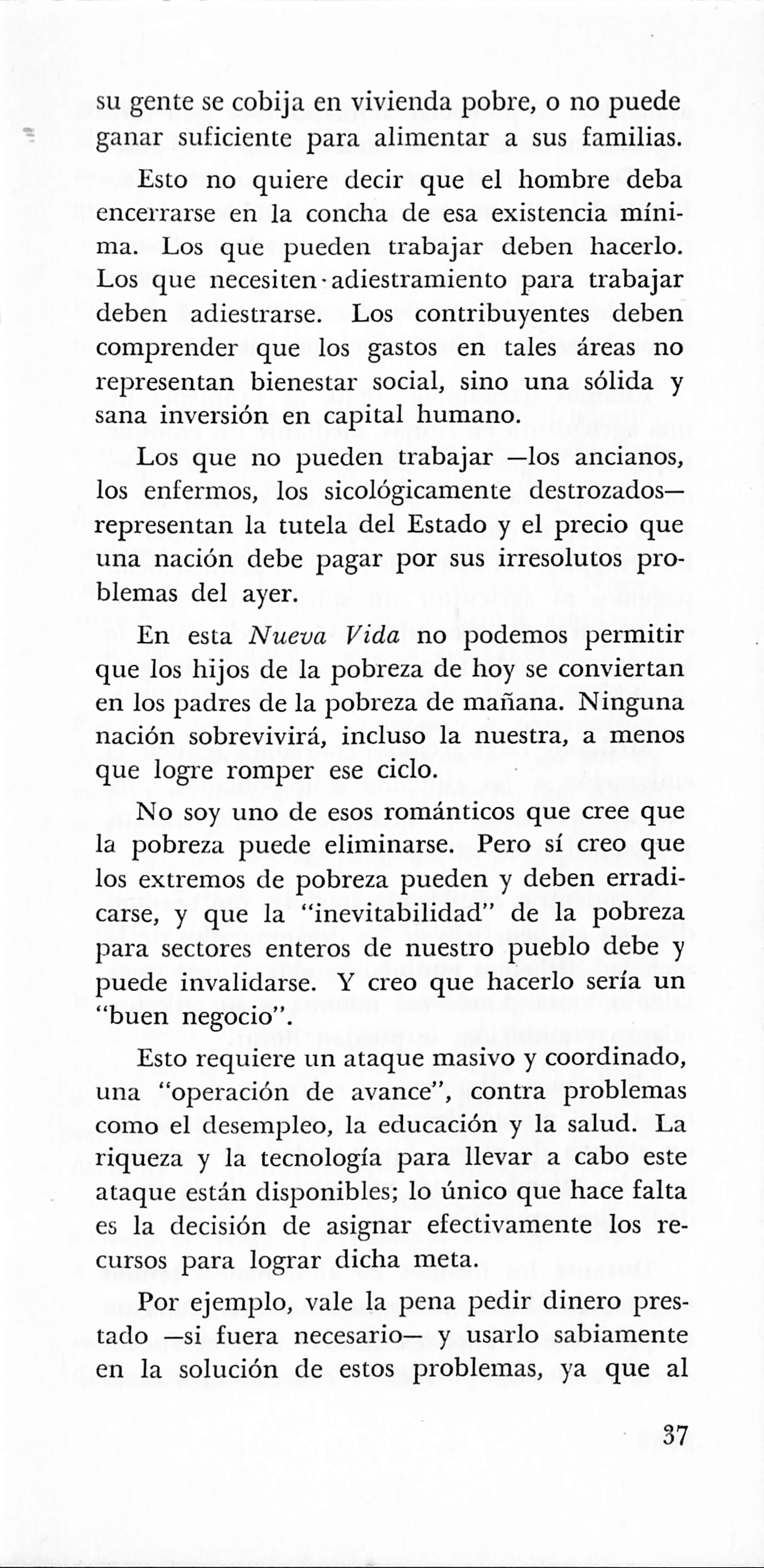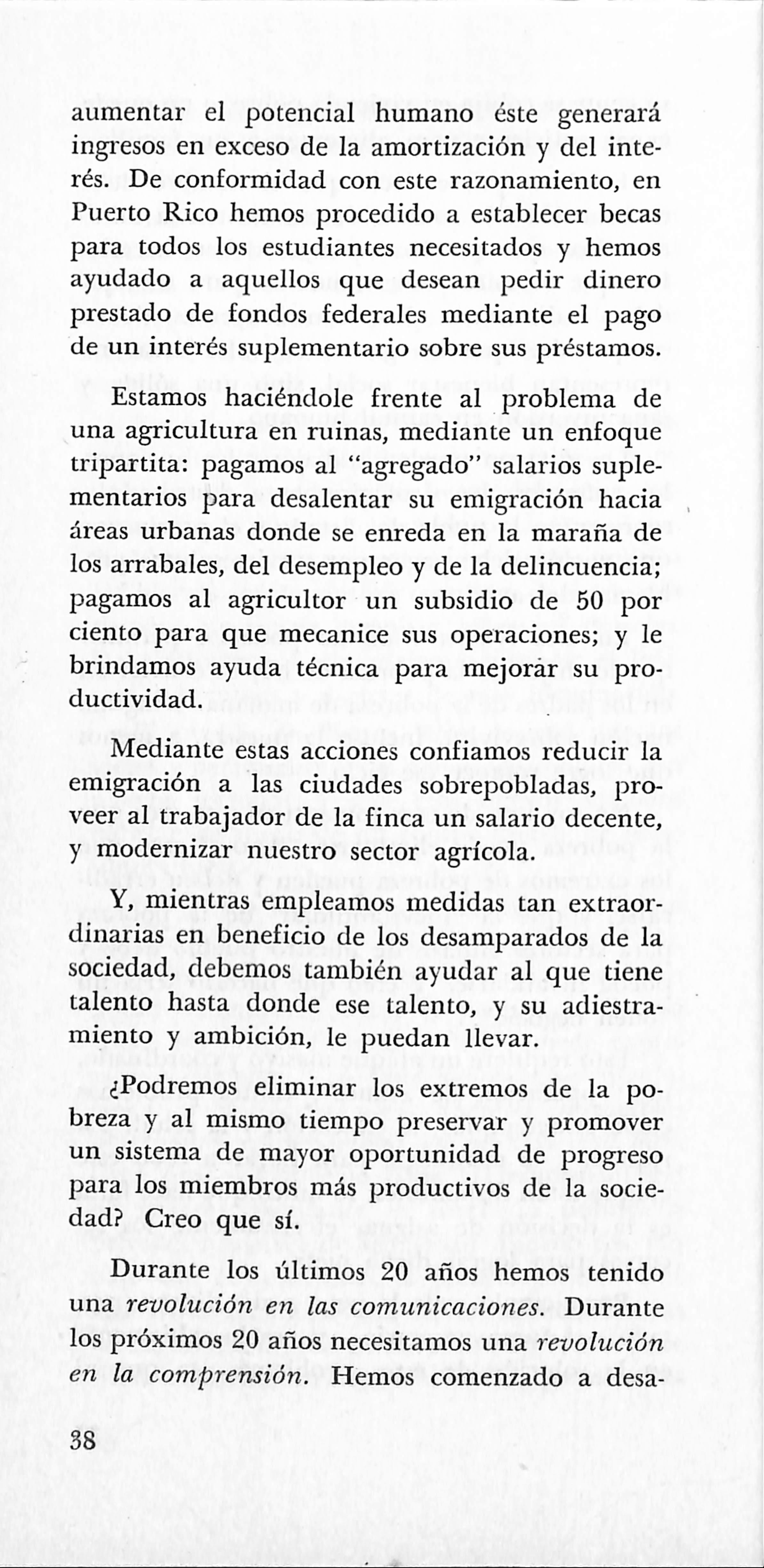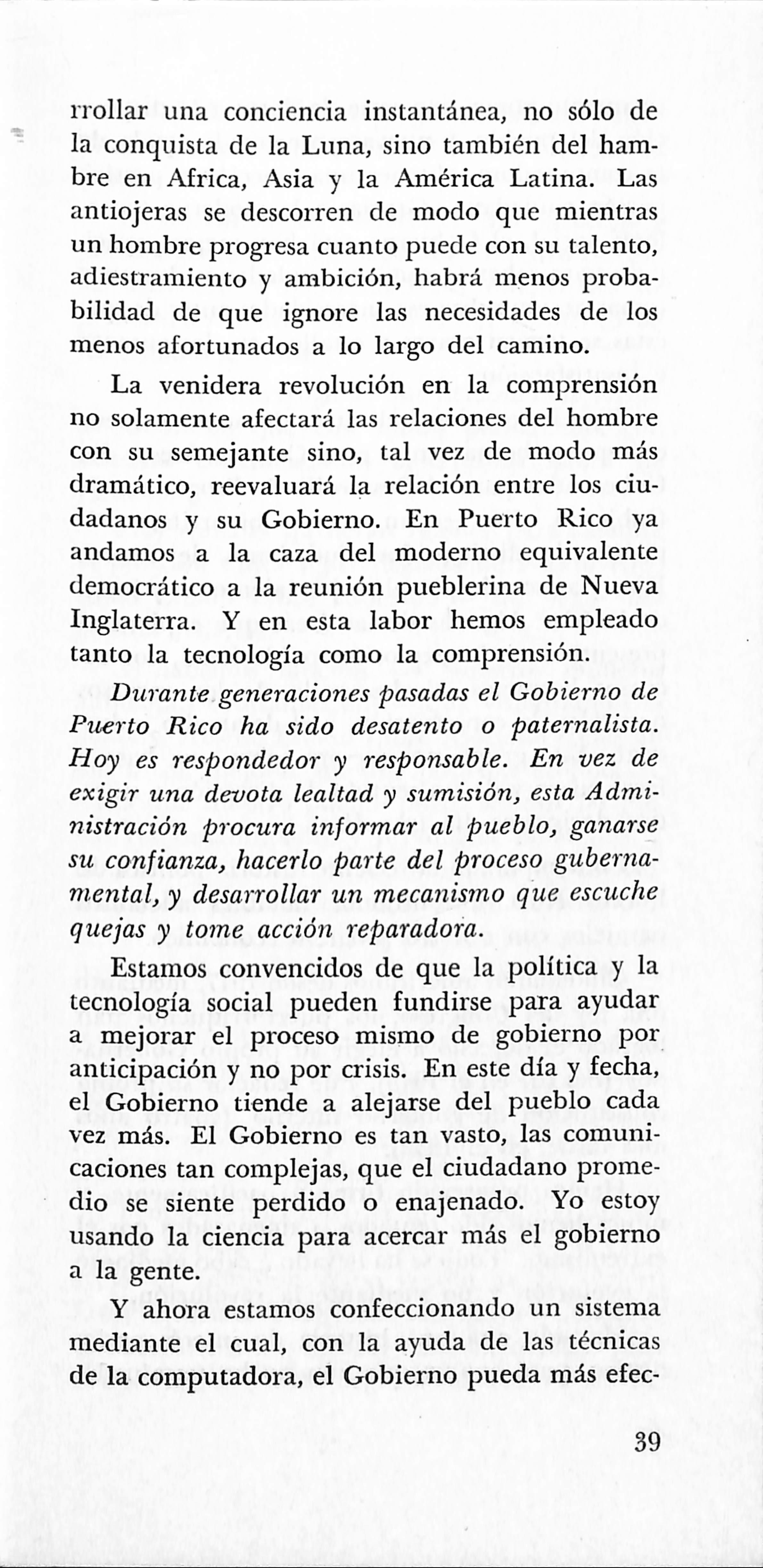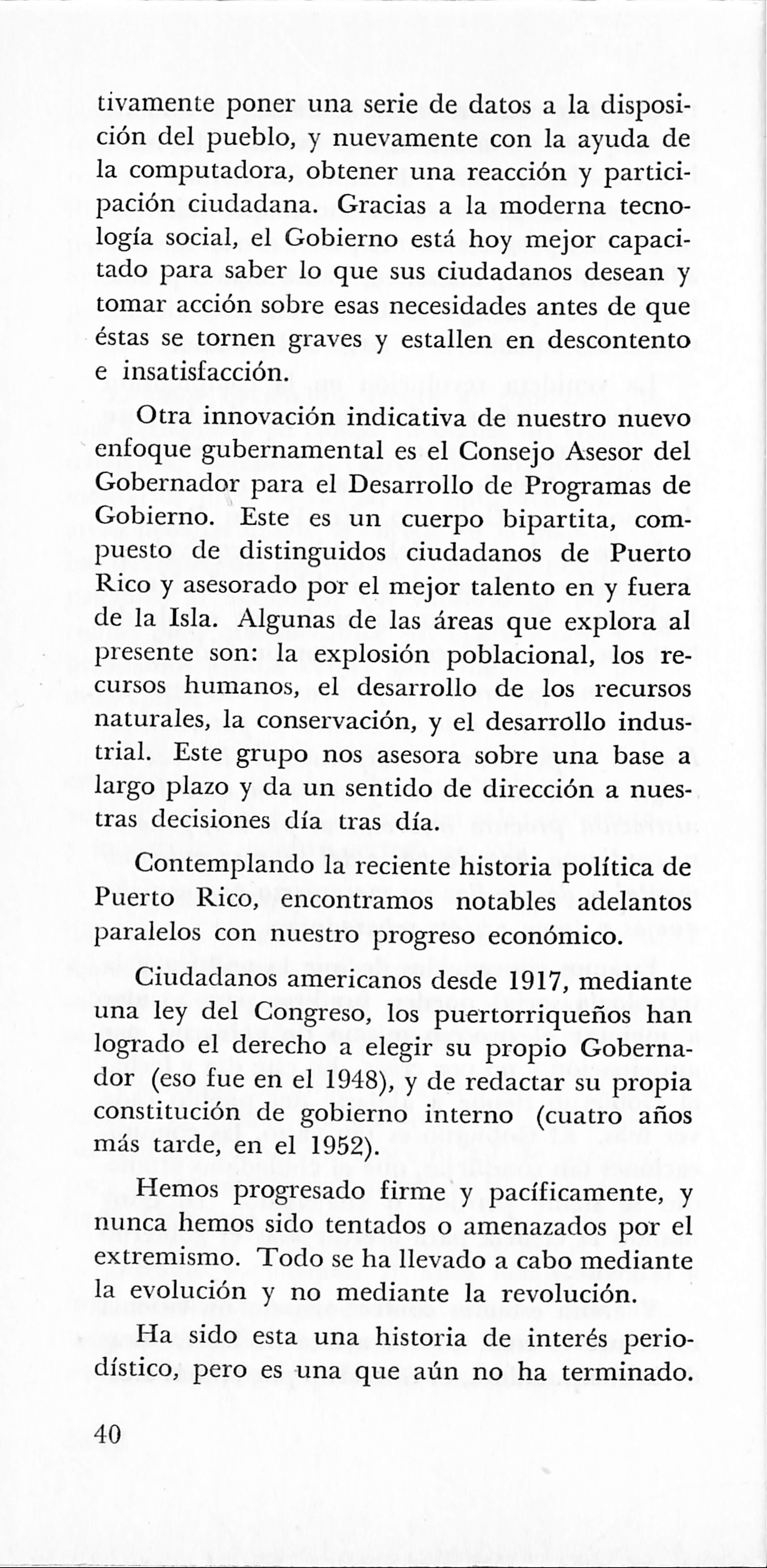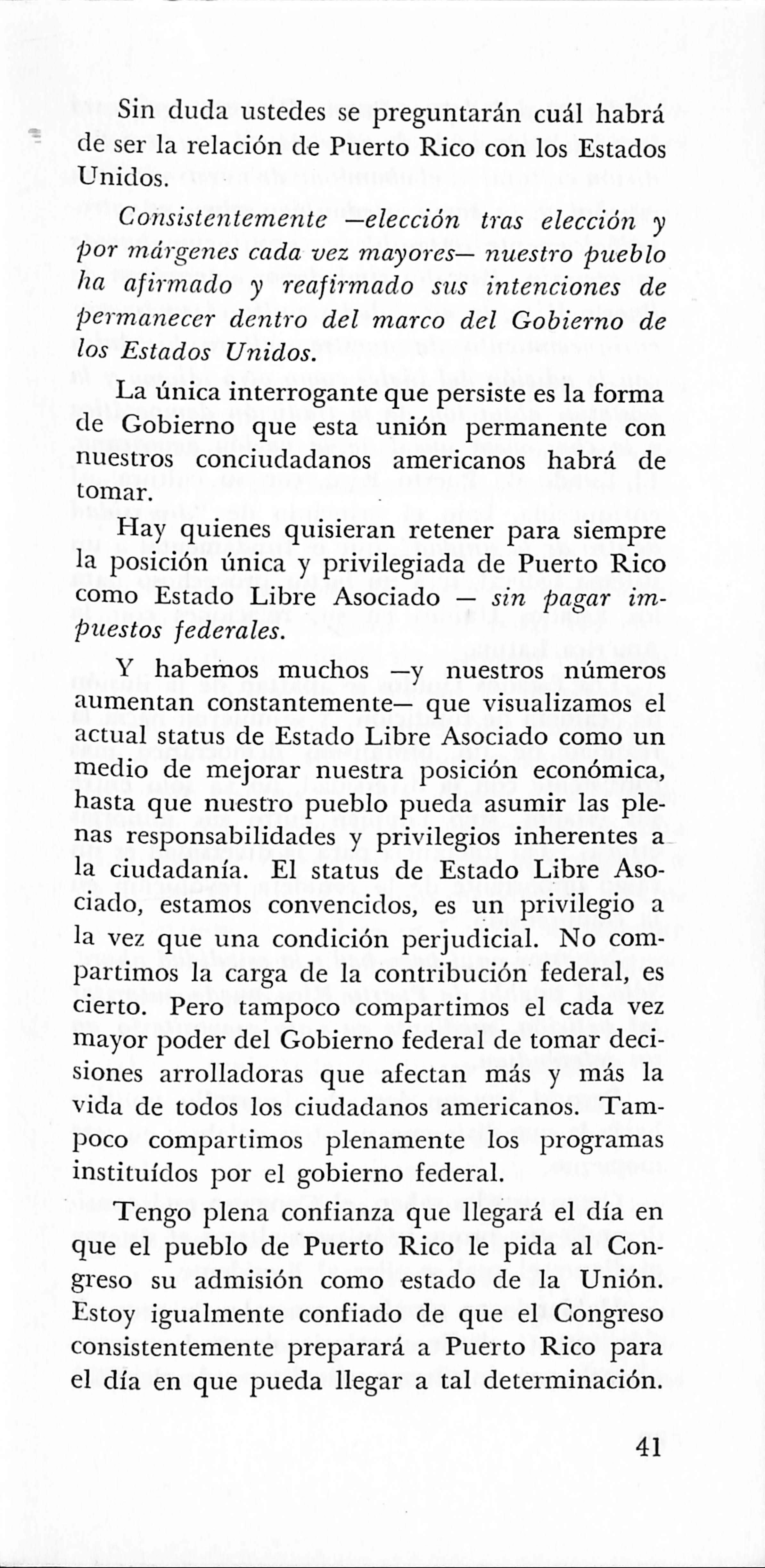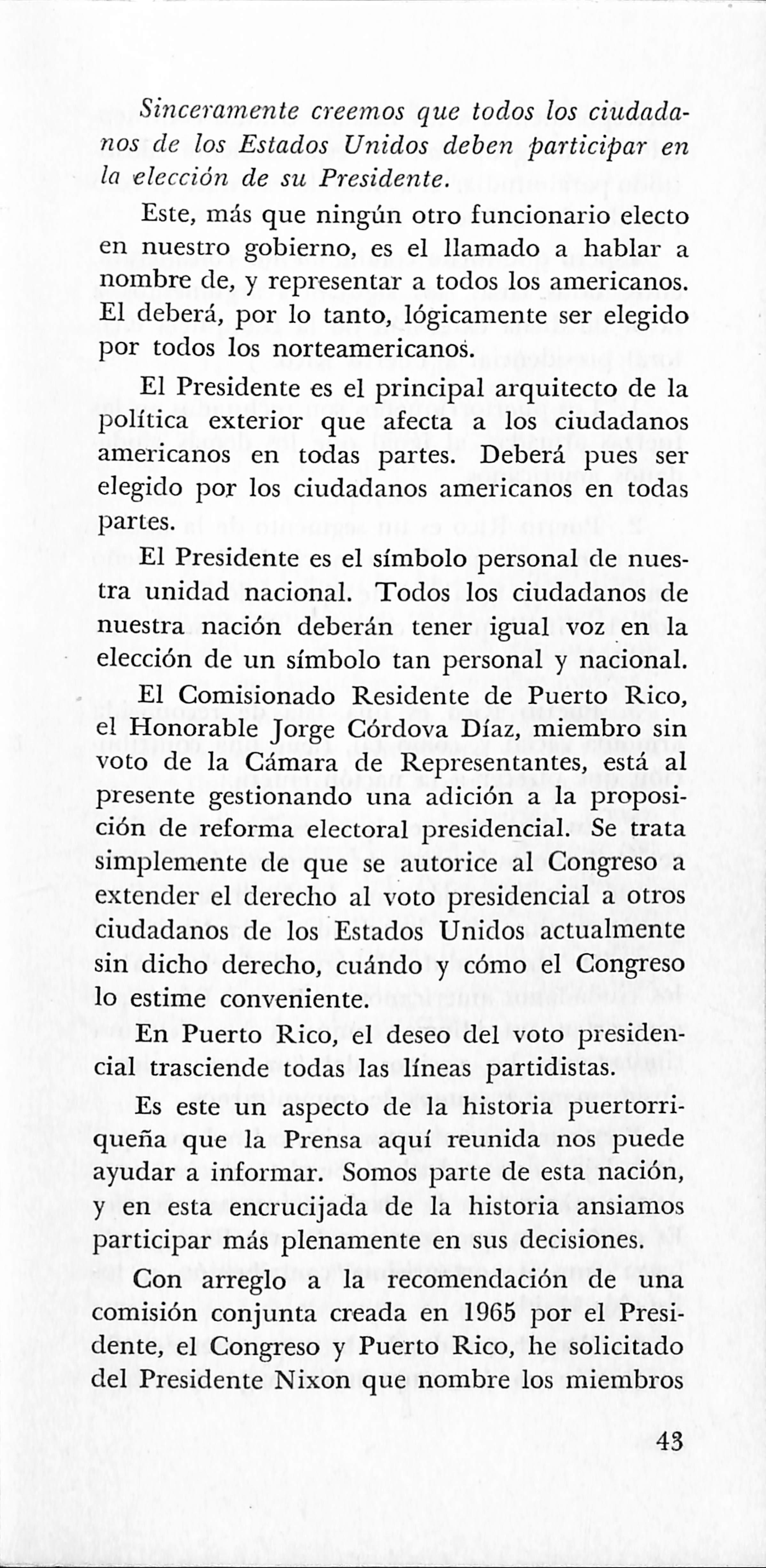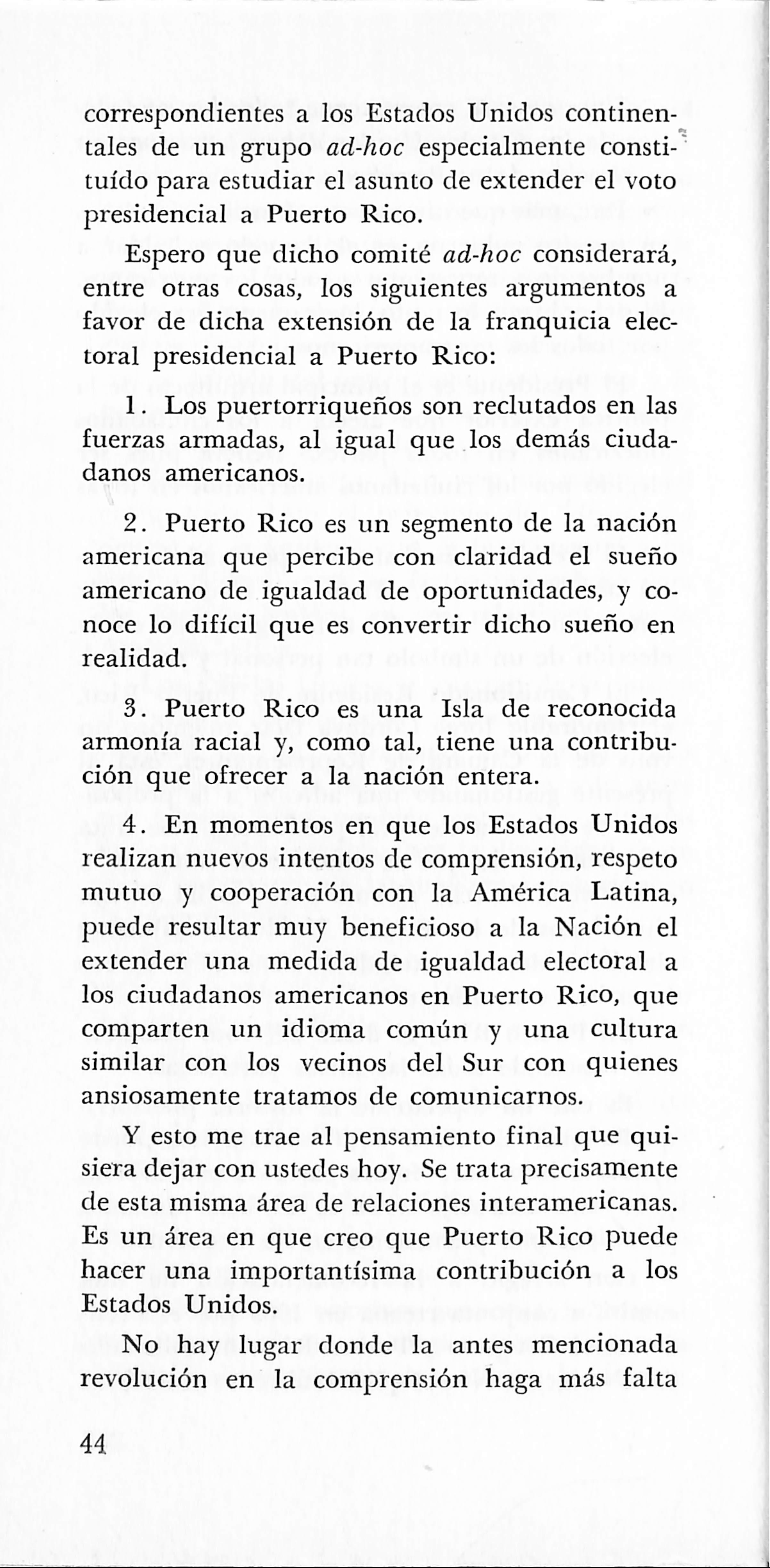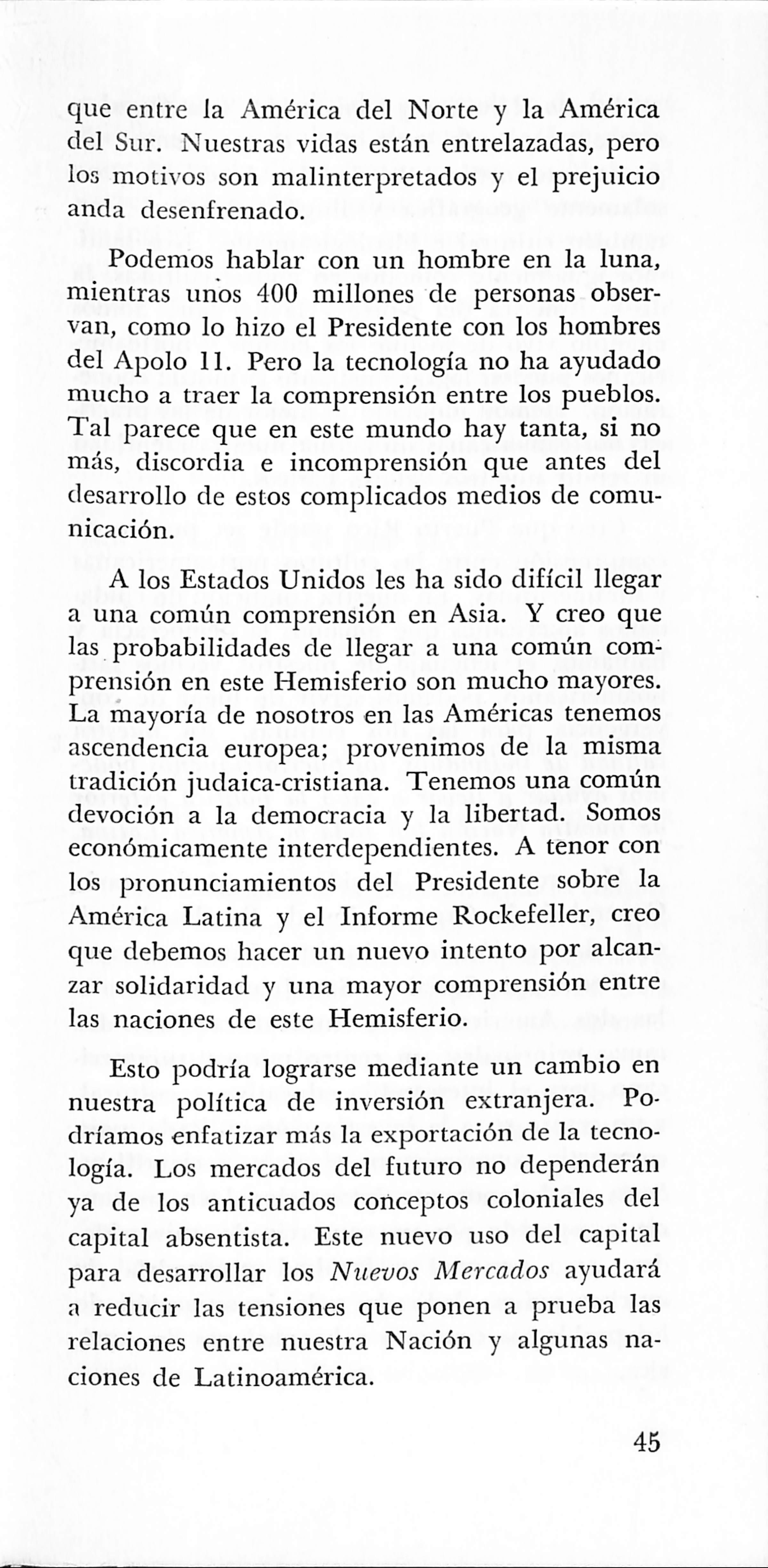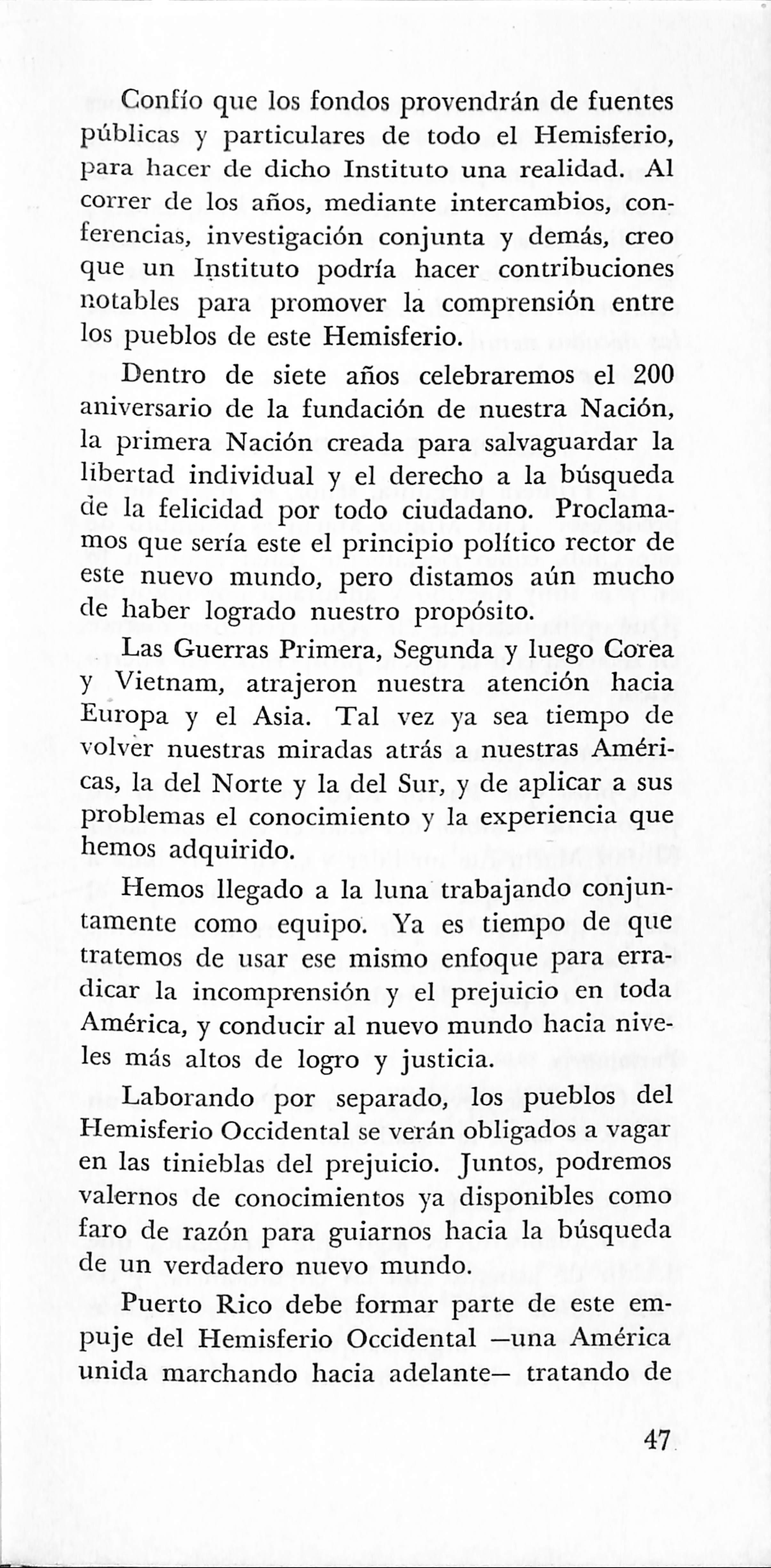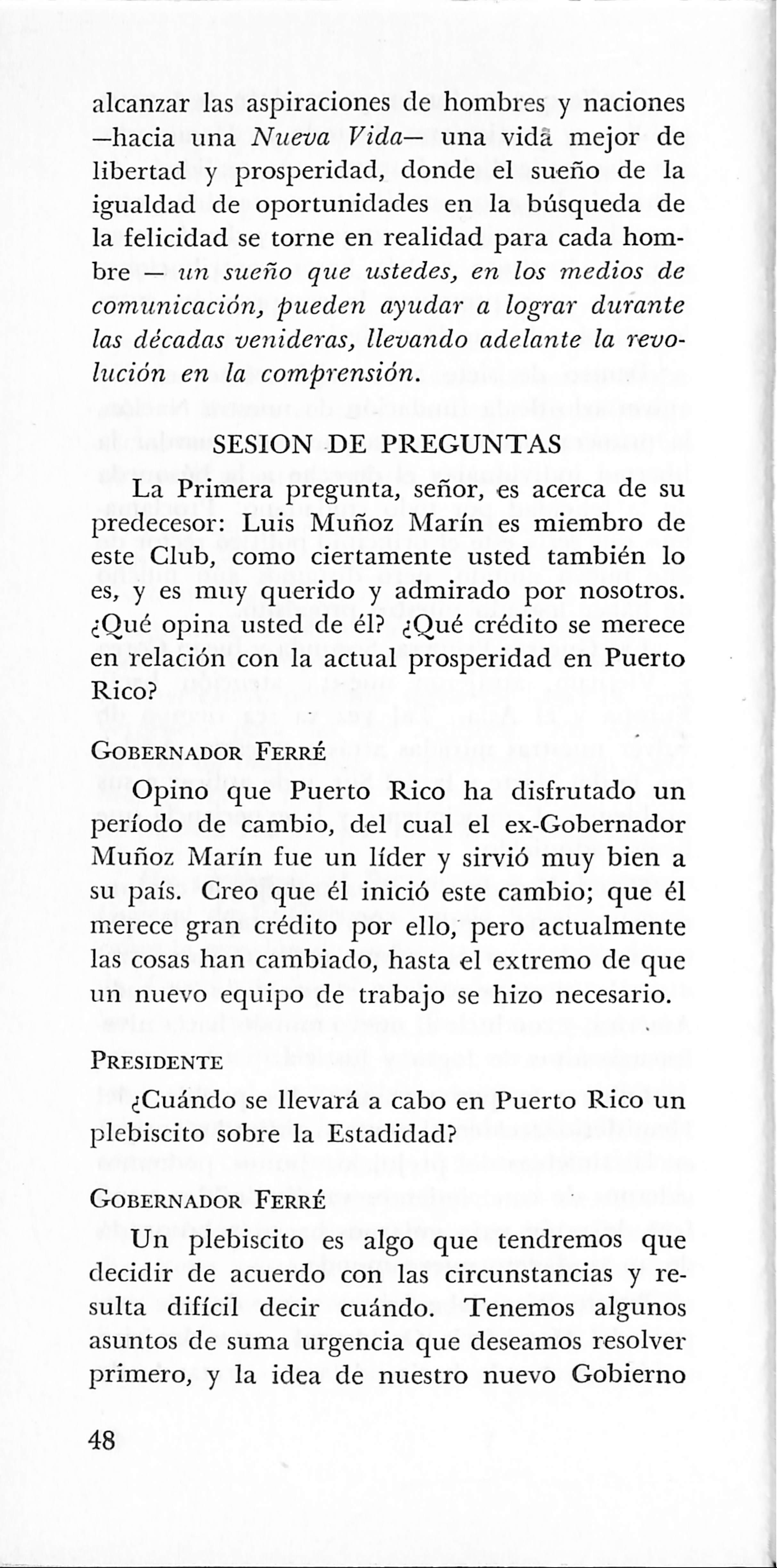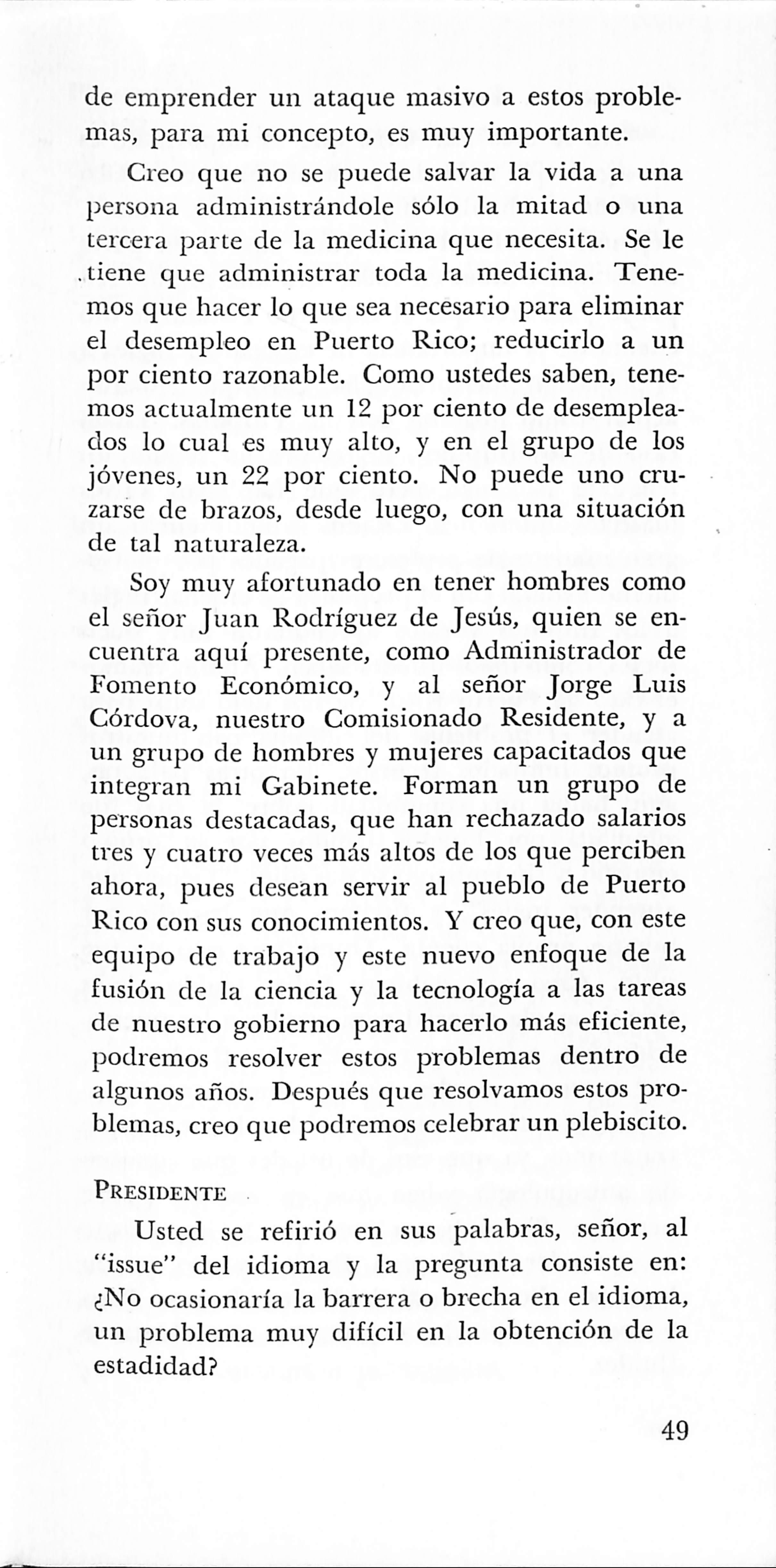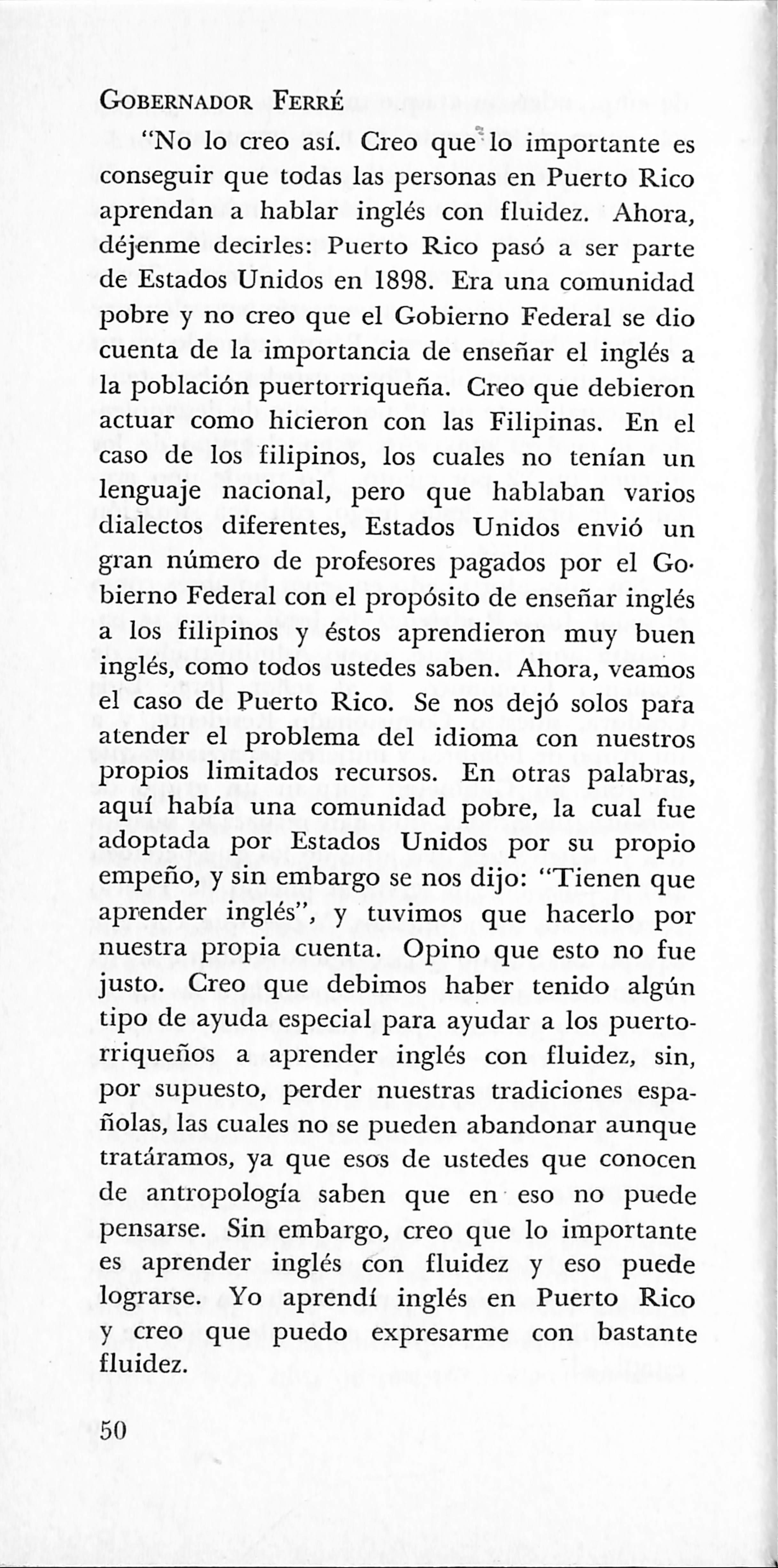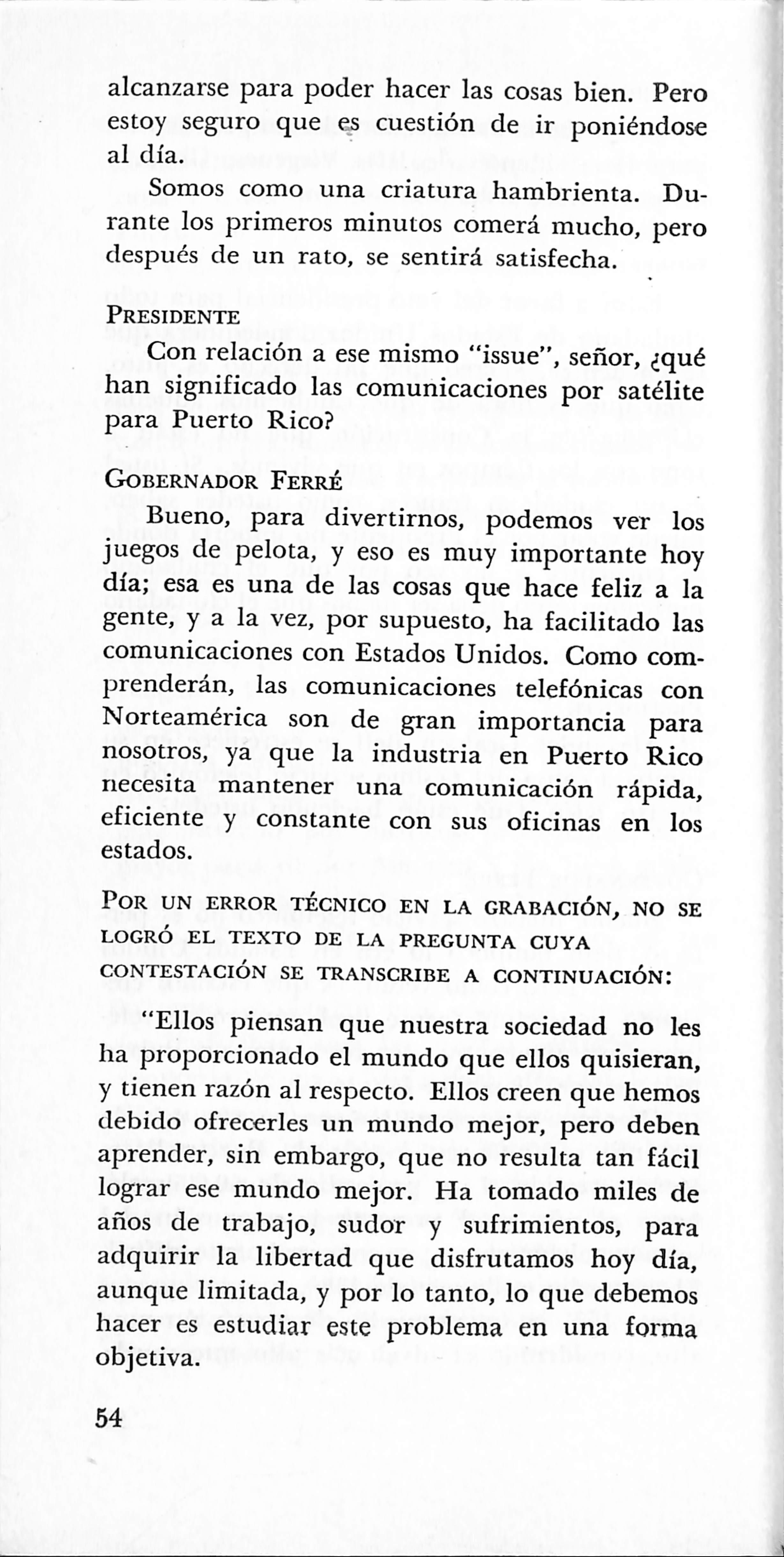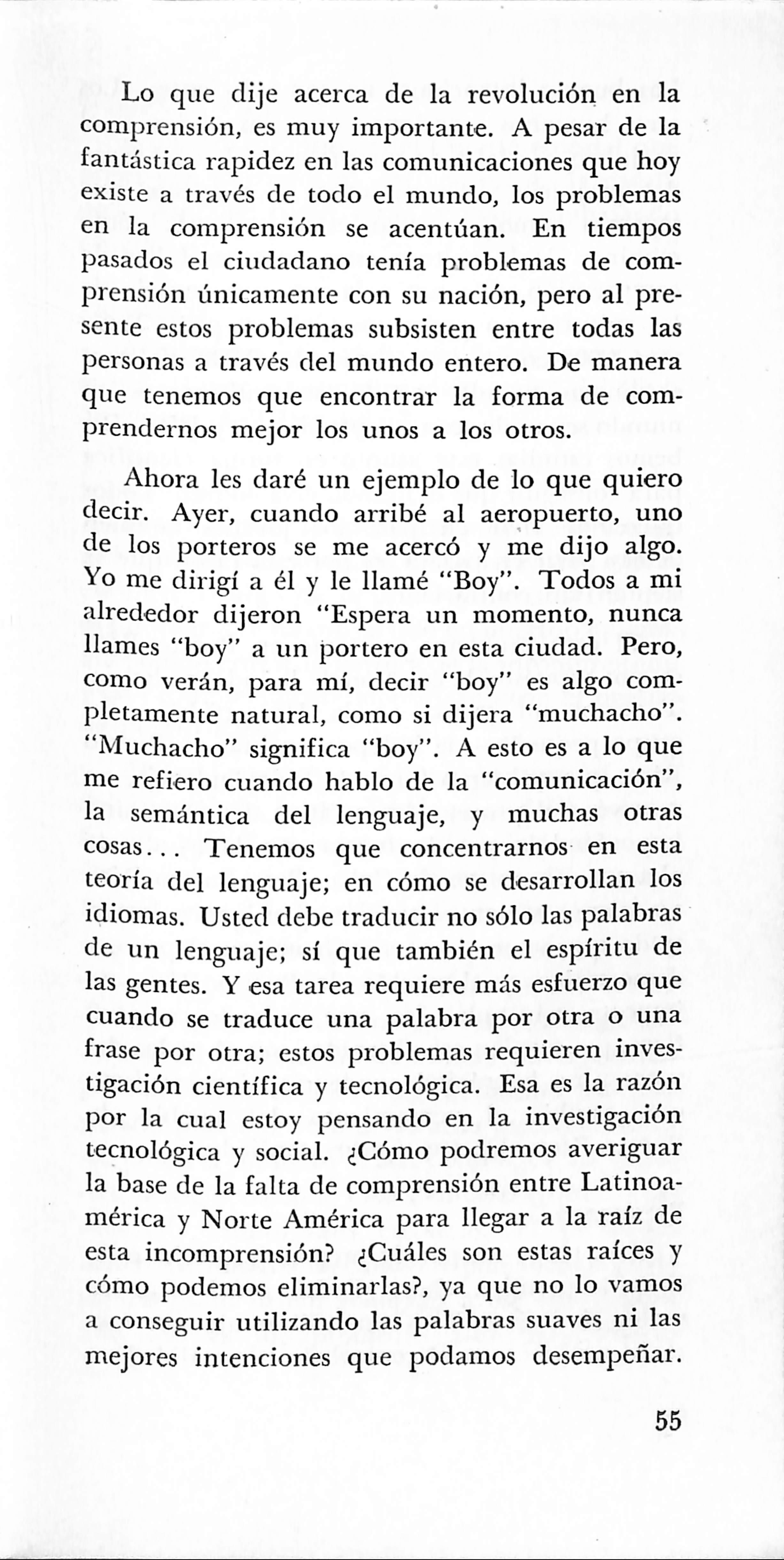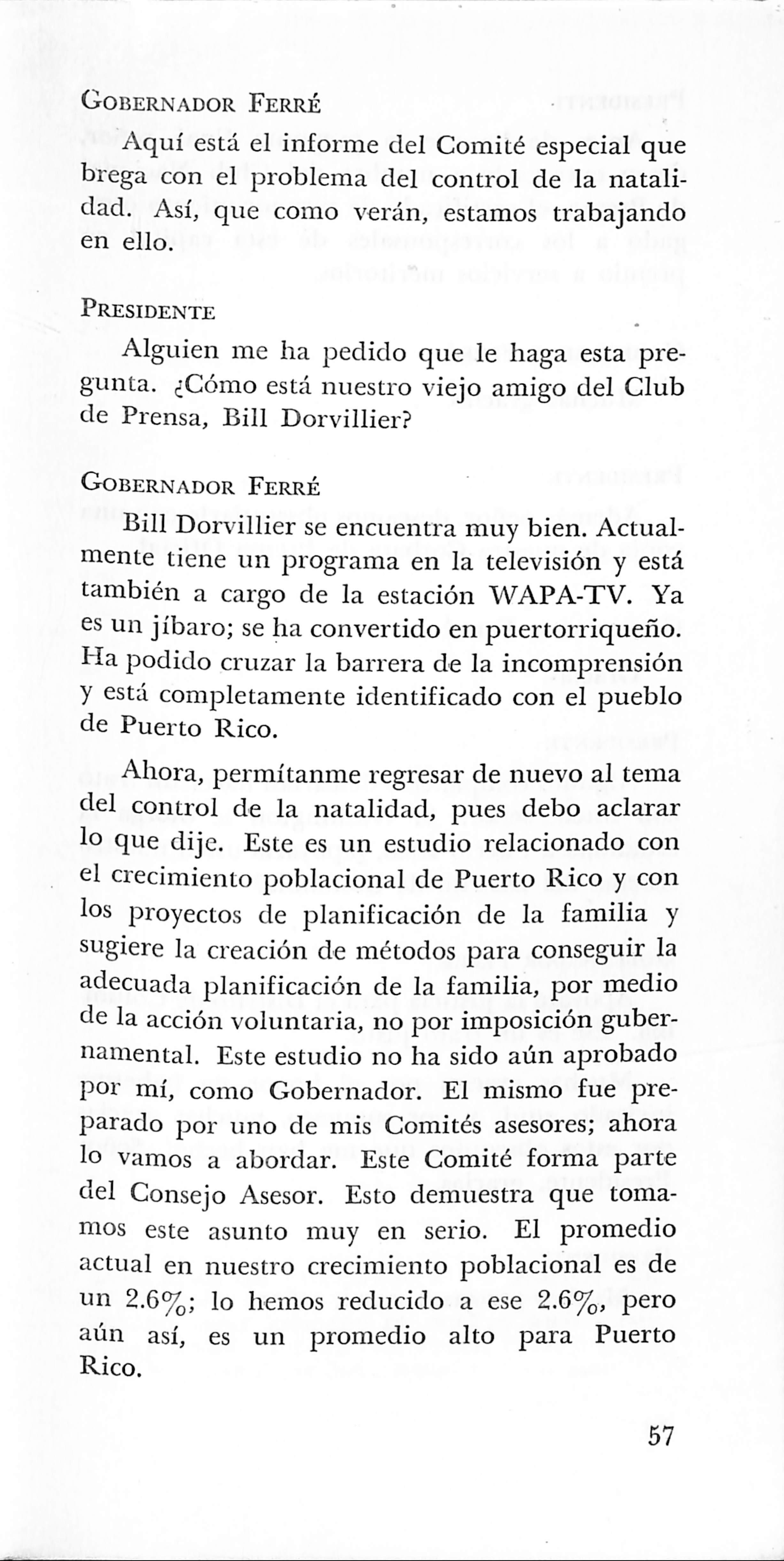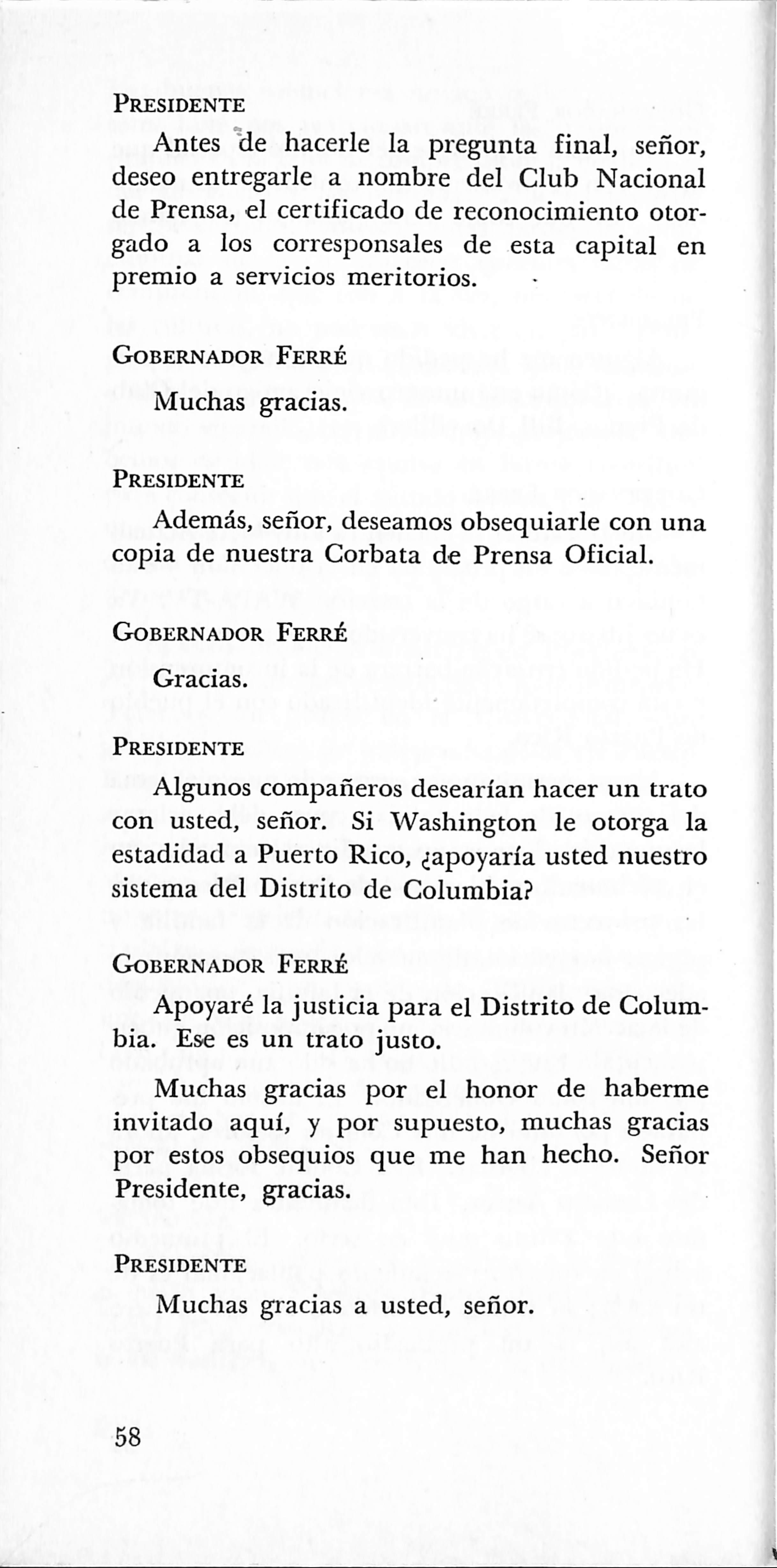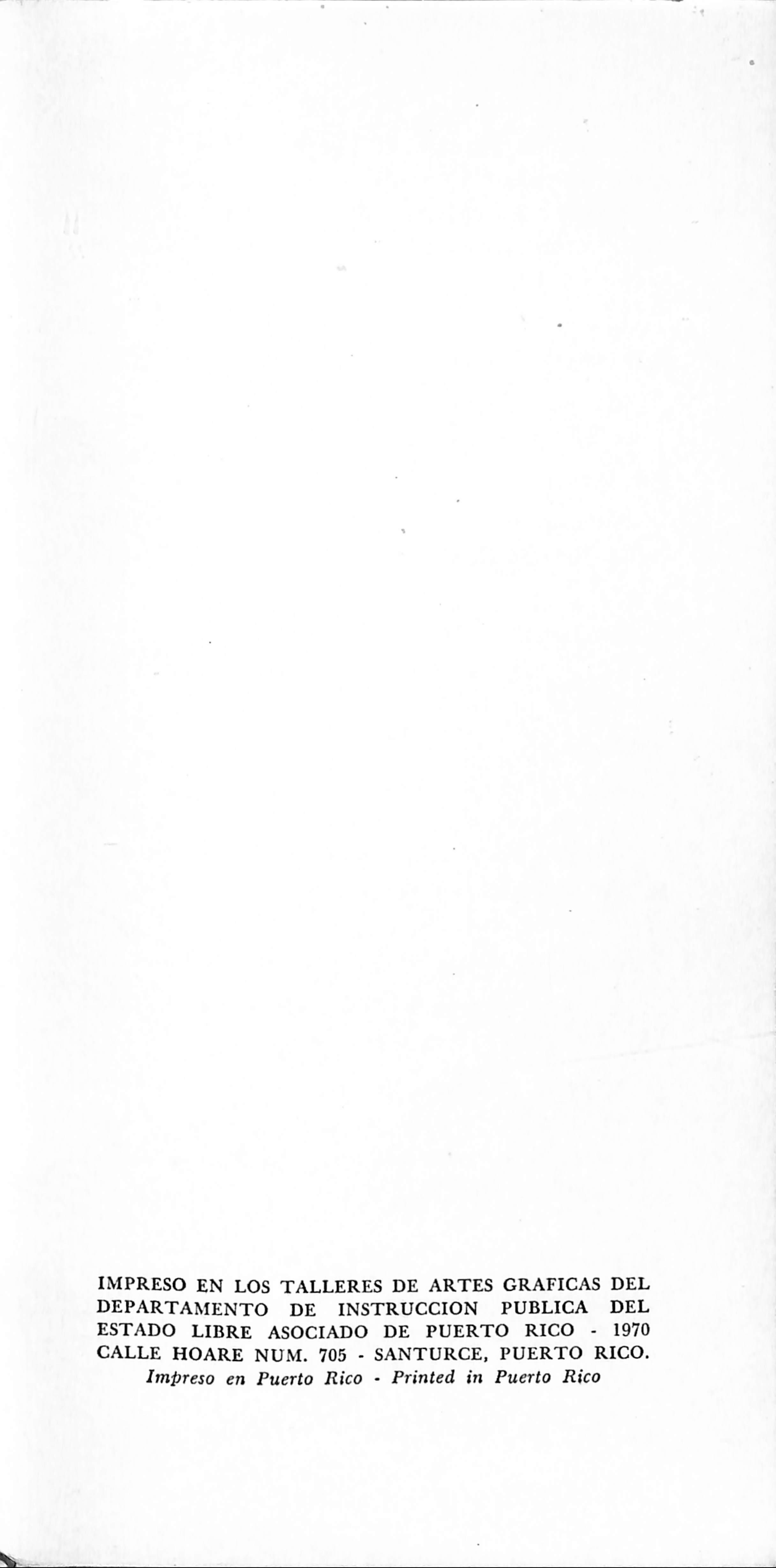LUIS
A. FERRE, AT THE NATIONAL PRESS CLUB IN WASHINGTON, D. C.
Chairman
We are honored to have on list a man who has brought about a new era in the development o£ Puerto Rico's political lífe. And it is gratifying to us too, that we can meet here as it were to celébrate the 476th anniversary of the landing on Puerto Rico by Cristopher Columbus in 1493.
Our guest Governor, Luis A. Ferré, a 64 year oíd industrialist, now leads the Commonwealth whích was automatically identified by the world outside from 1948 to 1968 with the unchallenged leadership of the Popular Democratic Party, and particularly, Governor Luis Muñoz Marín. After twenty-nine years, as Andrew T. Viglucci, editor of the San Juan Star, noted ín a Look magazine article earlier this year, the guard is changing in Puerto Rico and the electorate is coming of age. Wrote Mr. Viglucci: "there is sadness in seeing who goes in this party on the decline, but there is majesty on the Democratic process that brought it about.. . What made Luis Ferre's election as Governor last November such a historie event was the fact that he favors eventual statehood for the island. The Governor told U. S. News and World reporters on March of this year, "statehood is the ultímate achievement of all United States citizens. You can't be a full-
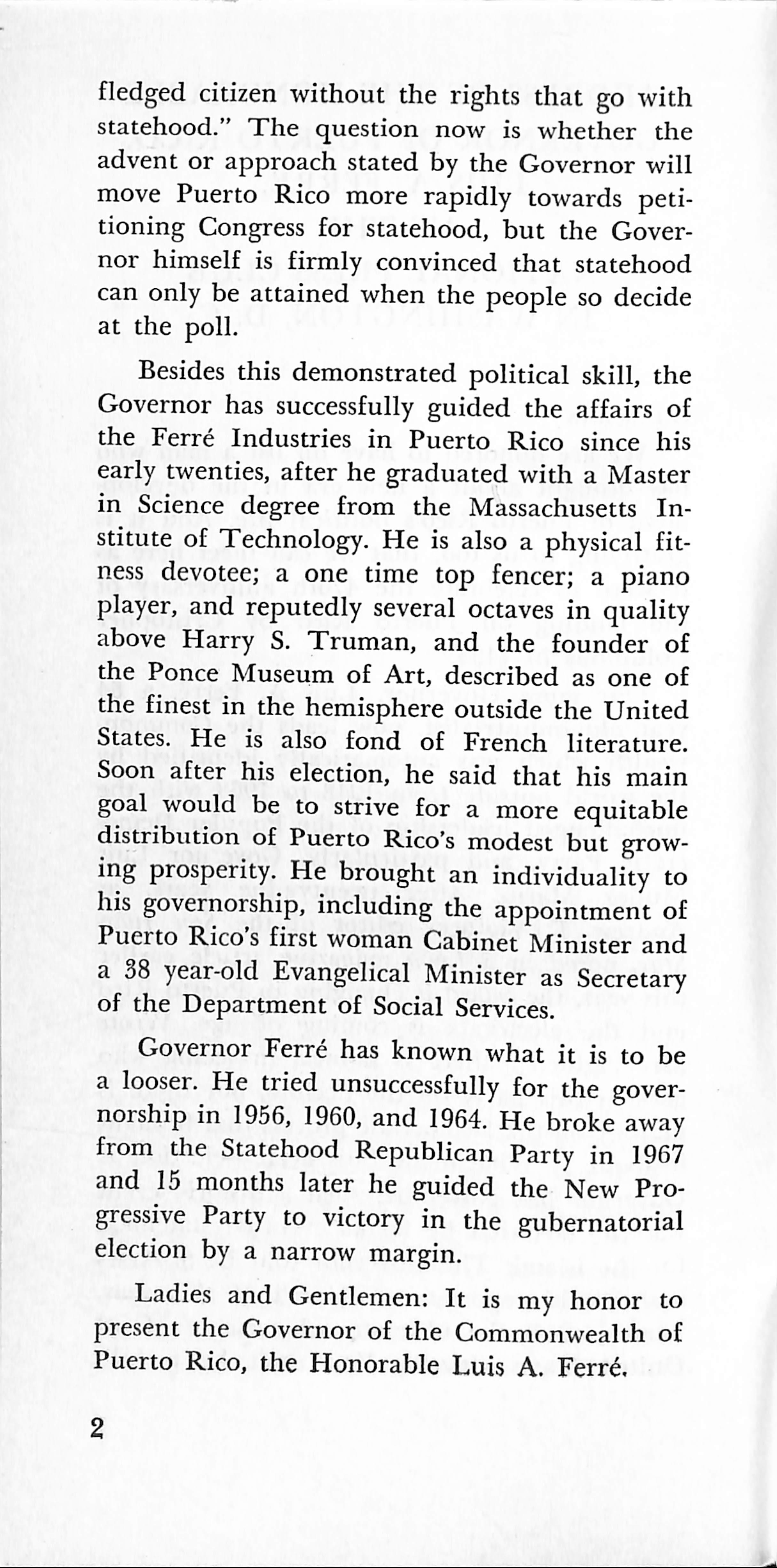
fledged citizen without the rights that go with statehood." The question now is whether the advent or approach stated by the Governor will move Puerto Rico more rapidly towards petitioning Congress for statehood, but the Gover nor himself is firmly convinced that statehood can only be attained when the people so decide at the poli.
Resides this demonstrated political skill, the Governor has successfully guided the affairs of the Ferré Industries in Puerto Rico since his early twenties, after he graduated with a Master in Science degree from the Massachusetts In stituto of Xechnology. He is also a physical fitness devotee; a one time top fencer; a piano player, and reputedly several octaves in quality above Harry S. Truman, and the founder of the Ponce Musetim of Art, described as one of the finest in the hemisphere outside the United States. He is also fond of French literature. Soon after his election, he said that his main goal would be to strive for a more equitable distribiition of Puerto Rico's modest but growing prosperity. He brought an individuality to his governorship, including the appointment of Puerto Rico s first woman Cabinet Minister and a 38 year-old Evangelical Minister as Secretary of the Department of Social Services.
Governor Ferré has known what it is to be a looser. He tried unsuccessfully for the gover norship in 1956, 1960, and 1964. He broke away from the Statehood Republican Party in 1967 and 15 months later he guided the New Progressive Party to victory in the gubernatorial election by a narrow margin.
Ladies and Gentlemen: It is my honor to present the Governor of the Commonwealth of Puerto Rico, the Honorable Luis A. Ferré.
Governor Ferré
Thank you/Mr. Chairman, thank you, honored guests, thank you, ladies and gentlemen. It is a pleasure indeed to be here amongst my colleagues, because I am a member o£ the Association and have been for many years —I don't know if any of you know it— but o£ course, I would like to say a £ew words about the govemorshíp o£ Puerto Rico be£ore I start reading my remarks.
I did work pretty hard to get there, and I am sure that I was as much surprised as my good £riends Ben Ste£ansky and Jim Rowe, who were my colleagues in the Status Commission, when I won the election, but, one o£ the things that happened was that when I got to Fortaleza and the next day a£ter my swearing in, my little grandaughter came. I had been working hard around three times and got de£eated, and £inally had to do more than President Nixon did, in order to get to the governorship. I won, so, I had my grandaughter come over to visit me at La Fortaleza and then she came over and said: "I don't like it here, let's go back home." It was kind o£ disappointing, but a£ter that, she has enjoyed it a little more.
As £ar as my job with Puerto Rico is con cerned; what the Puerto Ricans are, I would like to tell you a story that I think is good to know about Puerto Ricans, and it goes around like this: A £ellow died, and wanted to go to Paradise, so, he knocked at the door o£ Paradise and Saint Peter opened up the door and said: "What do you want?" I'd like to see how I like this place and maybe I would stay here." So, Saint Peter said: "All right, walk in" and took him around; showed him the beauti£ul streets, the wonder£ul buildings and the magni£icent
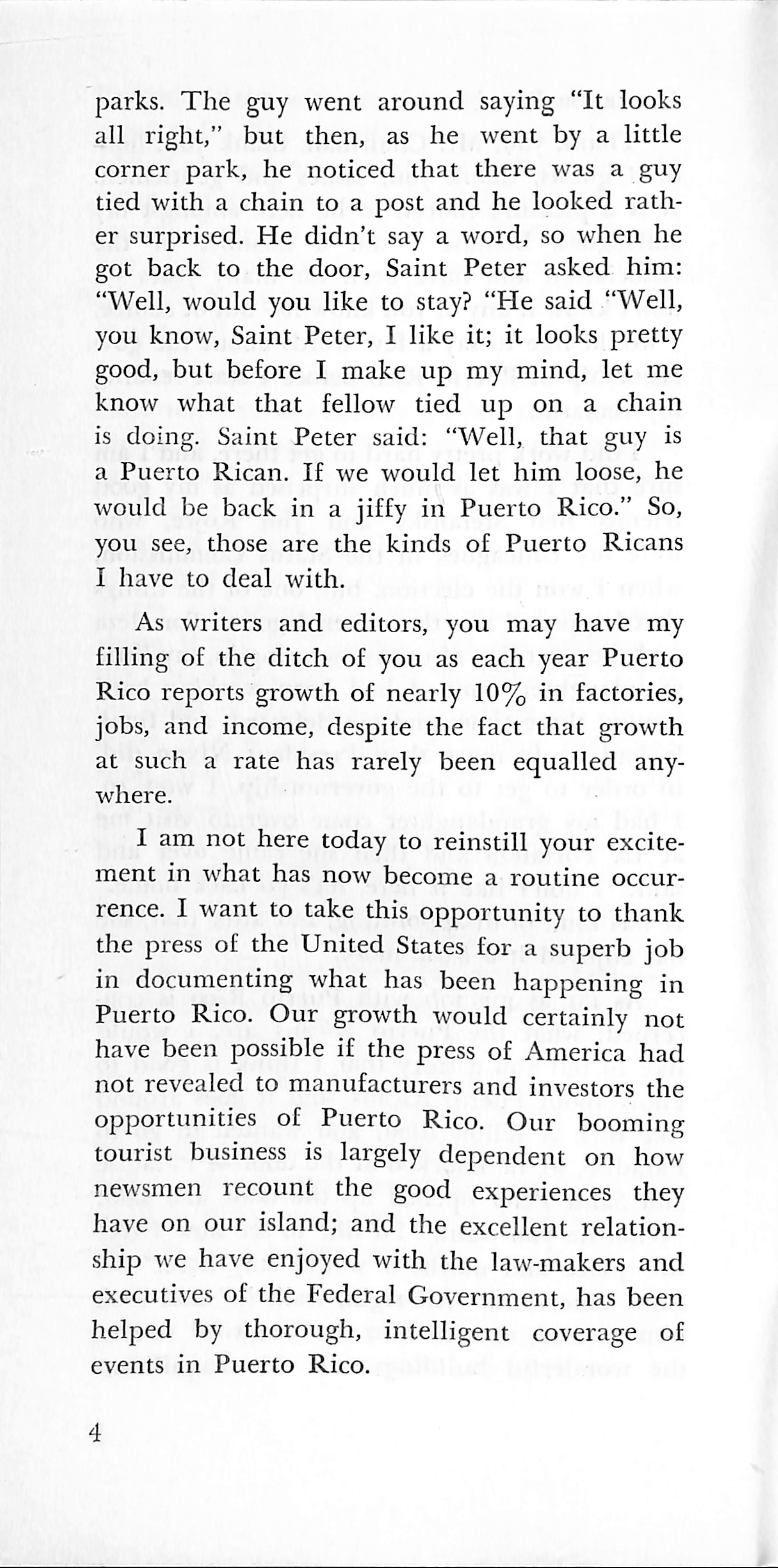
parks. The guy went around saying "It looks all right," but then, as he went by a little córner park, he noticed that there was a guy tied with a chain to a post and he looked rather surprised. He didn't say a word, so when he got back to the door, Saint Peter asked him: "Well, would you like to stay? "He said "Well, yon know, Saint Peter, I like it; it looks pretty good, but before I make up my mind, let me know what that fellow tied up on a chain is doing. Saint Peter said: "Well, that guy is a Puerto Rican. If we would let him loose, he would be back in a jiffy in Puerto Rico." So, you see, those are the kinds o£ Puerto Ricans I have to deal with.
As writers and editors, you may have my filling o£ the ditch o£ you as each year Puerto Rico reports growth o£ nearly 10% in £actories, jobs, and income, despite the £act that growth at such a rate has rarely been equalled anywhere.
I am not here today to reinstill your excitement in what has now become a routine occurrence. I want to take this opportunity to thank the press o£ the United States £or a superb job in documenting what has been happening in Puerto Rico. Our growth would certainly not have been possible i£ the press o£ América had not revealed to manu£acturers and investors the opportunities o£ Puerto Rico. Our booming tourist business is largely dependent on how newsmen recount the good experiences they have on our island; and the excellent relationship we have enjoyed with the law-makers and executives o£ the Federal Government, has been helped by thorough, intelligent coverage o£ events in Puerto Rico.
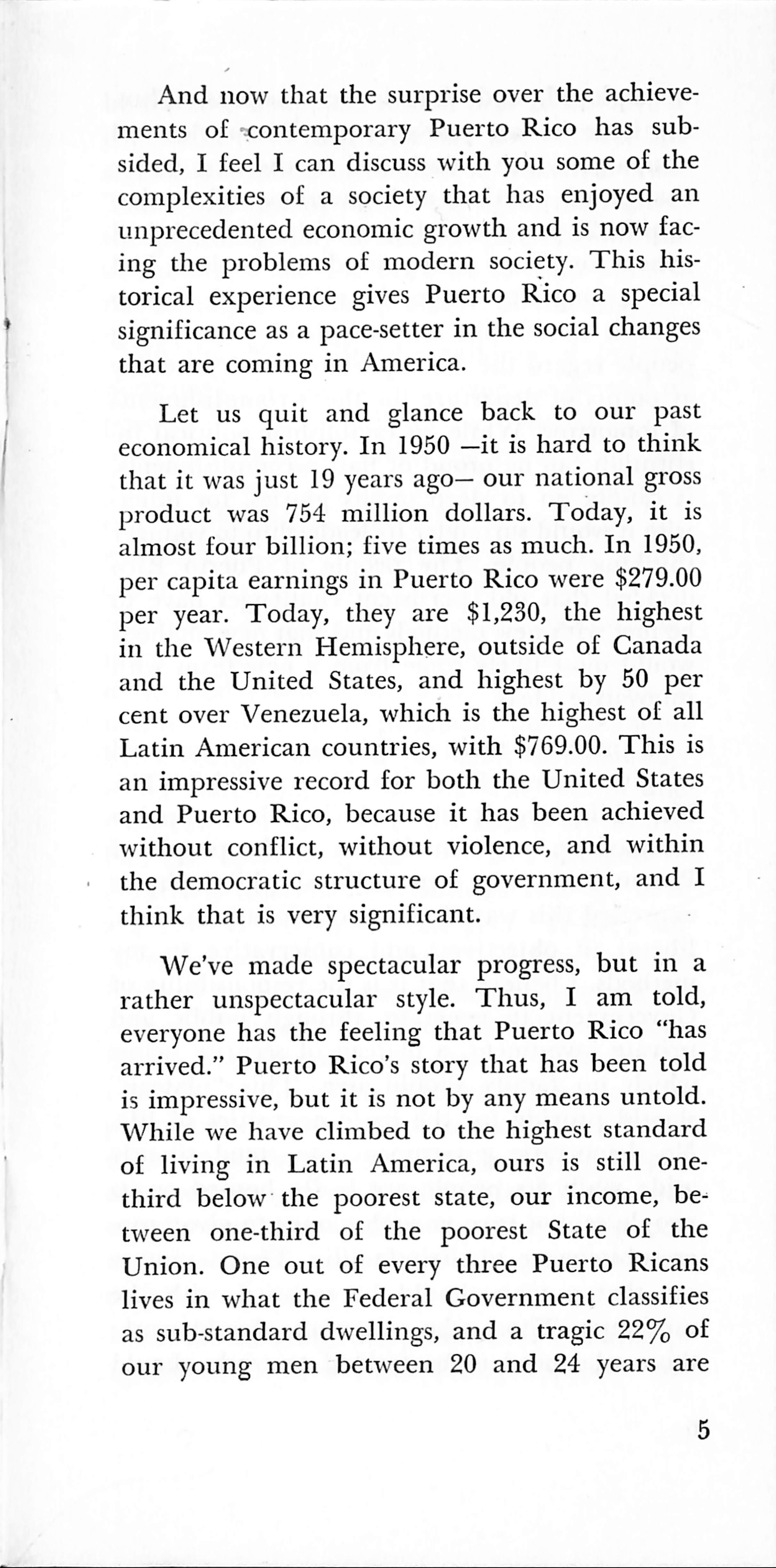
And now that the surprise over the achievements o£ -contemporary Puerto Rico has subsided, I feel I can discuss with yon some of the complexities of a society that has enjoyed an unprecedented economic growth and is now facing tire problems of modern society. This historical experience gives Puerto Rico a special significance as a pace-setter in the social changes that are coming in América.
Let US quit and glance back to our past economical history. In 1950 —it is hard to think that it was just 19 years ago— our national gross product was 754 million dollars. Today, it is almost four billion; five times as much. In 1950, per capita earnings in Puerto Rico were $279.00 per year. Today, they are $1,230, the highest in the Western Hemisphere, outside of Cañada and the United States, and highest by 50 per cent over Venezuela, which is the highest of all Latin American countries, with $769.00. This is an impressive record for both the United States and Puerto Rico, because it has been achieved without conflict, without violence, and within the democratic structure of government, and I think that is very significant.
We've made spectacular progress, but in a rather unspectacular style. Thus, I am told, everyone has the feeling that Puerto Rico "has arrived." Puerto Rico's story that has been told is impressive, but it is not by any means untold. While we have climbed to the highest standard of living in Latin América, ours is still onethird below the poorest state, our income, be-^ tween one-third of the poorest State of the Unión. One out of every three Puerto Ricans lives in what the Federal Government classifies as sub-standard dwellings, and a tragic 22% of our young men between 20 and 24 years are
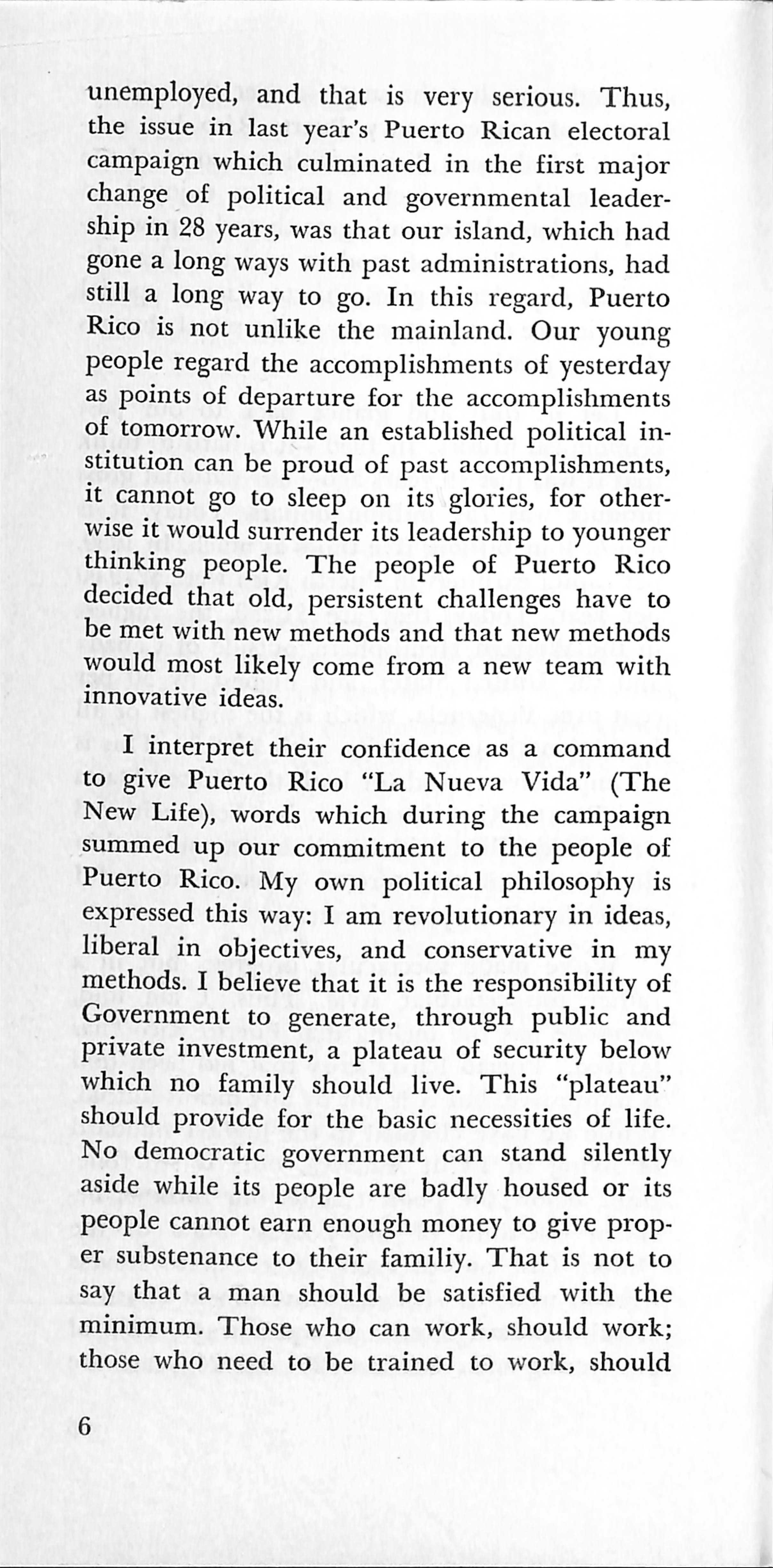
unemployed, and that is very serious. Thus, the issue in last year's Puerto Rican electoral campaign which culminated in the first major change o£ politícal and governmental leadership in 28 years, was that our island, which had gone a long ways with past administrations, had still a long way to go. In this regard. Puerto Rico is not unlike the mainland. Our young people regard the accomplishments of yesterday as points of departure for the accomplishments of tomorrow. While an established political institution can be proud of past accomplishments, it cannot go to sleep on its glories, for otherwise it would surrender its leadership to younger thinking people. The people of Puerto Rico decided that oíd, persistent challenges have to be met with new methods and that new methods would most likely come from a new team with innovative ideas.
I interpret their confidence as a command to give Puerto Rico "La Nueva Vida" (The New Life), words which during the campaign summed up our commitment to the people of Puerto Rico. My own political philosophy is expressed this way: I am revolutionary in ideas, liberal in objectives, and conservative in my methods. I helieve that it is the responsibility of Government to generate, through public and private investment, a platean of security below which no family should live. This "plateau" should provide for the basic necessities of life. No democratic government can stand silently aside while its people are badly housed or its people cannot earn enough money to give proper substenance to their familiy. That is not to say that a man should be satisfied with the minimum. Those who can work, should work; those who need to be trained to work, should
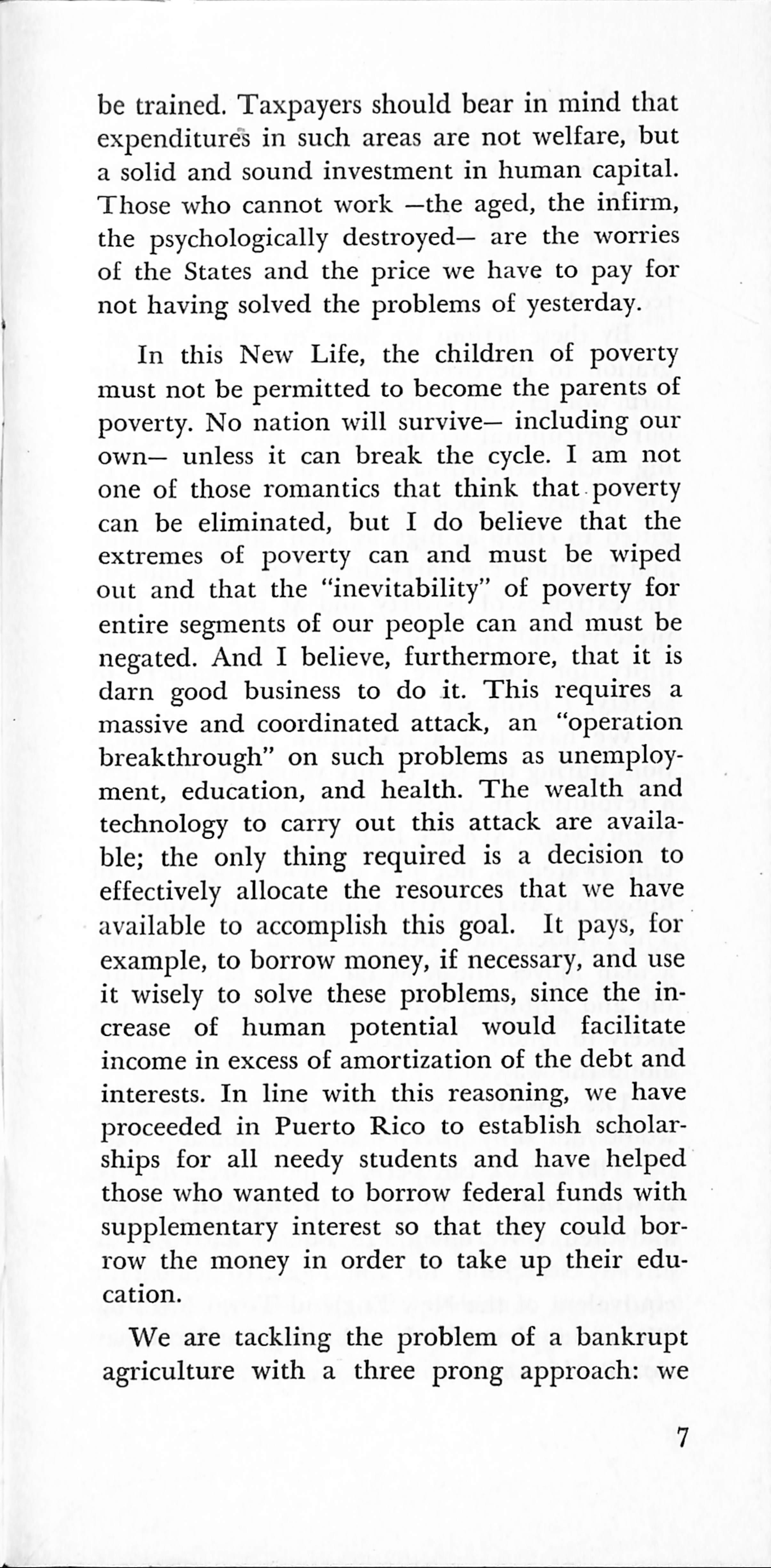
be trained. Taxpayers should bear in mind that expenditurés in such arcas are not welfare, but a solid and sound investment in human capital. Those who cannot work —the aged, the infirm, the psychologically destroyed— are the worries of the States and the price we have to pay for not having solved the problems of yesterday.
In this New Life, the children of poverty must not be permitted to become the parents of poverty. No nation will survive— including our own— unless it can break the cycle. I am not one of those romantics that think that poverty can be eliminated, but I do believe that the extremes of poverty can and must be wiped out and that the "inevitability" of poverty for entire segments of our people can and must be negated. And I believe, furthermore, that it is darn good business to do it. This requires a massive and coordinated attack, an "operation breakthrough" on such problems as unemployment, education, and health. The wealth and technology to carry out this attack are available; the only thing required is a decisión to effectively allocate the resources that we have available to accomplish this goal. It pays, for example, to borrow money, if necessary, and use it wisely to solve these problems, since the increase of human potential would facilítate income in excess of amortization of the debt and interests. In line with this reasoning, we have proceeded in Puerto Rico to establish scholarships for all needy students and have helped those who wanted to borrow federal funds with supplementary interest so that they could bor row the money in order to take up their edu cation.
We are tackling the problem of a bankrupt agriculture with a three prong approach: we
pay the farmhand —and this is rather revolutionary— a supplementary wage to discourage migration into the urban areas where he gets caught-up in the problems o£ slums, unemployment and delínquency; we pay the faraier a 50% subsidy to mechanize and we give him technical aid to improve his productivity. By these actions we hope to reduce the mi gration to the overcrowded cities, provide the farm-worker with a decent wage, and modernize our agricultural section. And, while we are taking such extraordinary measures on behalf o£ the by-pass o£ society, we must also assist the gi£ted to climb as high as their talent, training and ambition can carry them. Can we eliminate the extremes o£ poverty and at the same time preserve and enhance a system o£ upward mobility £or the more productive members o£ society? I think we can.
We have had a revolution in communications during the last twenty years; we need now a revolution in understanding during the next twenty years. We are beginning to develop instant awareness, not just o£ moon rocks but o£ hunger in Asia, in A£rica, and in Latin América. The blinders have been removed so that while a man moves ahead as £ar as his talent, train ing and ambition will take him, he will be less likely to ignore the needs o£ the less £ortunate along the way.
The coming revolution in understanding would not only a££ect man's relationship with his £ellow man, but perhaps more dramatically, it will revise the relationship between citizens and their Government. In Puerto Rico we are already searching £or the modern democratic equivalent o£ the New England Town Meeting. We are applying both technology and compassion to this task.
For the past generations, Government in Puerto Rico" was paternalistic. Today, it is responsive and responsible.
This administration seeks to inform the people, gain their confidence, involve them in the governmental process and develop a mechanism to hear complaints and take remedial action. We feel that politics and social technology can be welded together to help improving the very process o£ Government. We rvant a government by anticipation, not by crisis. In this day and age, there is a tendency from gov ernment to drift further and further from the people. Government is so vast, communications so complicated, that the average citizens feel lost or alienated. I am using science to bring government closer to the people. And we are now working on a system by which with the aid of computer techniques, Government may best make a set of facts available to the people and, again with the aid of computer techniques, obtain a feedback of citizen comment and reaction. Thanks to modern social technology, Gov ernment is better able to know what its citizens want and to act on such needs before they become acute and irrupt into discontent and dissatisfaction. This will make my Government a government of action, not of reaction.
Another innovation indicativo of our new approach to Government is the Governor's Advisory Gouncil for the Development of Govern ment Programs. This is a bipartisan body made up of leading citizens of Puerto Rico and advised by the best talent both of Puerto Rico and of the mainland. The Gouncil explores for my government the crucial problems facing the island. Some of the areas it is now exploring are: unemployment, population explosión, human
resources, development of natural resources, conservation, and so on. This group keeps us advised on a long-range basis and gives us a sense of direction in the day-to-day decisjons. Looking at Puerto Rico's recent political history, there have been notable advances paralleling our economic progress.
We have been American citizens by an Act of Congress since 1917. We have secured the right to elect our own Govemor and to draft our own Constitution. We have made steady, peaceful progress and have never been tempted or threatened by extremism. It has all come about through evolution, not revolution, but it ís a story that is not finíshed.
You are now all wondering what will come to be Puerto Rico's future relationship with the United States. Our people have consistently, election after election, and by an ever-increasing margin, affirmed and re-affirmed their intentions to remain within the framework of the United States Government.
The only question pending is the form of government which this permanent unión with our fellow American citizens will take. There are those who would like to retain forever Puerto Rico's unique and privileged position as a Commonwealth, not paying Federal taxes. And there are those of us —and our numbers steadily increase— who visualizo the present Commonwealth status as a means to improve our economic position, until the people can assume the full responsibilities and privileges inherent to citizenship. Commonwealth status —we are convinced— is both priviledged and prejudicial. We do not share the full burden of Federal taxation —it is true— that much is true. But neither do we share in the ever in-
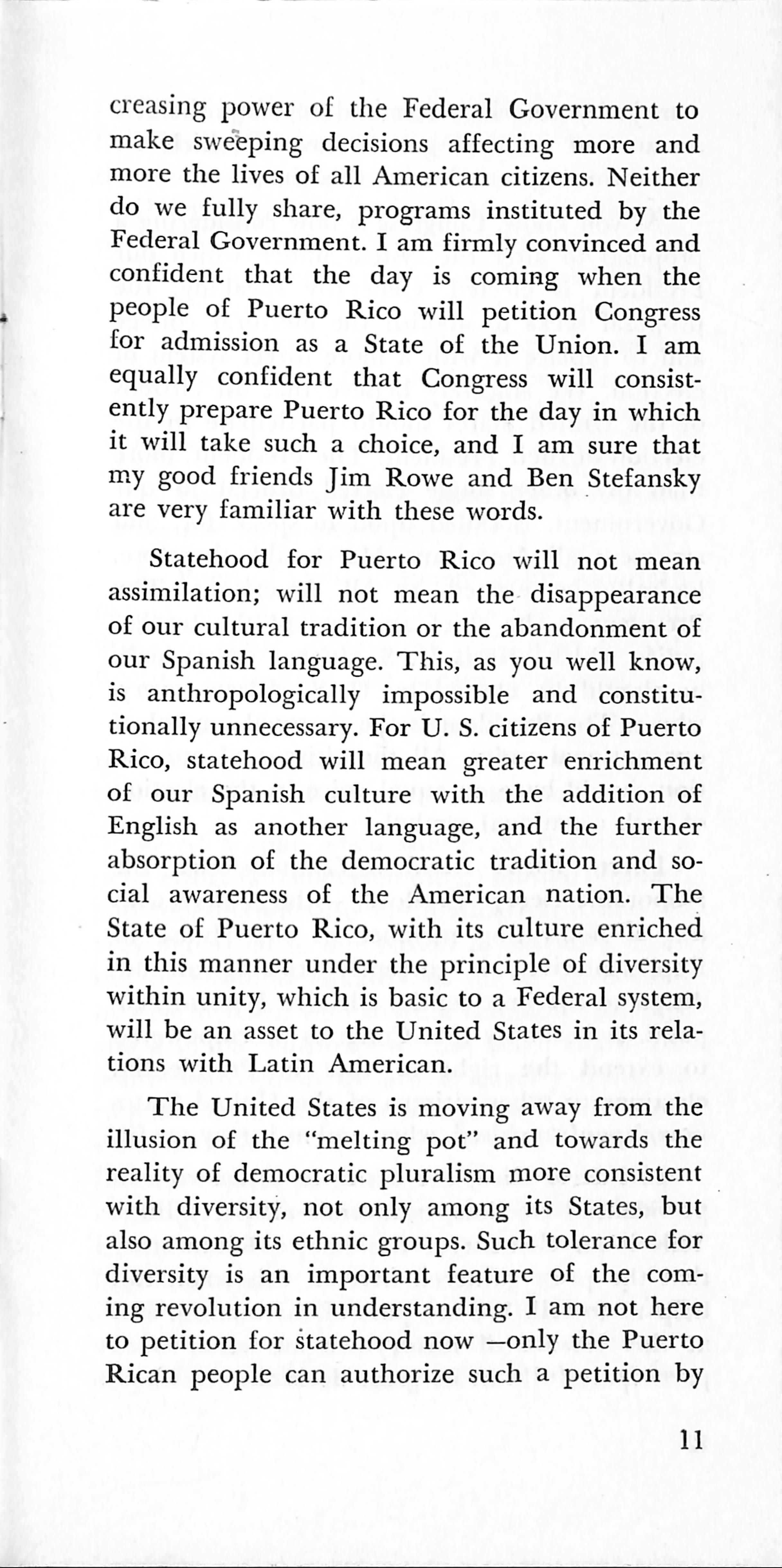
creasing power of the Federal Government to make swééping decisions affecting more and more the lives of all American citizens. Neither do we fully share, programs instituted by the Federal Government. I am firmly convinced and confident that the day is coming when the people of Puerto Rico will petition Congress for admíssion as a State of the Unión. I am equally confident that Congress will consistently prepare Puerto Rico for the day in which it will take such a choice, and I am sure that my good friends Jim Rowe and Ben Stefansky are very familiar with these words.
Statehood for Puerto Rico will not mean assimilation; will not mean the disappearance of our cultural tradition or the abandonment of our Spanish language. This, as you well know, is anthropologically impossible and constitutionally unnecessary. For U. S. citizens of Puerto Rico, statehood will mean greater enrichment of our Spanish culture with the addition of English as another language, and the further absorption of the democratic tradition and so cial awareness of the American nation. The State of Puerto Rico, with its culture enriched in this manner under the principie of diversity within unity, which is basic to a Federal system, will be an asset to the United States in its relations with Latin American.
The United States is moving away from the illusion of the "melting pot" and towards the reality of democratic pluralism more consistent with diversity, not only among its States, but also among its ethnic groups. Such tolerance for diversity is an important feature of the com ing revolution in understanding. I am not here to petition for statehood now —only the Puerto Rican people can authorize such a petition by
a majority vote in a referendum— but there is an area of political growth toward which we are addressing ourselves at this time.
As yon know, Congress ís now considering a proposal to alter the system under which our President is elected. Generally speaking, the proposal seeks to abolish the electoral college and to replace it with a more direct system of election. We sincerely believe that all citizens of the United States should particípate in the election of their President. The President, more than any other single elected official in our Government, is called upon to speak for, and represent all Americans. He should, therefore, logically be elected by all Americans. The President is the chief architect of the foreign policy which affects U. S. citizens everywhere; he should be elected by U. S. citizens every where. The President is the personal symbol of our national unity. All the citizens of our nation should have an equal voice in the election of such a national symbol.
Puerto Rico's Resident Commissioner, the Honorable George Córdova, —who is here with US— a non-voting member of the House of Representativos, is currently sticking an addition to the Presidential Elective Reform Pro posal. It is simply that Congress be empowered to extend the right to vote in Presidential elections to other citizens of the United States now dis-enfranchised, when and as it may see fit.
In Puerto Rico, the desire to cast a vote in presidential elections transcends all party lines. This is an element of the Puerto Rican story that the press gathered here in this room can help US to tell. We are part of this nation, and at this closure of history we are anxious to particípate fully in its great decisions.
Pursuing the recoramendations of the Joint Commission created in 1965 by the President, the Congress, and Puerto Rico, I have asked President Nixon to ñame the mainland counterparts of a specially composed ad-hoc group to study the question of extending.the Presidential vote to Puerto Rico. It is my hope that such an ad-hoc committee will consider, among other things, the following arguments favoring such an extensión of the Presidential franchise to Puerto Rico:
1. Puerto Ricans are drafted into the Armed Forces like any other U. S. citizen.
2. Puerto Rico is a segment of the American nation, which clearly perceives the American dream of equal opportunity and knows the difficulties in making that dream come true.
3. Puerto Rico is an island known for its racial harmony, and as such, it has a contribution to make to our nation as a whole.
4. At a time when the U. S. is making a new effort at understanding, mutual respect, and cooperation with Latin América, it may be very beneficial to our nation to extend a measure of electoral equality to the U. S. citizens in Puerto Rico, who share a common language and a similar culture with the neighbors in the South with whom we are so eagerly trying to communicate. And this brings me to the final thought I would like to leave with yon today. It is precisely in this area of Inter-American relations. It is an area in which I believe Puerto Rico can make a most important contribution to our country.
Nowhere is the revolution in understanding of which I have spoken previously, needed more desperately than between North and Latin
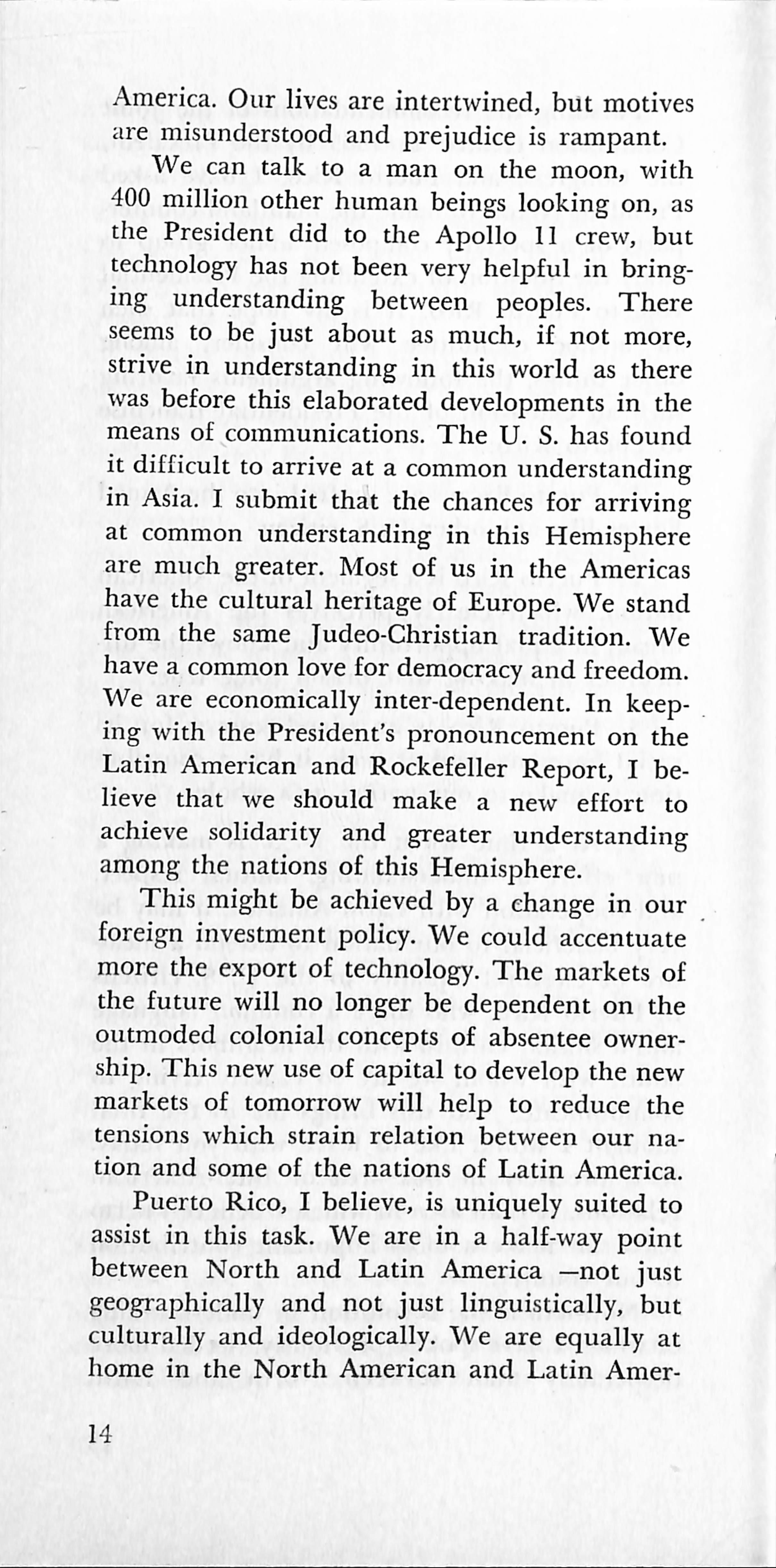
América. Our lives are íntertwined, büt motives are misunderstood and prejudice is rampant. We can talk to a man on the raoon, with 400 million other human beings looking on, as the President did to the Apollo 11 crew, but technology has not been very helpful in bringing understanding between peoples. There seems to be just about as much, if not more, strive in understanding in this world as there was before this elaborated developments in the means of communications. The U. S. has found it difficult to arrive at a common understanding in Asia. I submit that the chances for arriving at common understanding in this Heraisphere are much greater. Most of us in the Americas have the cultural heritage of Europe. We stand from the same Judeo-Christian tradition. We have a common love for democracy and freedom. We are economically inter-dependent. In keeping with the President's pronouncement on the Latin American and Rockefeller Report, I believe that we should make a new effort to achieve solidarity and greater understanding among the nations of this Hemisphere. This might be achieved by a ehange in our foreign investment policy. We could accentuate more the export of technology. The markets of the future will no longer be dependent on the outmoded colonial concepts of absentee ownership. This new use of capital to develop the new markets of tomorrow will help to reduce the tensions which strain relation between our nation and some of the nations of Latin América. Puerto Rico, I believe, is uniquely suited to assist in this task. We are in a half-way point between North and Latin América —not just geographically and not just linguistically, but culturally and ideologically. We are equally at home in the North American and Latin Amer-
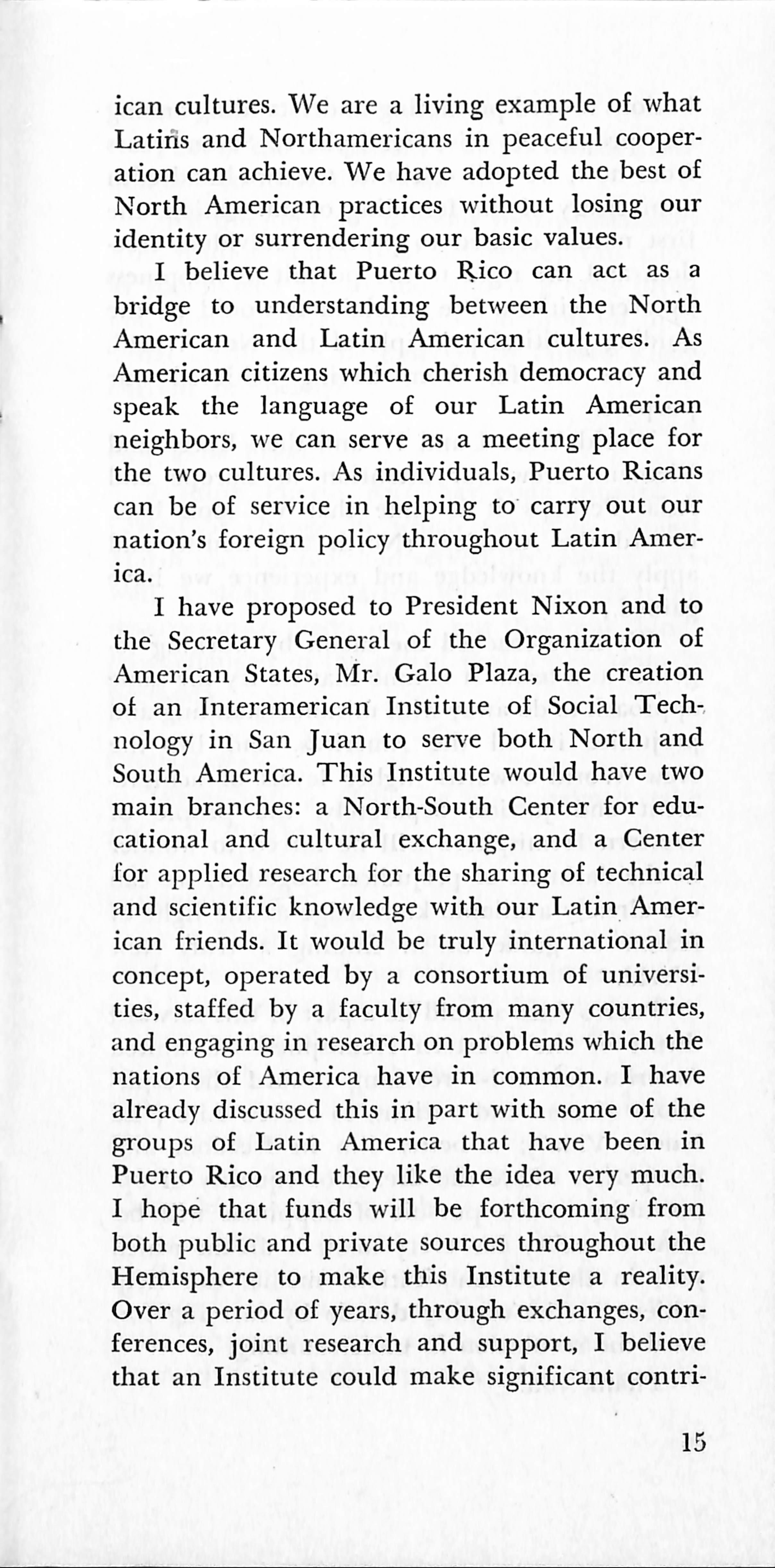
ican cultures. We are a living example o£ what Latiñs and Northamericans in peaceful cooperation can achieve. We have adopted the best o£ North American practices without losing our identity or surrendering our basic valúes.
I believe that Puerto Rico can act as a bridge to understanding between the North American and Latin American cultures. As American citizens which cherish democracy and speak the language o£ our Latin American neighbors, we can serve as a meeting place £or the two cultures. As individuáis, Puerto Ricans can be o£ service in helping to carry out our nation's foreign policy throughout Latin Amer-
I have proposed to President Nixon and to the Secretary General o£ the Organization o£ American States, Mr. Galo Plaza, the creation oí an Interamerican Instituto o£ Social Tech-, nology in San Juan to serve both North and South América. This Instituto would have two main branches: a North-South Center £or educational and cultural exchange, and a Center for applied research £or the sharing of technical and scientific knowledge with our Latin Amer ican Iriends. It would be truly international in concept, operated by a consortium o£ universities, staffed by a laculty from many countries, and engaging in research on problems which the nations of América have in common. I have already discussed this in part with some o£ the groups of Latin América that have been in Puerto Rico and they like the idea very much. I hope that funds will be forthcoming from both public and private sources throughout the Hemisphere to make this Instituto a reality. Over a period of years, through exchanges, conferences, joint research and support, I believe that an Instituto could make significant contri-
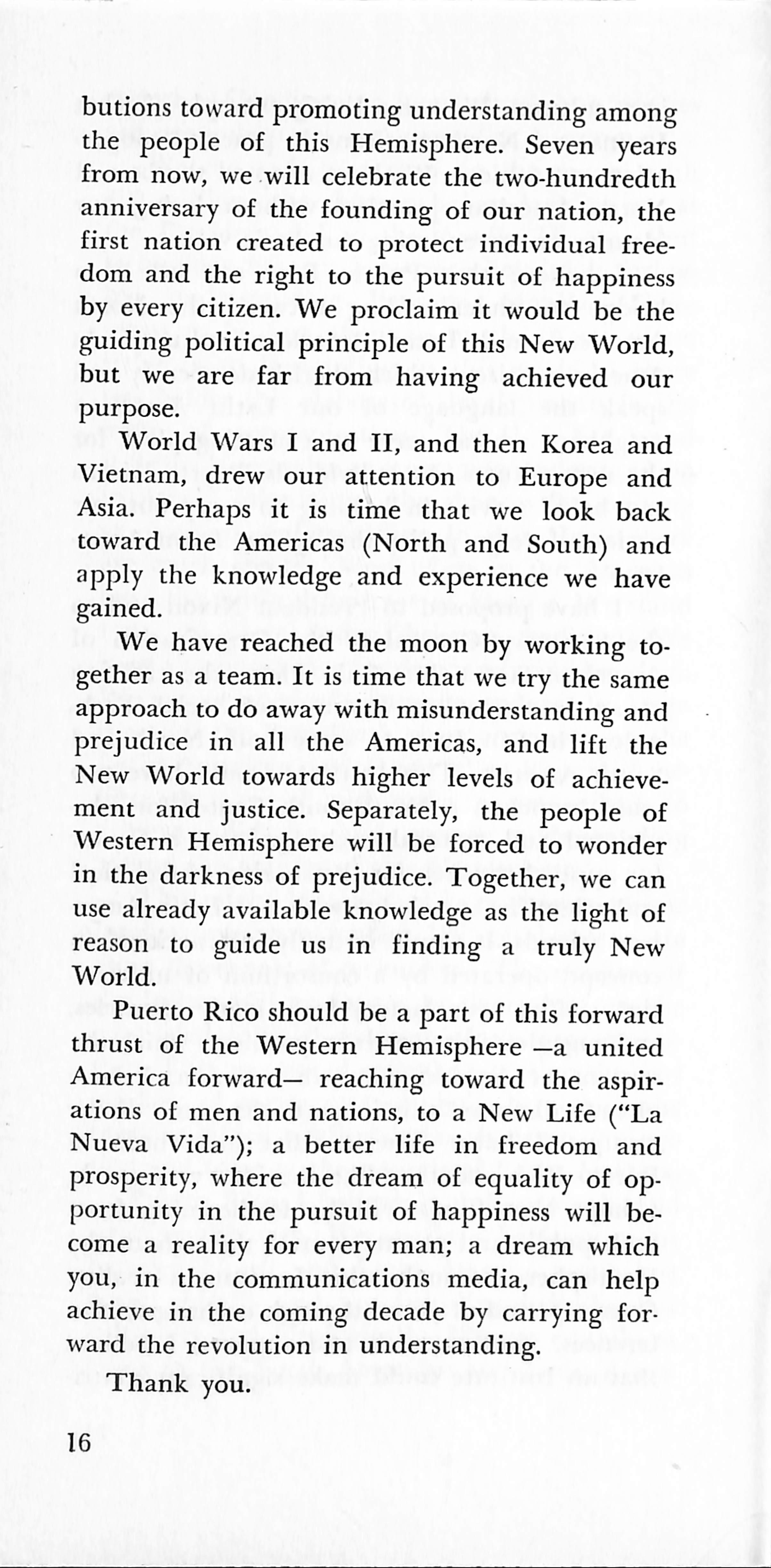
butions toward promoting understanding among the people of this Hemisphere. Seven years from now, we will celébrate the two-hundredth anniversary of the founding of our nation, the first nation created to protect individual freedom and the right to the pursuit of happiness by every citizen. We proclaim it would be the guiding political principie of this New World, but we are far from having achieved our purpose.
World Wars I and II, and then Korea and Vietnam, drew our attention to Europe and Asia. Perhaps it is time that we look back toward the Americas (North and South) and apply the knowledge and experience we have gained.
We have reached the moon by working together as a team. It is time that we try the same approach to do away with misunderstanding and prejudice in all the Americas, and lift the New World towards higher levels of achievement and justice. Separately, the people of Western Hemisphere will be forced to wonder in the darkness of prejudice. Together, we can use already available knowledge as the light of reason to guide us in finding a truly New World.
Puerto Rico should be a part of this forward thrust of the Western Hemisphere —a united América forward— reaching toward the aspirations of men and nations, to a New Life ("La Nueva Vida"); a better life in freedom and prosperity, where the dream of equality of opportunity in the pursuit of happiness will become a reality for every man; a dream which you, in the communications media, can help achieve in the coming decade by carrying for ward the revolution in understanding.
Thank you.
ChAIRiMAN
Text of the Governor's remarks will be available as you leave the room.
First question, sir, is about your predecessor. Luis Muñoz Marín is a member of this Club as you indeed are so, too, añd is greatly loved and adraired here. What do you think of him? What credit does he deserve for Puerto Rico's current prosperity?
Governor Ferré
I think Puerto Rico has gone through a period of change in which Governor Muñoz Marín was a leader and served his country very well. I think he started this change; that he deserves great credit for it, but that now things have changed to the extent that a new team is necessary.
Chairman
When will a plebiscite on statehood take place in Puerto Rico?
Governor Ferré
A plebiscite is something that we would have to decide in accordance with the circumstances and it is hard to say when. We have some very urgent matters that we want to solve first, and this idea of our new Government of a mass attack on these problems, to me, to my mind, is very important.
I think that you cannot save a person by giving him one-half of the medicine he needs, or one-third. You got to give him the full medicine, and we've got to eliminate unemployment in Puerto Rico. Therefore, we have to do whatever is necessary to eliminate unemployment; to reduce it to a fairable percentage.
We llave loday, as you know, 12 per cent, which is very high, and in the areas of young people, 22 per cent, and that, of course, you cannot live with a thing like that.
I think that the first duty I have as Governor is my Government — and I have been very fortúnate to have such men as Mr. Juan Rodríguez de Jesús, who is here with me, as Director of the Economic Development Administration, and Mr. Jorge Córdova, our Resident Commissioner, and a group of other men and women in our Cabinet (top people who have given up salaries three and four times as high as they are making now, for they want to serve the people of Puerto Rico with their knowledge.)
And I think that with this team and this new approach of the welding of science and technology with our Government to have a more efficient Government, we can solve these problems in a few years. After we have solved these problems, then I think that we can have a plebiscite.
Chairman
You referred in your remarks, sir, to the issue of language and the question asked "Wouldn't the language barrier or gap, if you will, pose a most difficult problem in the accomplishment of statehood?"
Governor Ferré
"I don't think so. I think that what is important is to have everybody in Puerto Rico learn English fluently. Now, let me tell you: Puerto Rico became part of the United States in 1898. It was a poor community and I think that the Federal Government did not realize the importance of teaching English in Puerto Rico
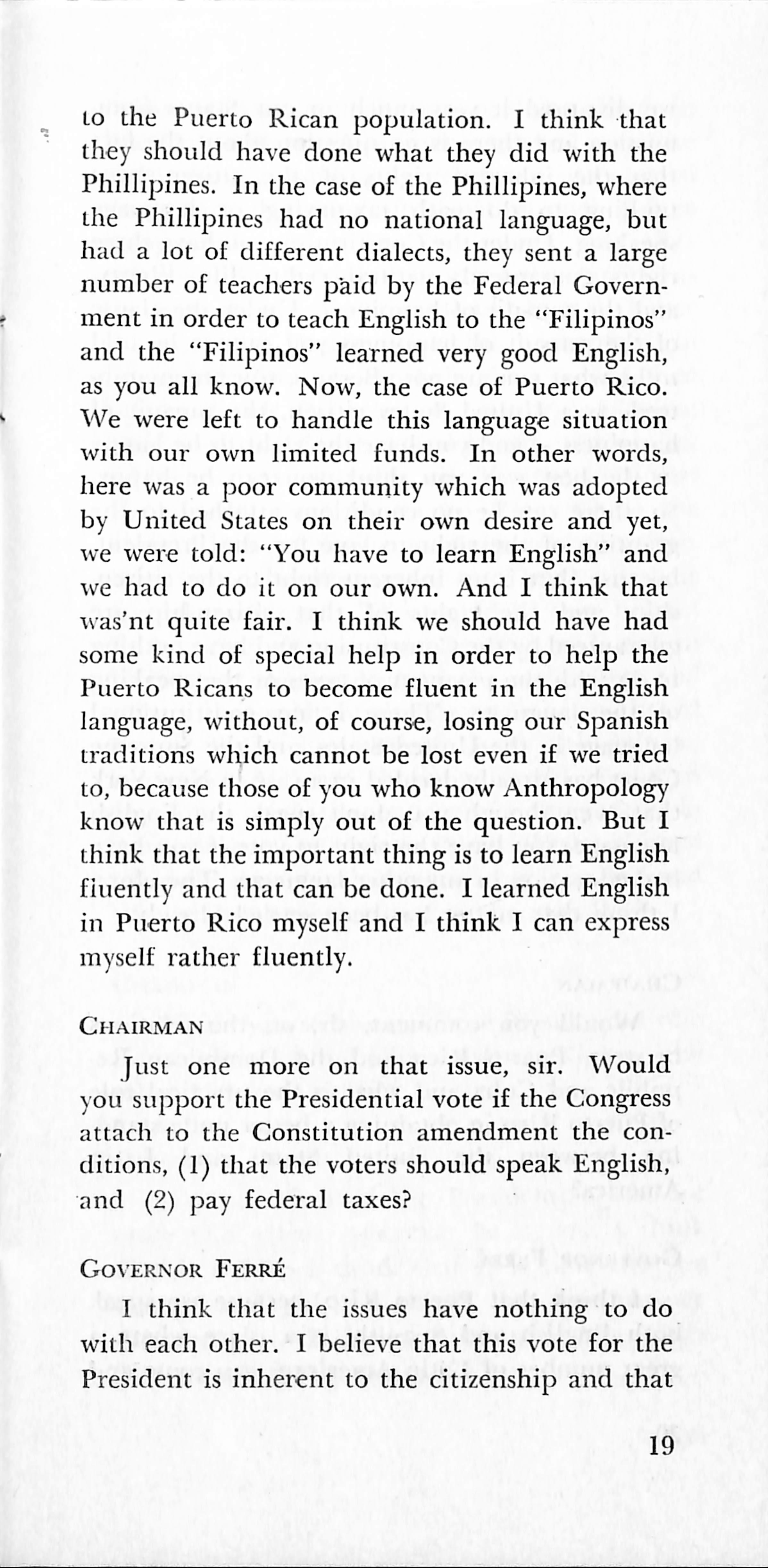
lo the Puerto Rican population. I think that they should have done what they did with the Phillipines. In the case of the Phillipines, where the Phillipines had no national language, but liad a lot of different dialects, they sent a large number of teachers páid by the Federal Government in order to teach English to the "Filipinos" and the "Filipinos" learned very good English, as yon all know. Now, the case of Puerto Rico. We were left to handle this language situation with our own limited funds. In other words, here was a poor community which was adopted by United States on their own desire and yet, we were told: "You have to learn English" and tve had to do it on our own. And I think that was'nt quite fair. I think we should have had some kind of special help in order to help the Puerto Ricans to become fluent in the English language, without, of course, losing our Spanish traditions which cannot be lost even if we tried to, because those of you who know Anthropology know that is simply out of the question. But I think that the important thing is to learn English fluently and that can be done. I learned English in Puerto Rico myself and I think I can express myself rather fluently.
Chairman
Just one more on that issue, sir. Would you support the Presidential vote if the Congress attach to the Constitution amendment the conditions,(1) that the voters should speak English, and (2) pay federal taxes?
Governor Ferré
I think that the íssues have nothing to do with each other. I believe that this vote for the President is inherent to the citizenship and that
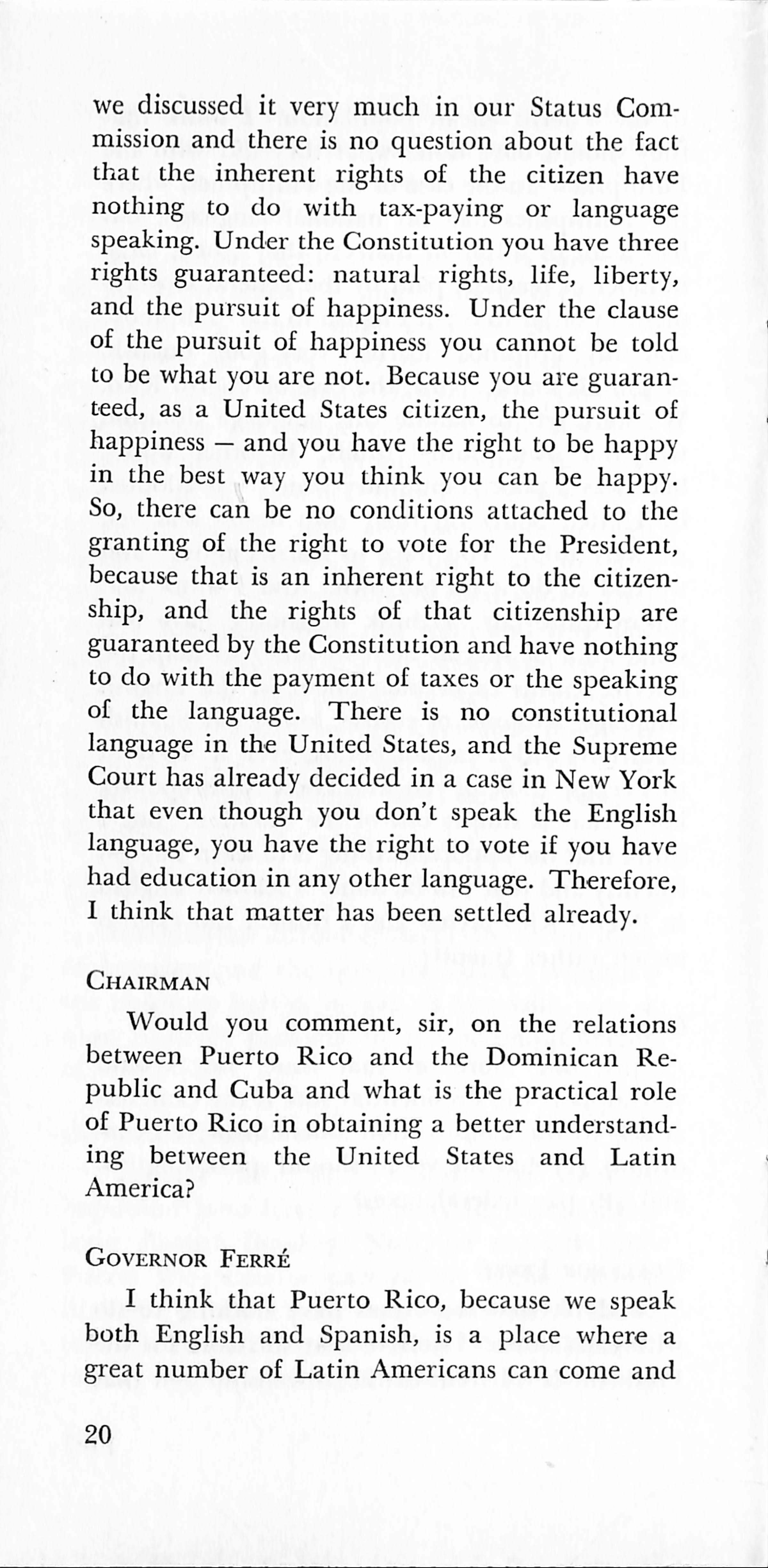
we discussed it very much in our Status Commission and there is no question about the fact that the inherent rights o£ the citizen have nothing to do with tax-paying or language speaking. Under the Constitution you have three rights guaranteed: natural rights, life, liberty, and the pursuit of happiness. Under the clause of the pursuit of happiness you cannot be told to be what you are not. Because you are guaran teed, as a United States citizen, the pursuit of happiness — and you have the right to be happy in the best way you think you can be happy. So, there can be no conditions attached to the granting of the right to vote for the President, because that is an inherent right to the citizenship, and the rights of that citizenship are guaranteed by tbe Constitution and have nothing to do with the payment of taxes or the speaking of the language. There is no constitutional language in the United States, and the Supreme Court has already decided in a case in New York that even though you don't speak the English language, you have the right to vote if you have had education in any other language. Therefore, I think that matter has been settled already.
Chairman
Would you comment, sir, on the relations between Puerto Rico and the Dominican Republic and Cuba and what is the practical role of Puerto Rico in obtaining a better understanding between the United States and Latin América?
Governor Ferré
I think that Puerto Rico, because we speak both English and Spanish, is a place where a great number of Latin Americans can come and
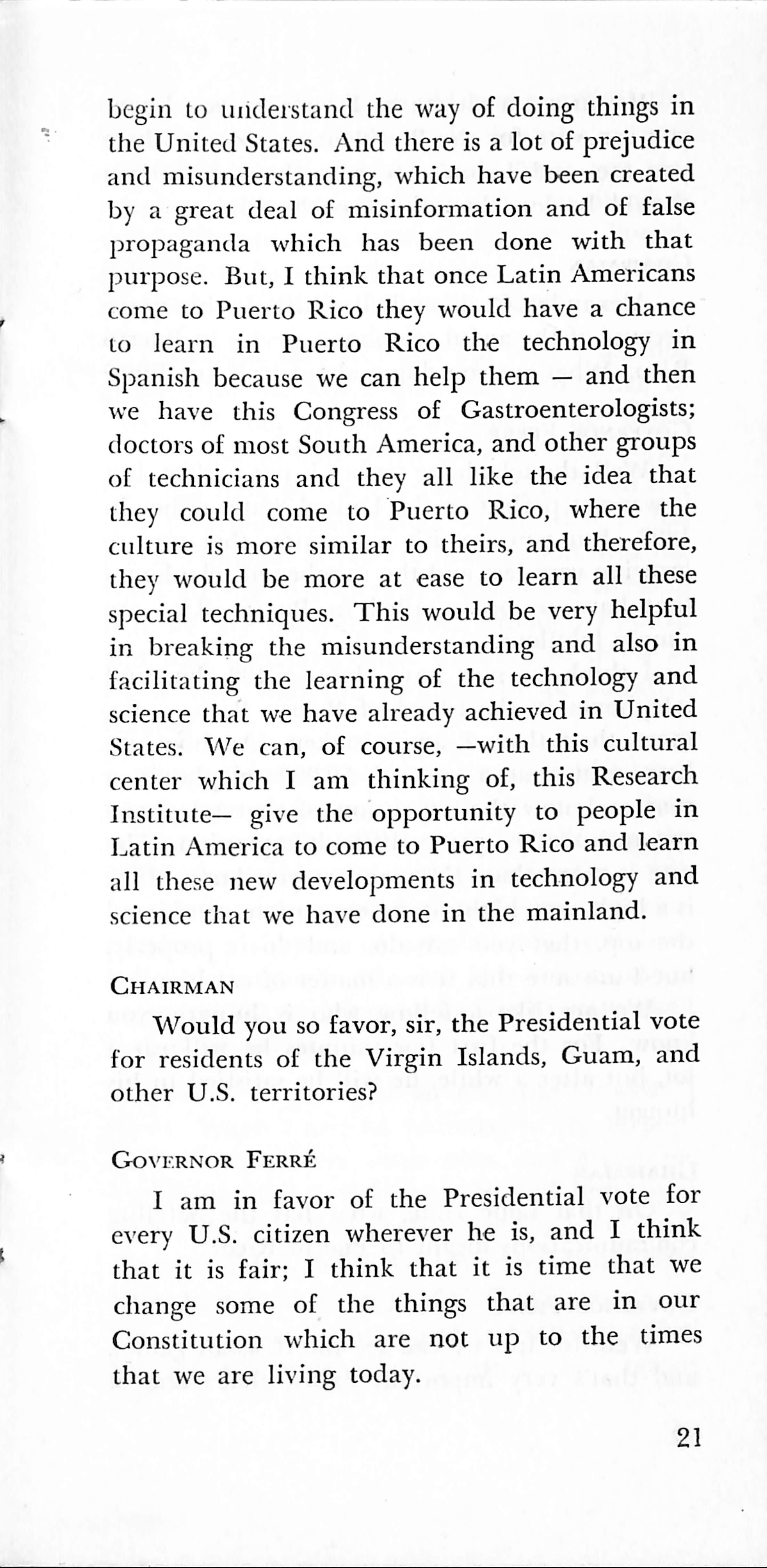
begin Lo uiiderstand the way of doing things in the United States. And there is a lot of prejudice and misunderstanding, which have been created by a great deal of misinformation and of false propaganda which has been done with that purpose. But, I think that once Latín Americans come to Puerto Rico they would have a chance to learn in Puerto Rico the technology in Spanish because we can help them — and then we have this Congress of Gastroenterologists; doctors of most South América, and other groups of technicians and they all like the idea that they could come to Puerto Rico, where the cidture is more similar to theirs, and therefore, they would be more at ease to learn all these special techniques. This would be very helpful in breaking the misunderstanding and also in facilitating the learning of the technology and science that we have already achieved in United States. We can, of course, —with this cultural center which I am thinking of, this Research Institute— give the opportunity to people in Latín América to come to Puerto Rico and learn all these new developments in technology and science that we have done in the mainland.
Chairman
Would you so favor, sir, the Presidential vote for residents of the Virgin Islands, Guam, and other U.S. territories?
Governor Ferré
I am in favor of the Presidential vote for every U.S. citizen wherever he is, and I think that it is fair; I think that it is time that we change some of the things that are in our Constitution which are not up to the times that we are living today.
If you are a citizen of France, as you know, you can vote for the President no matter where you are, and I don't see why the U.S. Citizen should be less than the French citizen.
Chairman
Alexander Graham Bell whirls in his grave because of the awful telephone service in Puerto Rico. What are you doing about it, if anything?
Governor Ferré
Well, the telephone service is not perfect, but it was not perfect in the United States either in 1898. But you see, it's a question that we are growing very fast and the number of telephones that have to be installed in Puerto Rico are simply fabulous.
I think we now have cióse to 100 thousand telephones in the island of Puerto Rico, — no, more than that, I am mistaken. Anyhow, we have grown at a rate of 50,000 telephones a year and now the expansión of that telephone system is really a pretty difficult expansión. The rate is more than 15%, and as you know, 15% is a high, very high rate of expansión, considered the top, that you can do, and do it properly, but I am sure that it is a matter of catching-up.
We are like a fellow who is hungry, you know. For the first few minutes he will eat a lot, but after a while, he will be satisfied in his hunger.
Chairman
On that same issue, what has the Satellite communications meant to Puerto Rico?
Governor Ferré
Well, for fun we can see the baseball games, and that's very important today; that's one of
the things that makes people happy, and at the same time it has, of course, facilitated the communications with the mainland. Now, you see, telephone communication with the mainland is very important to us, because industry in Puerto Rico has to have quick, efficient, and fast com munication with the mainland offices.
Therefore, they feel that our society has not given them the world that they would like to have, and they are right on that. They think that we should have given them a better world, but tbey have to learn, however, that it isn't so easy to achieve that better world; that it has taken thousands of years of practice and sweating and suffering to achieve the amount of freedom that we are enjoying today, although limited, and that therefore, what we have to do is to try to look into this problem in an objective manner.
What I said of the revolution in understanding is most important. With this tremendous rapidity in communications today all ovar the world, the problems of understanding are worse. In oíd times you only had problems of under standing with your nation, but now you have it. with everybody all over the world instantaneously. So, we got to find a way to understand each other better.
I want to give you an example of what I mean. When I arrived yesterday at the airport, one of the porters came over and asked me something, and I was going to cali him, so, I said: "Boy". All the people around me said: "Just a minute, don't ever say "boy" to a porter here. It is kind of an insult." Well, you see, to me, to say "boy" was a perfectly natural thing, like saying "muchacho." "Muchacho" means
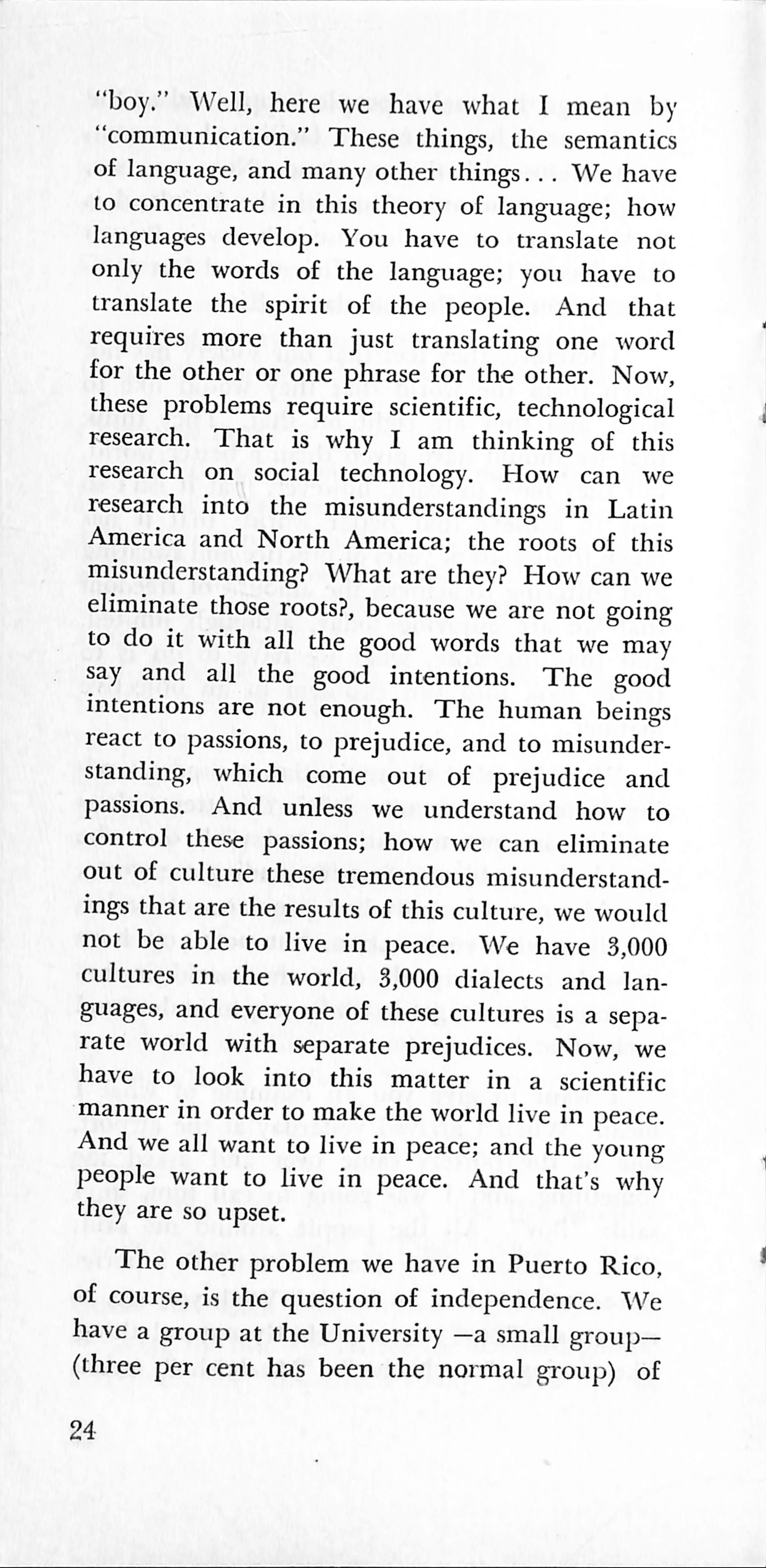
"boy." AVell, here we have what I mean by "communication." These things, the semantics of language, and many other things... We have lo concéntrate in this theory of language; how languages develop. You have to transíate not oniy the words of the language; you have to transíate the spirit of the people. And that requires more than just translating one word for the other or one phrase for the other. Now, these problems require scientific, technological research. That is why I am thinking of this research on social technology. How can we research into the misunderstandings in Latin América and North América; the roots of this misunderstanding? What are they? How can we eliminate those roots?, because we are not going to do it with all the good words that we may say and all the good intentions. The good intentions are not enough. The human beings react to passions, to prejudice, and to misunder standing, which come out of prejudice and passions. And unless we understand how to control these passions; how we can eliminate out of culture these tremendous misunderstand ings that are the results of this culture, we would not be able to live in peace. We have 3,000 cultures in the worid, 3,000 dialects and lan guages, and everyone of these cultures is a sepá rate worId with sepárate prejudices. Now, we have to look into this matter in a scientific manner in order to make the worId live in peace. And we all want to live in peace; and the young people want to live in peace. And that's why they are so upset.
The other probiem we have in Puerto Rico, of course, is the question of independence. We have a group at the University —a small group— (three per cent has been the normal group) of
Independentists in Puerto Rico who would like to forcé Independence, not by the democratic process of the vote, but by imposing it by forcé witlr the help of some Communists from Cuba. Well, Puerto Rico doesn't stand for that. We llave shown that we are very strong believers in the democratic process, and the people of Puerto Rico, no matter how poor they are, they believe in the peaceful achievements that can be done with the power of the vote, and no amount of Independentism, no amount of Communism will ever change the mind of the people in Puerto Rico. I am confident on that.
Chairman
"There are a couple of questions, if I may, sir. Would you, could you really cure Puerto Rico's ills without some positive birth control methods?
Governor Ferré
Here is the report of one of my task forces on birth control. So, you'll see we are going at it.
Chairman
Someone has asked me to ask this question; How is our oíd Press Club friend Bill Dorvillier?
Governor Ferré
Bill Dorvillier is doing fine. Now he has a program on televisión and he is also in charge of the WAPA Station. And he is a "jíbaro": he is a Puerto Rican by now. He has been able to trascend the barrier of misunderstanding and he has completely identified himself with the people of Puerto Rico.
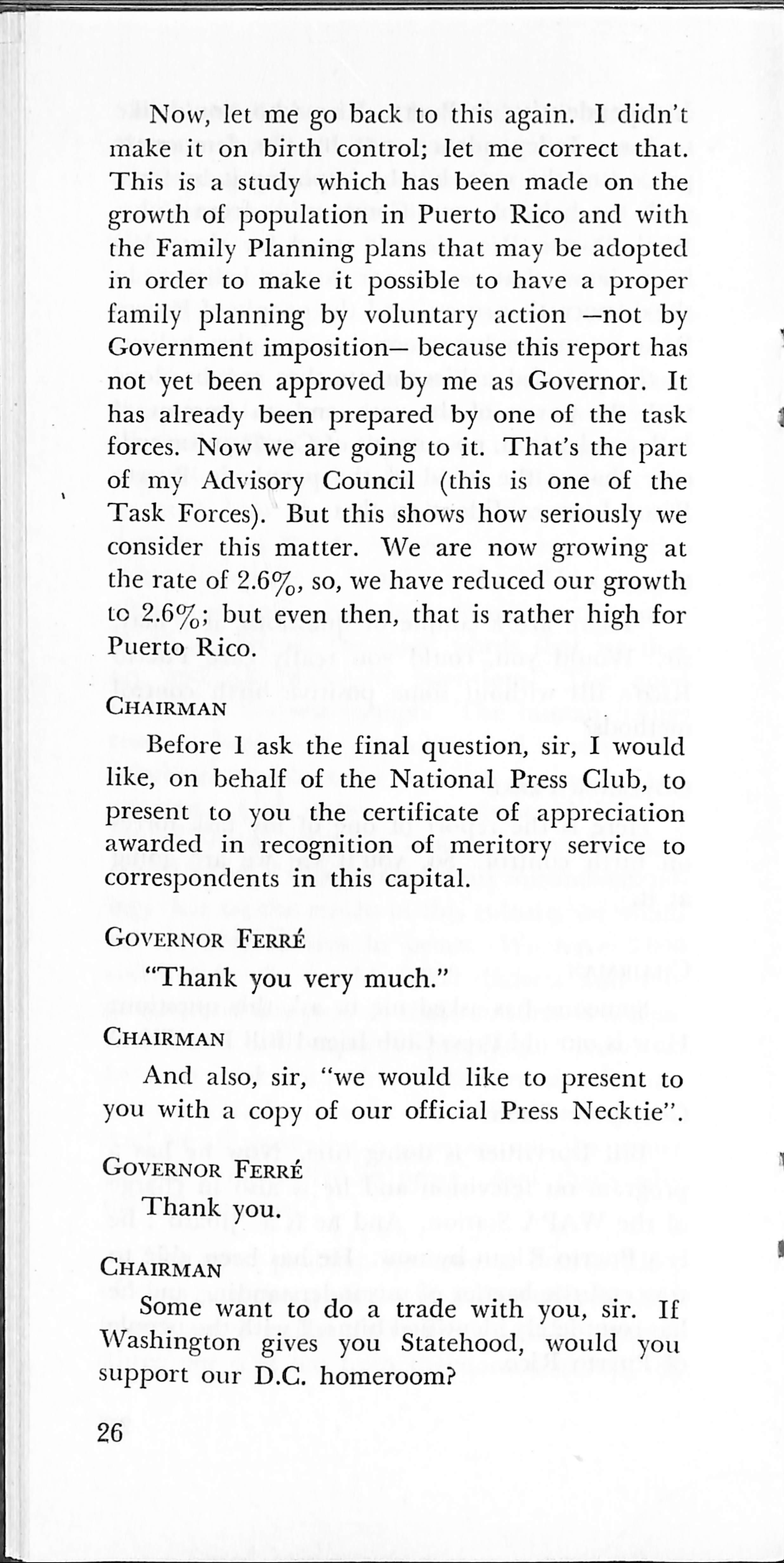
Now, let me go back to this again. I didn't make it on birth control; let me correct that. This is a study which has been made on the growth of population in Puerto Rico and with the Family Planning plans that may be adopted in order to make it possible to have a proper family jjlanning by voluntary action —not by Government imposition— because this report has not yet been approved by me as Governor. It has already been prepared by one of the task forces. Now we are going to it. That's the part of my Advisory Council (this is one of the Task Forces). But this shows how seriously we consider this matter. We are now growing at the rate of 2.6%, so, we have reduced oiir growth to 2.6%; but even then, that is rather high for Puerto Rico.
Chairman
Before 1 ask the final question, sir, I would like, on behalf of the National Press Club, to present to yon the certifícate of appreciation awarded in recognition of meritory service to correspondents in this capital.
Governor Ferré
"Thank you very much."
Chairman
And also, sir, "we would like to present to you with a copy of our official Press Necktie".
Governor Ferré
Thank vou.
Chairman
Some want to do a trade with you, sir. If Washington gives you Statehood, would you support our D.C. homeroom?
Güvernor Ferré
We will support justice for D.C. That's a fair deal.
Thank you very much for the honor having me here as your guest, and of course, thank you t'ery much for these gifts you have given me. Mr. Chairman, thank you.
Chairman
Thank you very much.
La Oficina de Prensa de La Fortaleza publica este folleto, que contiene el discurso que pronunció el Go bernador de Puerto Rico, don Luis A. Ferré, el 20 de noviembre de 1969, ante el National Press Club, en Washington, asi como una transcripción del intercambio de preguntas y respuestas, que surgió al final de su disertación ante los más importantes y prestigiosos perio distas que cubren las noticias de la Capital Federal. El folleto contiene, además, una versión al español de esa actividad. La misma fue presidida por el señor John W. Heffernan, Presidente del National Press Club, quien hizo la presentación del Gobernador.
Nos honramos en tener hoy en nuestra agenda a un hombre que ha originado una nueva era en el desarrollo de la vida política de Puerto Rico. Y nos es también placentero que nos po damos reunir aquí como si se tratara de la cele bración del 476 aniversario del desembarco de Cristóbal Colón en Puerto Rico en 1493.
Nuestro Gobernador invitado, Luis A. Ferré, un industrial de 64 años de edad, dirige ahora el Estado Libre Asociado, el cual fue desde el año 1948 al 1968, automáticamente identificado por el mundo exterior con el liderato indis cutible del Partido Popular Democrático, y particularmente, del exgobernador, Luis Muñoz Marín. Como el señor Andrew T. Viglucci, editor del "San Juan Star" manifestó en un artículo que escribió para la revista Look hace unos meses, después de 29 años está ocurriendo un cambio de guardia en Puerto Rico y el elec torado está llegando a su mayoría de edad. Escribió el señor Viglucci: "Da pena observar quién en este Partido va decayendo, pero, sí existe majestuosidad en el proceso democrático que lo ha producido".
Lo que hizo la elección de Luis Ferré el pasado noviembre un suceso histórico de tal imjDortancia fue el hecho de que él favorece la estadidad eventual para la isla. En marzo de este año, el Gobernador afirmó a reporteros na cionales y mundiales que: "la estadidad es el objetivo final de todos los ciudadanos norteame ricanos. No se puede ser un ciudadano ame ricano completo sin el disfrute de los derechos que conlleva la estadidad". El dilema ahora es si la presencia del nuevo Gobernador o su enfo que, moverán más rápidamente a Puerto Rico
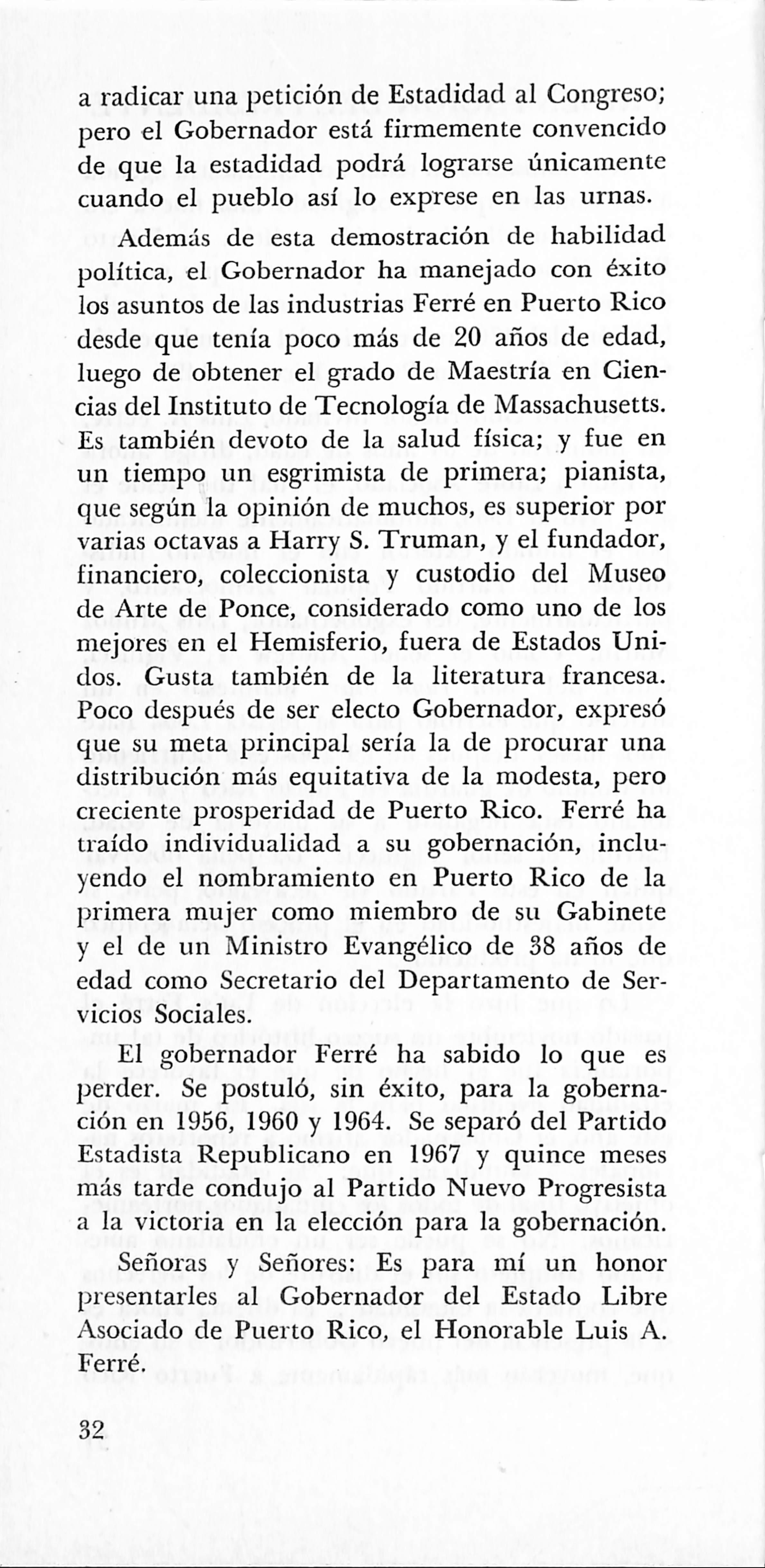
a radicar una petición de Estadidad ai Congreso; pero el Gobernador está firmemente convencido de que la estadidad podrá lograrse únicamente cuando el pueblo así lo exprese en las urnas. Además de esta demostración de habilidad política, el Gobernador ha manejado con éxito los asuntos de las industrias Ferré en Puerto Rico desde que tenía poco más de 20 años de edad, luego de obtener el grado de Maestría en Cien cias del Instituto de Tecnología de Massachusetts. Es también devoto de la salud física; y fue en un tiempo un esgrimista de primera; pianista, que según la opinión de muchos, es superior por varias octavas a Harry S. Truman, y el fundador, financiero, coleccionista y custodio del Museo de Arte de Ponce, considerado como uno de los mejores en el Hemisferio, fuera de Estados Uni dos. Gusta también de la literatura francesa. Poco después de ser electo Gobernador, expresó que su meta principal sería la de procurar una distribución más equitativa de la modesta, pero creciente prosperidad de Puerto Rico. Ferré ha traído individualidad a su gobernación, inclu yendo el nombramiento en Puerto Rico de la primera mujer como miembro de su Gabinete y el de un Ministro Evangélico de 38 años de edad como Secretario del Departamento de Ser vicios Sociales.
El gobernador Ferré ha sabido lo que es perder. Se postuló, sin éxito, para la goberna ción en 1956, 1960 y 1964. Se separó del Partido Estadista Republicano en 1967 y quince meses más tarde condujo al Partido Nuevo Progresista a la victoria en la elección para la gobernación.
Señoras y Señores; Es para mí un honor presentarles al Gobernador del Estado Libre Asociado de Puerto Rico, el Honorable Luis A. Ferré.
Es un verdadero placer encontrarme aquí entre mis colegas, ya que soy un miembro de la Asociación, y lo he sido durante muchos, muchos años —no sé si alguno de ustedes lo sabe— pero, por supuesto, quisiera decir algunas palabras acerca de la gobernación de Puerto Rico antes de comenzar a leer mis notas.
Realmente trabajé muy duro para llegar allí, y estoy seguro de haberme sorprendido tanto como mis buenos amigos Ben Stefansky y Jim Rowe,(ambos estaban presentes) quienes fueron mis colegas en la Comisión de Status, cuando triunfé en las elecciones. Sin embargo, sucedió algo cuando llegué a La Fortaleza al día siguiente de haber prestado juramento. Como ustedes sabrán, yo había luchado arduamente por tres ocasiones diferentes, pero había sido derrotado y finalmente tuve que luchar más que el Presi dente Nixon para llegar a la gobernación. Triun fé, así que luego invité a mi nietecita a que me visitara en La Fortaleza, pero al llegar allí se me acercó y dijo: "No me gusta estar aquí, volvá monos a casa". Esto me causó una pequeña decepción, pero desde esa ocasión, ella ha dis frutado un poco más.
En lo que concierne a mi labor en Puerto Rico; y lo que los puertorriqueños son, quisiera relatarles una historia acerca de ellos, que creo vale la pena conocer y que se cuenta así: Un hombre murió y deseaba ir al Paraíso, así que tocó a la puerta del cielo y San Pedro le abrió diciendo: "¿Qué desea?" "Me gustaría saber cuánto me agrada este lugar y tal vez termine quedándome en el." Así que San Pedro dijo: "Está bien, entra," y lo llevó a dar un paseo por el lugar. Le mostró las hermosas calles, los
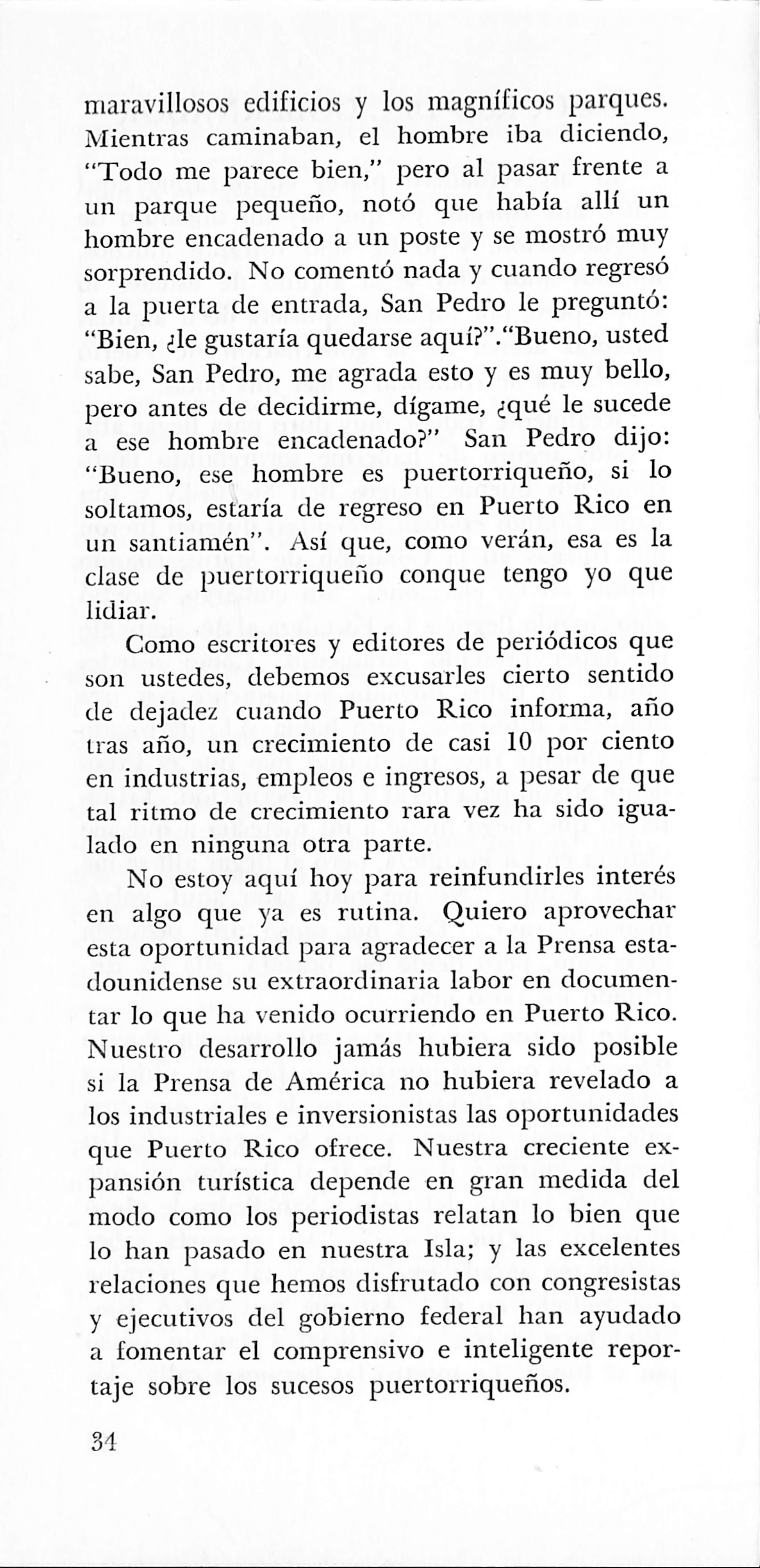
maravillosos edificios y los magníficos parques. Mientras caminaban, el hombre iba diciendo, "Todo me parece bien," pero al pasar frente a un parque pequeño, notó que había allí un hombre encadenado a un poste y se mostró muy sorprendido. No comentó nada y cuando regresó a la puerta de entrada, San Pedro le preguntó: "Bien, ¿le gustaría quedarse aquí?"."Bueno, usted sabe, San Pedro, me agrada esto y es muy bello, pero antes de decidirme, dígame, ¿qué le sucede a ese hombre encadenado?" San Pedro dijo: "Bueno, ese hombre es puertorriqueño, si lo soltamos, estaría de regreso en Puerto Rico en un santiamén". Así que, como verán, esa es la clase de puertorriqueño conque tengo yo que lidiar.
Como escritores y editores de peidódicos que son ustedes, debemos excusarles cierto sentido de dejadez cuando Puerto Rico informa, año tras año, un crecimiento de casi 10 por ciento en industrias, empleos e ingresos, a pesar de que tal ritmo de crecimiento rara vez ha sido igua lado en ninguna otra parte.
No estoy aquí hoy para reinfundirles interés en algo que ya es rutina. Quiero aprovechar esta oportunidad para agradecer a la Prensa esta dounidense su extraordinaria labor en documen tar lo que ha venido ocurriendo en Puerto Rico. Nuestro desarrollo jamás hubiera sido posible si la Prensa de América no hubiera revelado a los industriales e inversionistas las oportunidades que Puerto Rico ofrece. Nuestra creciente ex pansión turística depende en gran medida del modo como los periodistas relatan lo bien que lo han pasado en nuestra Isla; y las excelentes relaciones que hemos disfrutado con congresistas y ejecutivos del gobierno federal han ayudado a fomentar el comprensivo e inteligente repor taje sobre los sucesos puertorriqueños.
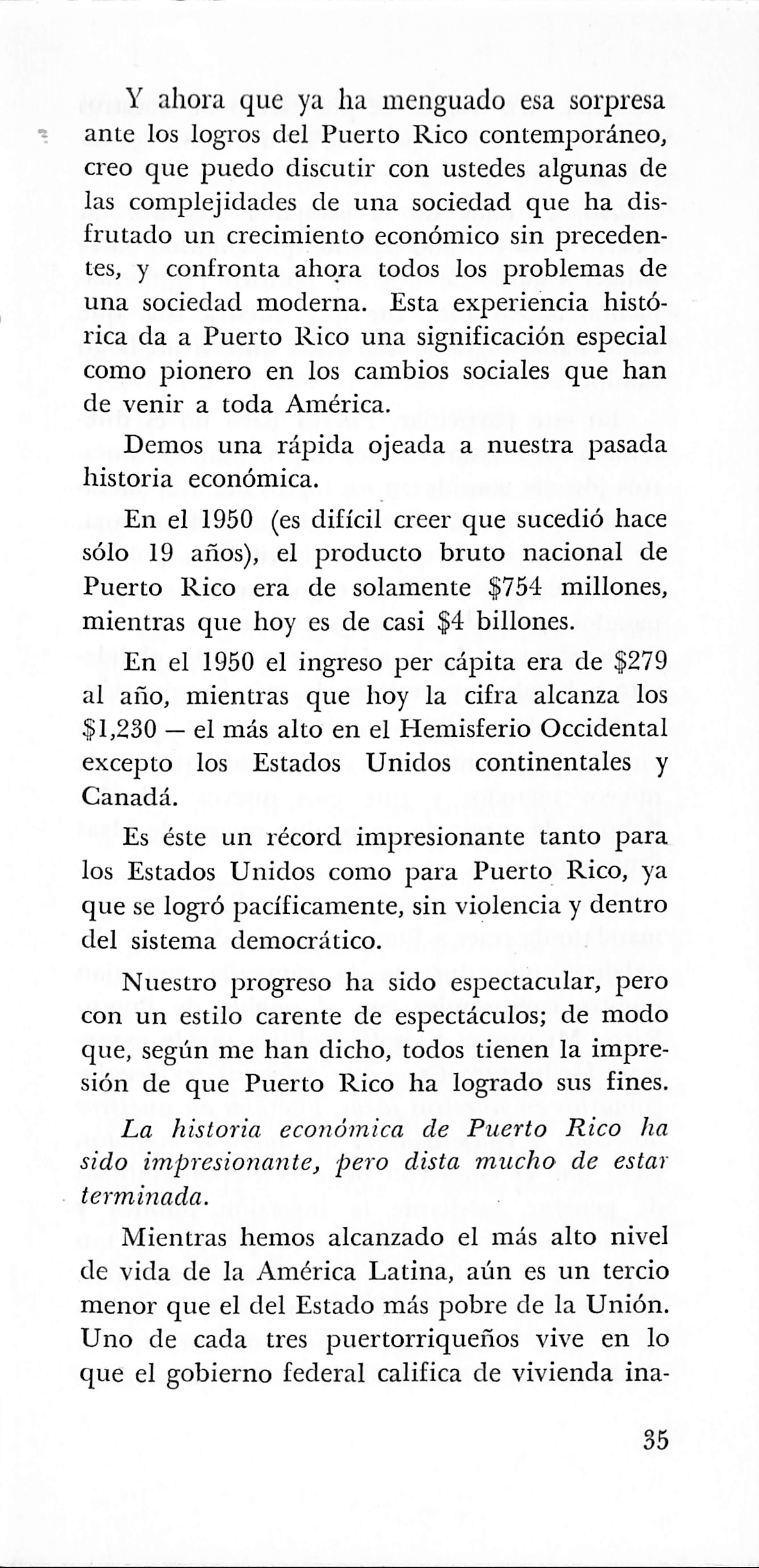
Y ahora que ya ha menguado esa sorpresa ante los logros del Puerto Rico contemporáneo, creo que puedo discutir con ustedes algunas de las complejidades de una sociedad que ha dis frutado un crecimiento económico sin preceden tes, y confronta ahora todos los problemas de una sociedad moderna. Esta experiencia histó rica da a Puerto Rico una significación especial como pionero en los cambios sociales que han de venir a toda América.
Demos una rápida ojeada a nuestra pasada historia económica.
En el 1950 (es difícil creer que sucedió hace sólo 19 años), el producto bruto nacional de Puerto Rico era de solamente $754 millones, mientras que hoy es de casi $4 billones.
En el 1950 el ingreso per cápita era de $279 al año, mientras que hoy la cifra alcanza los $1,230 — el más alto en el Hemisferio Occidental excepto los Estados Unidos continentales y Canadá.
Es éste un récord impresionante tanto para los Estados Unidos como para Puerto Rico, ya que se logró pacíficamente, sin violencia y dentro del sistema democrático.
Nuestro progreso ha sido espectacular, pero con un estilo carente de espectáculos; de modo que, según me han dicho, todos tienen la impre sión de que Puerto Rico ha logrado sus fines.
La historia económica de Puerto Rico ha sido impresionantej pero dista mucho de estar terminada.
Mientras hemos alcanzado el más alto nivel de vida de la América Latina, aún es un tercio menor que el del Estado más pobre de la Unión. Uno de cada tres puertorriqueños vive en lo que el gobierno federal califica de vivienda ina-
decuada. Un trágico 22 por ciento de nuestros hombres entre las edades de 20 a 24 está desem pleado.
Así, el tema de la campaña electoral en Puerto Rico del año pasado, que culminó en el ¡Jrimer cambio de liderato político y guberna mental en 28 años, fue que nuestra Isla, que tanto había logrado, aún tenía ante sí un largo
En este particular. Puerto Rico no es dife rente a los Estados Unidos continentales — nues tros jóvenes consideran los logros del ayer mera mente como puntos de partida para el mañana. Si bien es cierto que una institución política establecida puede sentirse orgullosa de sus logros pasados, no puede dormirse sobre sus laureles. Debe esforzarse hacia adelante o rendir el lide rato a hombres y mujeres de más imaginación. El pueblo de Puerto Rico decidió que los viejos y persistentes retos debían enfrentarse con nuevos métodos y que esos nuevos métodos habrían de surgir de un equipo nuevo, de ideas innovadoras.
Interpreto esa confianza de ellos como un mandato de traer a Puerto Rico La Nueva Vida, palabras que durante la campaña resumían nuestro compromiso con el pueblo de Puerto Rico. Mi propia filosofía política puede expre sarse fácilmente: Creo que debemos ser revolu cionarios en nuestras ideas, liberales en nuestros objetivos y conservadores en nuestros métodos. Creo que el Gobierno tiene la responsabilidad de generar, mediante la inversión pública y privada, un nivel de seguridad que no sea tan bajo con el cual ninguna familia pueda vivir.
Este nivel deberá proveer las necesidades básicas de la vida. Ningún gobierno democrático debe silenciosamente hacerse de la vista larga mientras
su gente se cobija en vivienda pobre, o no puede ganar suficiente para alimentar a sus familias.
Esto no quiere decir que el hombre deba encerrarse en la concha de esa existencia míni ma. Los que pueden trabajar deben hacerlo. Los que necesiten-adiestramiento para trabajar deben adiestrarse. Los contribuyentes deben comprender que los gastos en tales áreas no representan bienestar social, sino una sólida y sana inversión en capital humano.
Los que no pueden trabajar —los ancianos, los enfermos, los sicológicamente destrozados— representan la tutela del Estado y el precio que una nación debe pagar por sus irresolutos pro blemas del ayer.
En esta Nueva Vida no podemos permitir que los hijos de la pobreza de hoy se conviertan en los iJadres de la pobreza de mañana. Ninguna nación sobrevivirá, incluso la nuestra, a menos que logre romper ese ciclo.
No soy uno de esos románticos que cree que la pobreza puede eliminarse. Pero si creo que los extremos de pobreza pueden y deben erradi carse, y que la "inevitabilidad" de la pobreza para sectores enteros de nuestro pueblo debe y puede invalidarse. Y creo que hacerlo seria un "buen negocio".
Esto requieie un ataque masivo y coordinado, una "operación de avance", contra problemas como el desempleo, la educación y la salud. La riqueza y la tecnología para llevar a cabo este ataque están disponibles; lo único que hace falta es la decisión de asignar efectivamente los re cursos para logi-ar dicha meta.
Por ejemplo, vale la pena pedir dinero pres tado —si fuera necesario— y usarlo sabiamente en la solución de estos problemas, ya que al
aumentar el potencial humano éste generará ingresos en exceso de la amortización y del inte rés. De conformidad con este razonamiento, en Puerto Rico hemos procedido a establecer becas para todos los estudiantes necesitados y hemos ayudado a aquellos que desean pedir dinero prestado de fondos federales mediante el pago de un interés suplementario sobre sus préstamos.
Estamos haciéndole frente al problema de una agricultura en ruinas, mediante un enfoque tripartita: pagamos al "agregado" salarios suple mentarios para desalentar su emigración hacia áreas urbanas donde se enreda en la maraña de los arrabales, del desempleo y de la delincuencia; pagamos al agricultor un subsidio de 50 por ciento para que mecanice sus operaciones; y le brindamos ayuda técnica para mejorár su pro ductividad.
Mediante estas acciones confiamos reducir la emigración a las ciudades sobrepobladas, pro veer al trabajador de la finca un salario decente, y modernizar nuestro sector agrícola.
Y, mientras empleamos medidas tan extraor dinarias en beneficio de los desamparados de la sociedad, debemos también ayudar al que tiene talento hasta donde ese talento, y su adiestra miento y ambición, le puedan llevar.
¿Podremos eliminar los extremos de la po breza y al mismo tiempo preservar y promover un sistema de mayor oportunidad de progreso para los miembros más productivos de la socie dad? Creo que sí.
Durante los últimos 20 años hemos tenido una revolución en las comunicaciones. Durante los próximos 20 años necesitamos una revolución en la comprensión. Hemos comenzado a desa-
rrollar una conciencia instantánea, no sólo de la conquista de la Luna, sino también del ham bre en Africa, Asia y la América Latina. Las antiojeras se descorren de modo que mientras un hombre progresa cuanto puede con su talento, adiestramiento y ambición, habrá menos proba bilidad de que ignore las necesidades de los menos afortunados a lo largo del camino. La venidera revolución en la comprensión no solamente afectará las relaciones del hombre con su semejante sino, tal vez de modo más dramático, reevaluará la relación entre los ciu dadanos y su Gobierno. En Puerto Rico ya andamos a la caza del moderno equivalente democrático a la reunión pueblerina de Nueva Inglaterra. Y en esta labor hemos empleado tanto la tecnología como la comprensión.
Durante generaciones pasadas el Gobierno de Puerto Rico ha sido desatento o paternalista. Hoy es respondedor y responsable. En vez de exigir una devota lealtad y sumisión, esta Admi nistración procura informar al pueblo, ganarse su confianza, hacerlo parte del proceso guberna mental, y desarrollar un mecanismo que escuche quejas y tome acción reparadora.
Estamos convencidos de que la política y la tecnología social pueden fundirse para ayudar a mejorar el proceso mismo de gobierno por anticipación y no por crisis. En este día y fecha, el Gobierno tiende a alejarse del pueblo cada vez más. El Gobierno es tan vasto, las comuni caciones tan complejas, que el ciudadano prome dio se siente perdido o enajenado. Yo estoy usando la ciencia para acercar más el gobierno a la gente.
Y ahora estamos confeccionando un sistema mediante el cual, con la ayuda de las técnicas de la computadora, el Gobierno pueda más efec-
tivamente poner una serie de datos a la disposi ción del pueblo, y nuevamente con la ayuda de la computadora, obtener una reacción y partici pación ciudadana. Gracias a la moderna tecno logía social, el Gobierno está hoy mejor capaci tado para saber lo que sus ciudadanos desean y tomar acción sobre esas necesidades antes de que éstas se tornen graves y estallen en descontento e insatisfacción.
Otra innovación indicativa de nuestro nuevo enfoque gubernamental es el Consejo Asesor del Gobernador para el Desarrollo de Programas de Gobierno. Este es un cuerpo bipartita, com puesto de distinguidos ciudadanos de Puerto Rico y asesorado por el mejor talento en y fuera de la Isla. Algunas de las áreas que explora al presente son: la explosión poblacional, los re cursos humanos, el desarrollo de los recursos naturales, la conser-vación, y el desarrollo indus trial. Este grupo nos asesora sobre una base a largo plazo y da un sentido de dirección a nues tras decisiones día tras día.
Contemplando la reciente historia política de Puerto Rico, encontramos notables adelantos paralelos con nuestro progreso económico.
Ciudadanos americanos desde 1917, mediante una ley del Congreso, los puertorriqueños han logrado el derecho a elegir su propio Goberna dor (eso fue en el 1948), y de redactar su propia constitución de gobierno interno (cuatro años más tai-de, en el 1952).
Hemos progresado firme y pacíficamente, y nunca hemos sido tentados o amenazados por el extremismo. Todo se ha llevado a cabo mediante la evolución y no mediante la revolución.
Ha sido esta una historia de interés perio dístico, pero es una que aún no ha terminado.
Sin duda ustedes se preguntarán cuál habrá de ser la relación de Puerto Rico con los Estados Unidos.
Cansistentemente —elección tras elección y por márgenes cada vez mayores— nuestro pueblo ha afirmado y reafirmado sus intenciones de permanecer dentro del marco del Gobierno de los Estados Unidos.
La única interrogante que persiste es la forma de Gobierno que esta unión permanente con nuestros conciudadanos americanos habrá de tomar.
Hay quienes quisieran retener para siempre la posición única y privilegiada de Puerto Rico como Estado Libre Asociado — sin pagar im puestos federales.
Y habemos muchos —y nuestros números aumentan constantemente— que visualizamos el actual status de Estado Libre Asociado como un medio de mejorar nuestra posición económica, hasta que nuestro pueblo pueda asumir las ple nas responsabilidades y privilegios inherentes a la ciudadanía. El status de Estado Libre Aso ciado, estamos convencidos, es un privilegio a la vez que una condición perjudicial. No com partimos la carga de la contribución federal, es cierto. Pero tampoco compartimos el cada vez mayor poder del Gobierno federal de tomar deci siones arrobadoras que afectan más y más la vida de todos los ciudadanos americanos. Tam poco compartimos plenamente los programas instituidos por el gobierno federal.
Tengo plena confianza que llegará el día en que el pueblo de Puerto Rico le pida al Con greso su admisión como estado de la Unión. Estoy igualmente confiado de que el Congreso consistentemente preparará a Puerto Rico para el día en que pueda llegar a tal determinación.
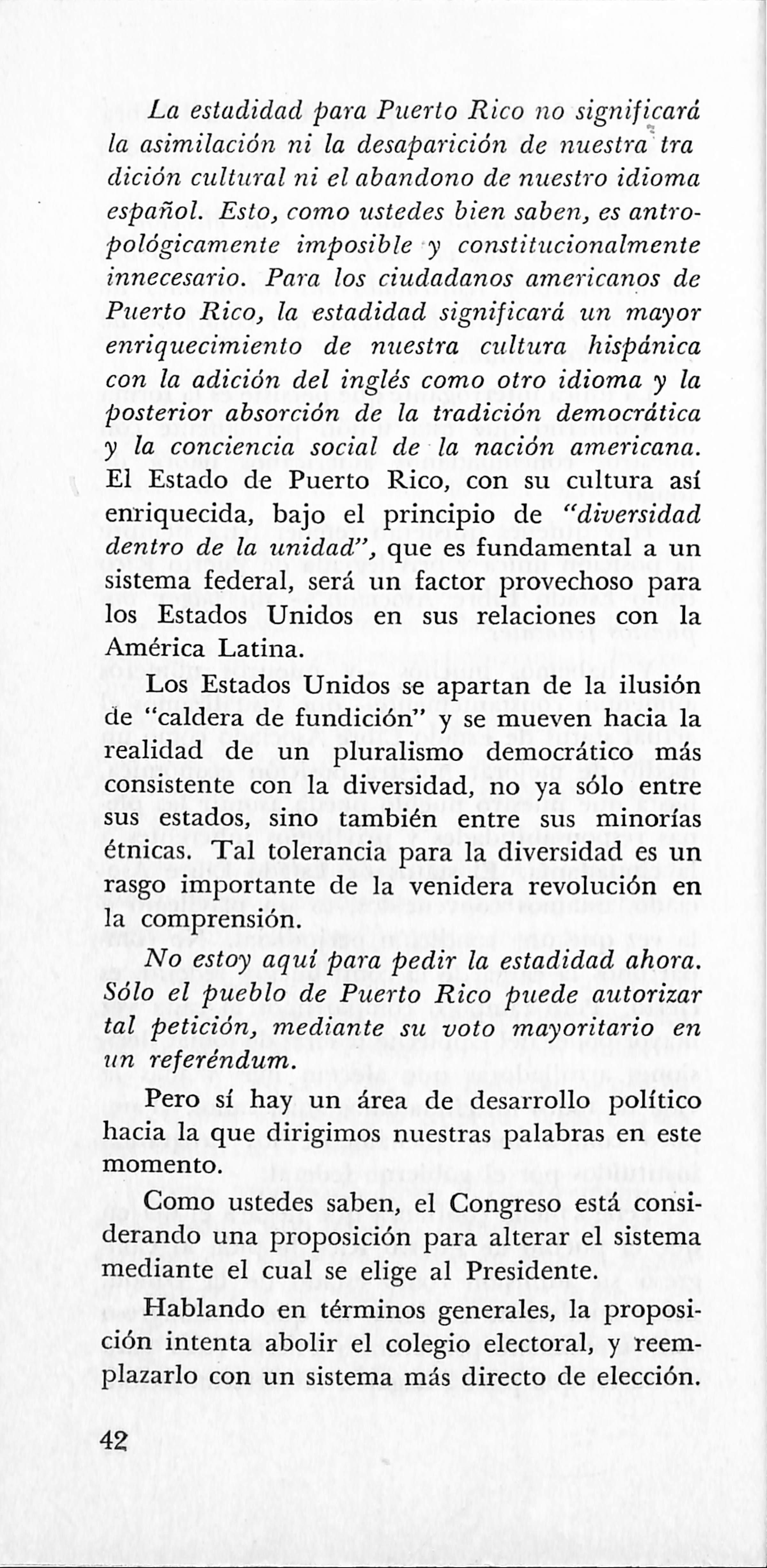
La estadidad para Puerto Rico no significará la asimilación ni la desaparición de nuestra tra ¿lición cultural ni el abandono de nuestro idioma español. Esto, como ustedes bien saben, es antro pológicamente imposible y constitucionalmente innecesario. Para los ciudadanos americanos de Puerto Rico, la estadidad significará un mayor enriquecimiento de nuestra cultura hispánica con la adición del inglés como otro idioma y la posterior absorción de la tradición democrática y la conciencia social de la nación americana. El Estado de Puerto Rico, con su cultura así enriquecida, bajo el principio de "diversidad dentro de la unidad", que es fundamental a un sistema federal, será un factor provechoso para los Estados Unidos en sus relaciones con la América Latina.
Los Estados Unidos se apartan de la ilusión de "caldera de fundición" y se mueven hacia la realidad de un pluralismo democrático más consistente con la diversidad, no ya sólo entre sus estados, sino también entre sus minorías étnicas. Tal tolerancia para la diversidad es un rasgo importante de la venidera revolución en la comprensión.
No estoy aquí para pedir la estadidad ahora. Sólo el pueblo de Puerto Rico puede autorizar tal petición, mediante su voto mayoritario en un referéndum.
Pero sí hay un área de desarrollo político hacia la que dirigimos nuestras palabras en este momento.
Como ustedes saben, el Congreso está consi derando una proposición para alterar el sistema mediante el cual se elige al Presidente.
Hablando en términos generales, la proposi ción intenta abolir el colegio electoral, y reem plazarlo con un sistema más directo de elección.
Sinceramente creemos que todos los ciudada nos de los Estados Unidos deben participar en la elección de su Presidente.
Este, más que ningún otro funcionario electo en nuestro gobierno, es el llamado a hablar a nombre de, y representar a todos los americanos. El deberá, por lo tanto, lógicamente ser elegido por todos los norteamericanos.
El Presidente es el principal arquitecto de la ¡eolítica exterior que afecta a los ciudadanos americanos en todas partes. Deberá pues ser elegido por los ciudadanos americanos en todas partes.
El Presidente es el símbolo personal de nues tra unidad nacional. Todos los ciudadanos de nuestra nación deberán tener igual voz en la elección de un símbolo tan personal y nacional.
El Comisionado Residente de Puerto Rico, el Honorable Jorge Córdova Díaz, miembro sin voto de la Cámara de Representantes, está al presente gestionando una adición a la proposi ción de reforma electoral presidencial. Se trata simplemente de que se autorice al Congreso a extender el derecho al voto presidencial a otros ciudadanos de los Estados Unidos actualmente sin dicho derecho, cuándo y cómo el Congreso lo estime conveniente.
En Puerto Rico, el deseo del voto presiden cial trasciende todas las líneas partidistas.
Es este un aspecto de la historia puertorri queña que la Prensa aquí reunida nos puede ayudar a informar. Somos parte de esta nación, y en esta encrucijada de la historia ansiamos participar más plenamente en sus decisiones.
Con arreglo a la recomendación de una comisión conjunta creada en 1965 por el Presi dente, el Congreso y Puerto Rico, he solicitado del Presidente Nixon que nombre los miembros
correspondientes a los Estados Unidos continen tales de un grupo ad-hoc especialmente consti tuido para estudiar el asunto de extender el voto presidencial a Puerto Rico.
Espero que dicho comité ad-hoc considerará, entre otras cosas, los siguientes argumentos a favor de dicha extensión de la franquicia elec toral presidencial a Puerto Rico:
1. Los puertorriqueños son reclutados en las fuerzas armadas, al igual que los demás ciuda danos americanos.
2. Puerto Rico es un segmento de la nación americana que percibe con claridad el sueño americano de igualdad de oportunidades, y co noce lo difícil que es convertir dicho sueño en realidad.
3. Puerto Rico es una Isla de reconocida armonía racial y, como tal, tiene una contribu ción que ofrecer a la nación entera.
4. En momentos en que los Estados Unidos realizan nuevos intentos de comprensión, respeto mutuo y cooperación con la América Latina, puede resultar muy beneficioso a la Nación el extender una medida de igualdad electoral a los ciudadanos americanos en Puerto Rico, que comparten un idioma común y una cultura similar con los vecinos del Sur con quienes ansiosamente tratamos de comunicarnos.
Y esto me trae al pensamiento final que qui siera dejar con ustedes hoy. Se trata precisamente de esta misma área de relaciones interamericanas. Es un área en que creo que Puerto Rico puede hacer una importantísima contribución a los Estados Unidos.
No hay lugar donde la antes mencionada revolución en la comprensión haga más falta
que entre la América del Norte y la América del Sur. Nuestras vidas están entrelazadas, pero los motivos son malinterpretados y el prejuicio anda desenfrenado.
Podemos hablar con un hombre en la luna, mientras unos 400 millones de personas obser van, como lo hizo el Presidente con los hombres del Apolo 11. Pero la tecnología no ha ayudado mucho a traer la comprensión entre los pueblos. Tal parece que en este mundo hay tanta, si no más, discordia e incomprensión que antes del desarrollo de estos complicados medios de comu nicación.
A los Estados Unidos les ha sido difícil llegar a una común comprensión en Asia. Y creo que las probabilidades de llegar a una común com prensión en este Hemisferio son mucho mayores. La mayoría de nosotros en las Américas tenemos ascendencia europea; provenimos de la misma tradición judaica-cristiana. Tenemos una común devoción a la democracia y la libertad. Somos económicamente interdependientes. A tenor con los pronunciamientos del Presidente sobre la América Latina y el Informe Rockefeller, creo que debemos hacer un nuevo intento por alcan zar solidaridad y una mayor comprensión entre las naciones de este Hemisferio. Esto podría lograrse mediante un cambio en nuestra política de inversión extranjera. Po dríamos enfatizar más la exportación de la tecno logía. Los mercados del futuro no dependerán ya de los anticuados conceptos coloniales del capital absentista. Este nuevo uso del capital para desarrollar los Nuevos Mercados ayudará a reducir las tensiones que ponen a prueba las relaciones entre nuestra Nación y algunas na ciones de Latinoamérica.
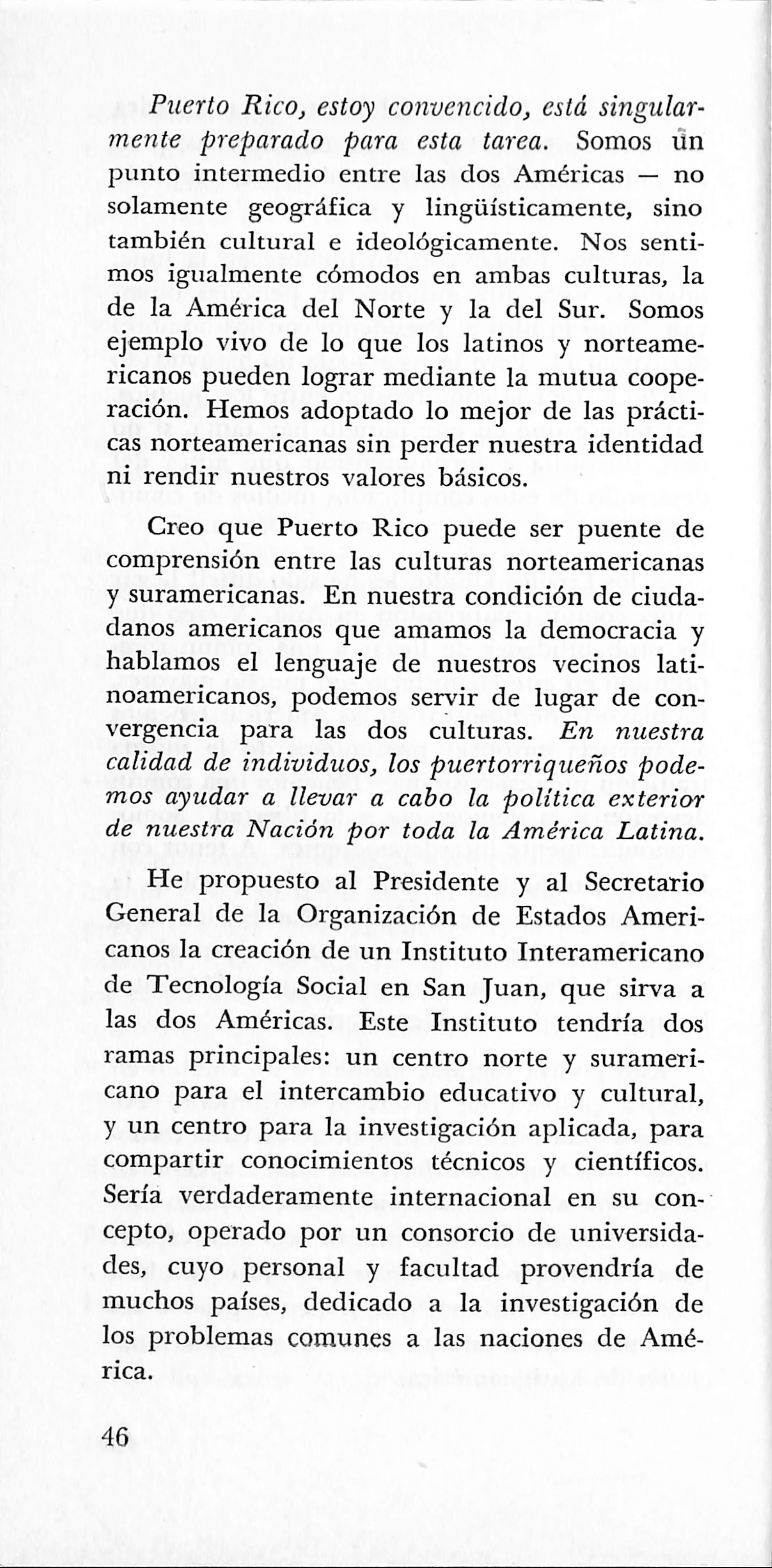
Puerto Rico, estoy convencido, está singular mente preparado para esta tarea. Somos Un punto intermedio entre las dos Américas — no solamente geográfica y lingüísticamente, sino también cultural e ideológicamente. Nos senti mos igualmente cómodos en ambas culturas, la de la América del Norte y la del Sur. Somos ejemplo vivo de lo que los latinos y norteame ricanos pueden lograr mediante la mutua coope ración. Hemos adoptado lo mejor de las prácti cas norteamericanas sin perder nuestra identidad ni rendir nuestros valores básicos.
Creo que Puerto Rico puede ser puente de comprensión entre las culturas norteamericanas y suramericanas. En nuestra condición de ciuda danos americanos que amamos la democracia y hablamos el lenguaje de nuestros vecinos lati noamericanos, podemos servir de lugar de con vergencia para las dos culturas. En nuestra calidad de individuos, los puertorriqueños pode mos ayudar a llevar a cabo la política exterior de nuestra Nación por toda la América Latina.
He propuesto al Presidente y al Secretario General de la Organización de Estados Ameri canos la creación de un Instituto Interamericano de Tecnología Social en San Juan, que sirva a las dos Américas. Este Instituto tendría dos ramas principales: un centro norte y suramericano para el intercambio educativo y cultural, y un centro para la investigación aplicada, para compartir conocimientos técnicos y científicos.
Sería verdaderamente internacional en su con cepto, operado por un consorcio de universida des, cuyo personal y facultad provendría de muchos países, dedicado a la investigación de los problemas comunes a las naciones de Amé-
Confío que los fondos provendrán de fuentes públicas y particulares de todo el Hemisferio, para hacer de dicho Instituto una realidad. Al correr de los años, mediante intercambios, con ferencias, investigación conjunta y demás, creo que un Instituto podría hacer contribuciones notables para promover la comprensión entre los ¡Dueblos de este Hemisferio.
Dentro de siete años celebraremos el 200 aniversario de la fundación de nuestra Nación, la primera Nación creada para salvaguardar la libertad individual y el derecho a la búsqueda de la felicidad por todo ciudadano. Proclama mos que sería este el principio político rector de este nuevo mundo, pero distamos aún mucho de haber logrado nuestro propósito.
Las Guerras Primera, Segunda y luego Corea y Vietnam, atrajeron nuestra atención hacia Europa y el Asia. Tal vez ya sea tiempo de volver nuestras miradas atrás a nuestras Américas, la del Norte y la del Sur, y de aplicar a sus problemas el conocimiento y la experiencia que hemos adquirido.
Hemos llegado a la luna trabajando conjun tamente como equipo. Ya es tiempo de que tratemos de usar ese mismo enfoque para erra dicar la incomprensión y el prejuicio en toda América, y conducir al nuevo mundo hacia nive les más altos de logro y justicia.
Laborando por separado, los pueblos del tiemisferio Occidental se verán obligados a vagar en las tinieblas del prejuicio. Juntos, podremos valemos de conocimientos ya disponibles como faro de razón para guiarnos hacia la búsqueda de un verdadero nuevo mundo.
Puerto Rico debe formar parte de este em puje del Hemisferio Occidental —una América unida marchando hacia adelante— tratando de
alcanzar las aspiraciones de hombres y naciones —hacia nna Nueva Vida— una vida mejor de libertad y prosperidad, donde el sueño de la igualdad de oportunidades en la búsqueda de la felicidad se torne en realidad para cada hom bre — un sueño que ustedes, en los medios de comunicación, pueden ayudar a lograr durante las décadas venideras, llevando adelante la revo lución en la comprensión.
SESION DE PREGUNTAS
La Primera pregunta, señor, es acerca de su predecesor: Luis Muñoz Marín es miembro de este Club, como ciertamente usted también lo es, y es muy querido y admirado por nosotros. ¿Qué opina usted de él? ¿Qué crédito se merece en relación con la actual prosperidad en Puerto Rico?
Gobernador Ferré
Opino que Puerto Rico ha disfrutado un período de cambio, del cual el ex-Gobernador Muñoz Marín fue un líder y sirvió muy bien a su país. Creo que él inició este cambio; que él merece gran crédito por ello, pero actualmente las cosas han cambiado, hasta el extremo de que un nuevo equipo de trabajo se hizo necesario.
Presidente
¿Cuándo se llevará a cabo en Puerto Rico un plebiscito sobre la Estadidad?
Gobernador Ferré
Un plebiscito es algo que tendremos que decidir de acuerdo con las circunstancias y re sulta difícil decir cuándo. Tenemos algunos asuntos de suma urgencia que deseamos resolver primero, y la idea de nuestro nuevo Gobierno
de emprender un ataque masivo a estos proble mas, para mi concepto, es muy importante.
Creo que no se puede salvar la vida a una persona administrándole sólo la mitad o una tercera parte de la medicina que necesita. Se le .tiene que administrar toda la medicina. Tene mos que hacer lo que sea necesario para eliminar el desempleo en Puerto Rico; reducirlo a un por ciento razonable. Como ustedes saben, tene mos actualmente un 12 por ciento de desemplea dos lo cual es muy alto, y en el grupo de los jóvenes, un 22 por ciento. No puede uno cru zarse de brazos, desde luego, con una situación de tal naturaleza.
Soy muy afortunado en tener hombres como el señor Juan Rodríguez de Jesús, quien se en cuentra aquí presente, como Administrador de Fomento Económico, y al señor Jorge Luis Córdova, nuestro Comisionado Residente, y a un grupo de hombres y mujeres capacitados que integran mi Gabinete. Forman un grupo de personas destacadas, que han rechazado salarios tres y cuatro veces más altos de los que perciben ahora, pues desean servir al pueblo de Puerto Rico con sus conocimientos. Y creo que, con este equipo de trabajo y este nuevo enfoque de la fusión de la ciencia y la tecnología a las tareas de nuestro gobierno para hacerlo más eficiente, podremos resolver estos problemas dentro de algunos años. Después que resolvamos estos pro blemas, creo que podremos celebrar un plebiscito.
Presidente
Usted se refirió en sus palabras, señor, al "issue" del idioma y la pregunta consiste en: ¿No ocasionaría la barrera o brecha en el idioma, un problema muy difícil en la obtención de la estadidad?
Gobernador Ferré
"No lo creo así. Creo que'lo importante es conseguir que todas las personas en Puerto Rico aprendan a hablar inglés con fluidez. Ahora, déjenme decirles: Puerto Rico pasó a ser parte de Estados Unidos en 1898. Era una comunidad pobre y no creo que el Gobierno Federal se dio cuenta de la importancia de enseñar el inglés a la población puertorriqueña. Creo que debieron actuar como hicieron con las Filipinas. En el caso de los filipinos, los cuales no tenían un lenguaje nacional, pero que hablaban varios dialectos diferentes, Estados Unidos envió un gran número de profesores pagados por el Go bierno Federal con el propósito de enseñar inglés a los filipinos y éstos aprendieron muy buen inglés, como todos ustedes saben. Ahora, veamos el caso de Puerto Rico. Se nos dejó solos para atender el problema del idioma con nuestros propios limitados recursos. En otras palabras, aquí había una comunidad pobre, la cual fue adoptada por Estados Unidos por su propio empeño, y sin embargo se nos dijo: "Tienen que aprender inglés", y tuvimos que hacerlo por nuestra propia cuenta. Opino que esto no fue justo. Creo que debimos haber tenido algún tipo de ayuda especial para ayudar a los puerto rriqueños a aprender inglés con fluidez, sin, por supuesto, perder nuestras tradiciones espa ñolas, las cuales no se pueden abandonar aunque tratáramos, ya que esos de ustedes que conocen de antropología saben que en eso no puede pensarse. Sin embargo, creo que lo importante es aprender inglés con fluidez y eso puede lograrse. Yo aprendí inglés en Puerto Rico y creo que puedo expresarme con bastante fluidez.
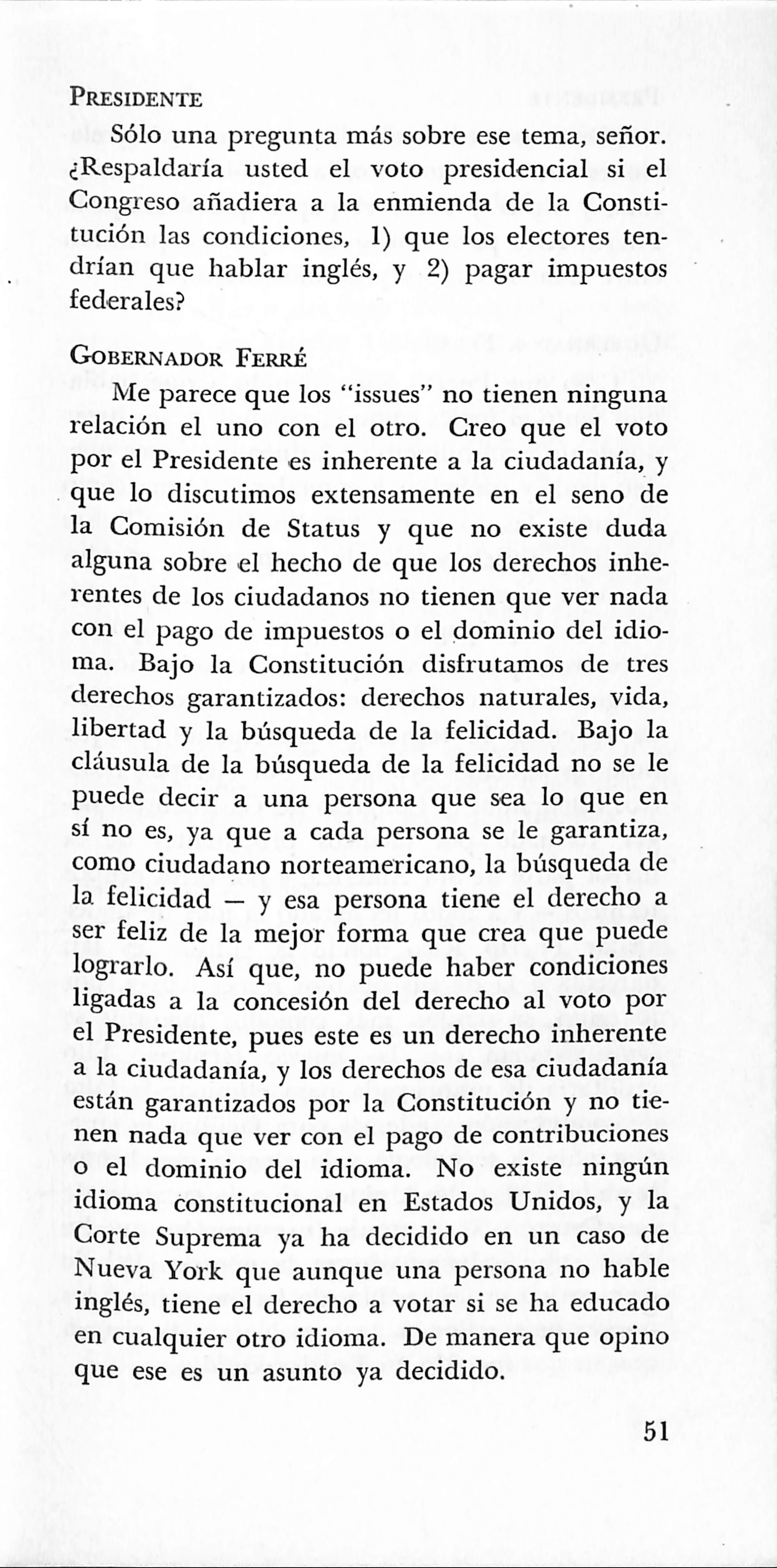
Presidente
Sólo una pregunta más sobre ese tema, señor. ¿Respaldaría usted el voto presidencial si el Congreso añadiera a la enmienda de la Consti tución las condiciones, 1) que los electores ten drían que hablar inglés, y 2) pagar impuestos federales?
Gobernador Ferré
Me parece que los "issues" no tienen ninguna relación el uno con el otro. Creo que el voto por el Presidente es inherente a la ciudadanía, y que lo discutimos extensamente en el seno de la Comisión de Status y que no existe duda alguna sobre el hecho de que los derechos inhe rentes de los ciudadanos no tienen que ver nada con el pago de impuestos o el dominio del idio ma. Bajo la Constitución disfrutamos de tres derechos garantizados: derechos naturales, vida, libertad y la búsqueda de la felicidad. Bajo la cláusula de la búsqueda de la felicidad no se le puede decir a una persona que sea lo que en sí no es, ya que a cada persona se le garantiza, como ciudadano norteamericano, la búsqueda de la felicidad — y esa persona tiene el derecho a ser feliz de la mejor forma que crea que puede lograrlo. Así que, no puede haber condiciones ligadas a la concesión del dereclio al voto por el Presidente, pues este es un derecho inherente a la ciudadanía, y los derechos de esa ciudadanía están garantizados por la Constitución y no tie nen nada que ver con el pago de contribuciones o el dominio del idioma. No existe ningún idioma constitucional en Estados Unidos, y la Corte Suprema ya ha decidido en un caso de Nueva York que aunque una persona no hable inglés, tiene el derecho a votar si se ha educado en cualquier otro idioma. De manera que opino que ese es un asunto ya decidido.
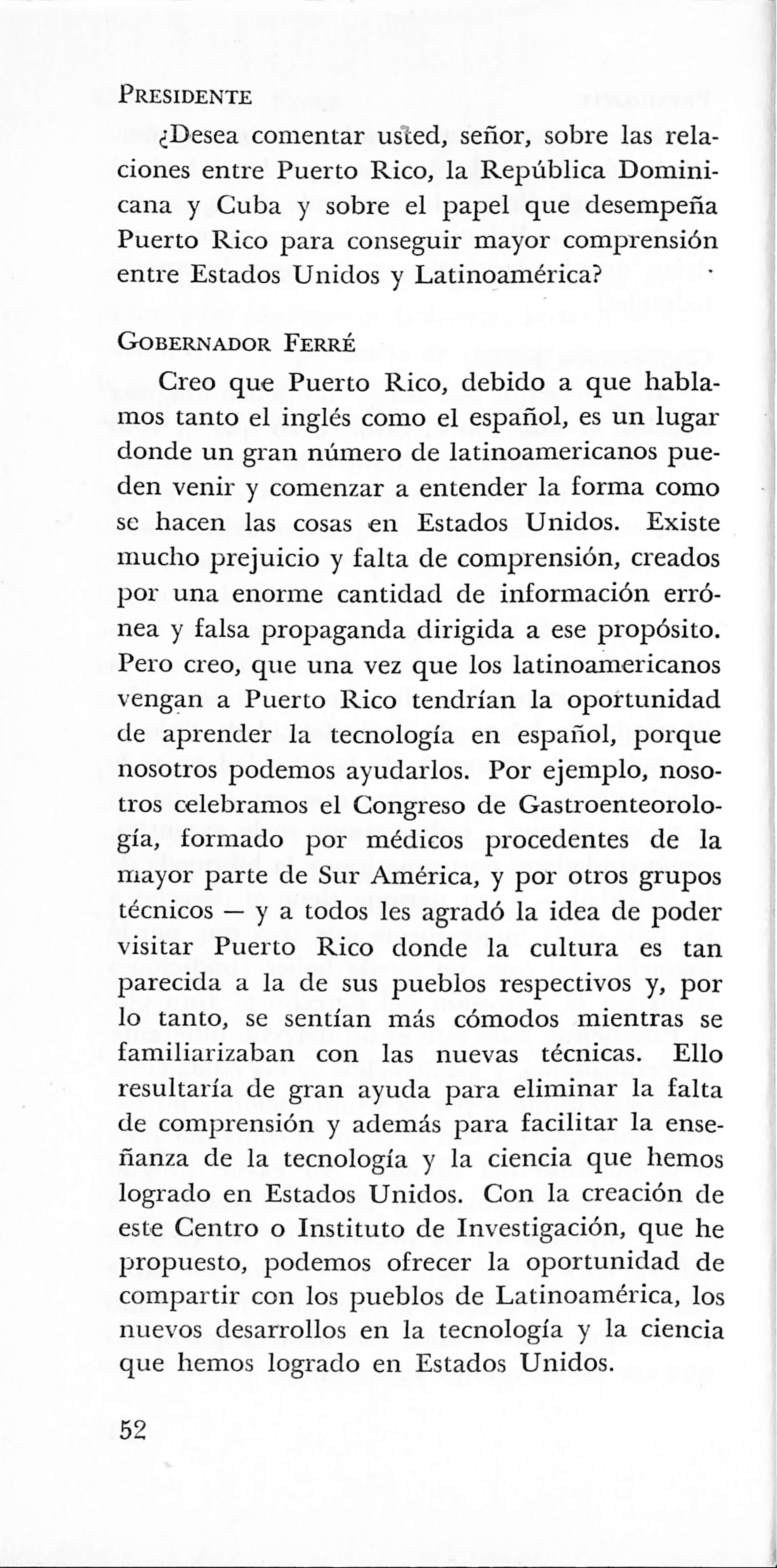
Presidente
¿Desea comentar usted, señor, sobre las rela ciones entre Puerto Rico, la República Domini cana y Cuba y sobre el papel que desempeña Puerto Rico para conseguir mayor comprensión entre Estados Unidos y Latinoamérica?
Gobernador Ferré
Creo que Puerto Rico, debido a que habla mos tanto el inglés como el español, es un lugar donde un gran número de latinoamericanos pue den venir y comenzar a entender la forma como se hacen las cosas en Estados Unidos. Existe mucho prejuicio y falta de comprensión, creados por una enorme cantidad de información erró nea y falsa propaganda dirigida a ese propósito. Pero creo, que una vez que los latinoamericanos vengan a Puerto Rico tendrían la oportunidad de aprender la tecnología en español, porque nosotros podemos ayudarlos. Por ejemplo, noso tros celebramos el Congreso de Gastroenteorología, formado por médicos procedentes de la mayor parte de Sur América, y por otros grupos técnicos — y a todos les agradó la idea de poder visitar Puerto Rico donde la cultura es tan parecida a la de sus pueblos respectivos y, por lo tanto, se sentían más cómodos mientras se familiarizaban con las nuevas técnicas. Ello resultaría de gran ayuda para eliminar la falta de comprensión y además para facilitar la ense ñanza de la tecnología y la ciencia que hemos logrado en Estados Unidos. Con la creación de este Centro o Instituto de Investigación, que he propuesto, podemos ofrecer la oportunidad de compartir con los pueblos de Latinoamérica, los nuevos desarrollos en la tecnología y la ciencia que hemos logiado en Estados Unidos.
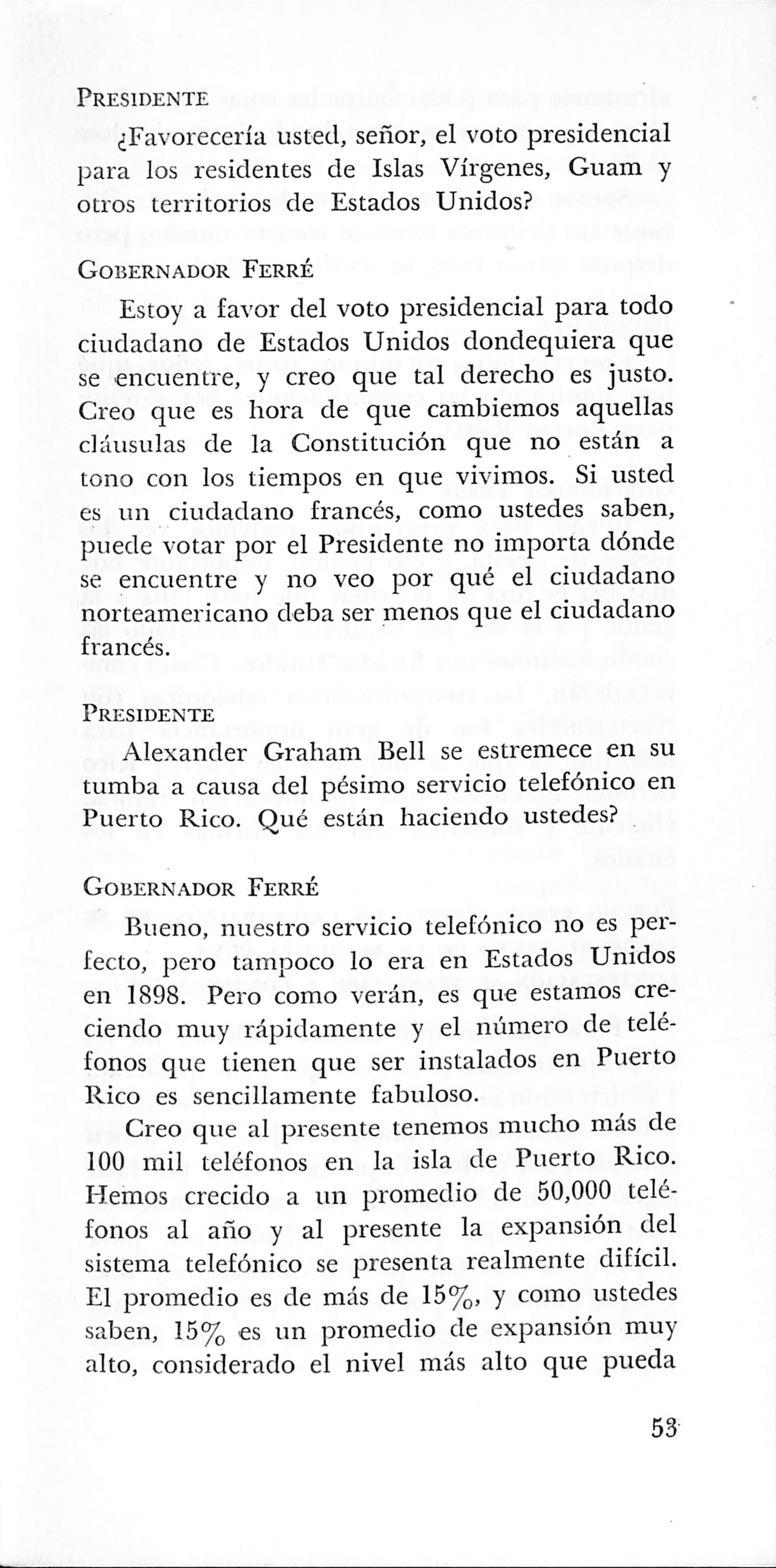
Presidente
¿Favorecería usted, señor, el voto presidencial para los residentes de Islas Vírgenes, Guana y otros territorios de Estados Unidos?
Gobernador Ferré
Estoy a favor del voto presidencial para todo ciudadano de Estados Unidos dondequiera que se encuentre, y creo que tal derecho es justo. Creo que es hora de que cambiemos aquellas cláusulas de la Constitución que no están a tono con los tiempos en que vivimos. Si usted es un ciudadano francés, como ustedes saben, puede votar por el Presidente no importa dónde se encuentre y no veo por qué el ciudadano norteamericano deba ser menos que el ciudadano francés.
Presidente
Alexander Graham Bell se estremece en su tumba a causa del pésimo servicio telefónico en Puerto Rico. Qué están haciendo ustedes?
Gobernador Ferré
Bueno, nuestro servicio telefónico no es per fecto, pero tampoco lo era en Estados Unidos en 1898. Pero como verán, es que estamos cre ciendo muy rápidamente y el número de telé fonos que tienen que ser instalados en Puerto Rico es sencillamente fabuloso. Creo que al presente tenemos mucho mas de 100 mil teléfonos en la isla de Puerto Rico. Hemos crecido a un promedio de 50,000 telé fonos al año y al presente la expansión del sistema telefónico se presenta realmente difícil. El promedio es de más de 15%, y como ustedes saben, 15% es un promedio de expansión muy alto, considerado el nivel más alto que pueda
alcanzarse para poder hacer las cosas bien. Pero estoy seguro que ^ cuestión de ir poniéndose al día.
Somos como una criatura hambrienta. Du rante los primeros minutos comerá mucho, pero después de un rato, se sentirá satisfecha.
Presidente
Con relación a ese mismo "issue", señor, ¿qué han significado las comunicaciones por satélite para Puerto Rico?
Gobernador Ferré
Bueno, para divertirnos, podemos ver los juegos de pelota, y eso es muy importante hoy día; esa es una de las cosas que hace feliz a la gente, y a la vez, por supuesto, ha facilitado las comunicaciones con Estados Unidos. Como com prenderán, las comunicaciones telefónicas con Norteamérica son de gran importancia para nosotros, ya que la industria en Puerto Rico necesita mantener una comunicación rápida, eficiente y constante con sus oficinas en los estados.
Por un error técnico en la grabación, no se logró el texto de la pregunta cuya contestación se transcribe a continuación:
"Ellos piensan que nuestra sociedad no les ha proporcionado el mundo que ellos quisieran, y tienen razón al respecto. Ellos creen que hemos debido ofrecerles un mundo mejor, pero deben aprender, sin embargo, que no resulta tan fácil lograr ese mundo mejor. Ha tomado miles de años de trabajo, sudor y sufrimientos, para adquirir la libertad que disfrutamos hoy día, aunque limitada, y por lo tanto, lo que debemos hacer es estudiar este problema en una forma objetiva.
Lo que dije acerca de la revolución en la comprensión, es muy importante. A pesar de la fantástica rapidez en las comunicaciones que hoy existe a través de todo el mundo, los problemas en la comprensión se acentúan. En tiempos pasados el ciudadano tenía problemas de com prensión únicamente con su nación, pero al pre sente estos problemas subsisten entre todas las personas a través del mundo entero. De manera que tenemos que encontrar la forma de com prendernos mejor los unos a los otros.
Ahora les daré un ejemplo de lo que quiero decir. Ayer, cuando arribé al aeropuerto, uno de los porteros se me acercó y me dijo algo. Yo me dirigí a él y le llamé "Boy". Todos a mi alrededor dijeron "Espera un momento, nunca llames "boy" a un portero en esta ciudad. Pero, como verán, para mí, decir "boy" es algo com pletamente natural, como si dijera "muchacho". "Muchacho" significa "boy". A esto es a lo que me refiero cuando hablo de la "comunicación", la semántica del lenguaje, y muchas otras cosas... Tenemos que concentrarnos en esta teoría del lenguaje; en cómo se desarrollan los idiomas. Usted debe traducir no sólo las palabras de un lenguaje: sí que también el espíritu de las gentes. Y esa tarea requiere más esfuerzo que cuando se traduce una palabra por otra o una frase por otra; estos problemas requieren inves tigación científica y tecnológica. Esa es la razón por la cual estoy pensando en la investigación tecnológica y social. ¿Cómo podremos averiguar la base de la falta de comprensión entre Latinoa mérica y Norte América para llegar a la raíz de esta incomprensión? ¿Cuáles son estas raíces y cómo podemos eliminarlas?, ya que no lo vamos a conseguir utilizando las palabras suaves ni las mejores intenciones que podamos desempeñar.
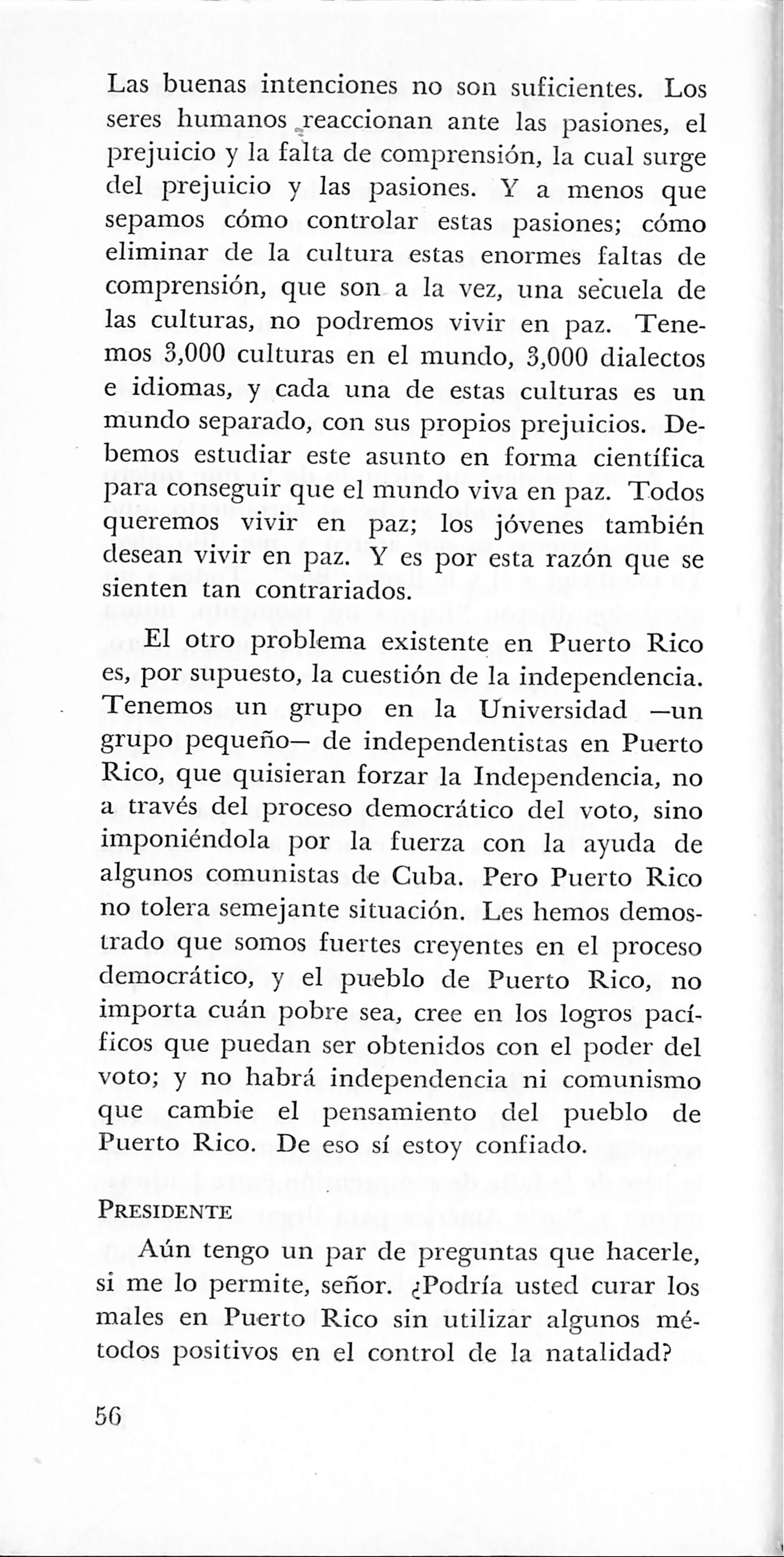
Las buenas intenciones no son suficientes. Los seres humanos ^reaccionan ante las pasiones, el prejuicio y la falta de comprensión, la cual surge del prejuicio y las pasiones. Y a menos que sepamos cómo controlar estas pasiones; cómo eliminar de la cultura estas enormes faltas de comprensión, que son a la vez, una secuela de las culturas, no podremos vivir en paz. Tene mos 3,000 culturas en el mundo, 3,000 dialectos e idiomas, y cada una de estas culturas es un mundo separado, con sus propios prejuicios. De bemos estudiar este asunto en forma científica para conseguir que el mundo viva en paz. Todos queremos vivir en paz; los jóvenes también desean vivir en paz. Y es por esta razón que se sienten tan contrariados.
El otro problema existente en Puerto Rico es, por supuesto, la cuestión de la independencia. Tenemos un grupo en la Universidad —un grupo pequeño— de independentistas en Puerto Rico, que quisieran forzar la Independencia, no a través del proceso democrático del voto, sino imponiéndola por la fuerza con la ayuda de algunos comunistas de Cuba. Pero Puerto Rico no tolera semejante situación. Les hemos demos trado que somos fuertes creyentes en el proceso democrático, y el pueblo de Puerto Rico, no importa cuán pobre sea, cree en los logros pací ficos que puedan ser obtenidos con el poder del voto; y no habrá independencia ni comunismo que cambie el pensamiento del pueblo de Puerto Rico. De eso sí estoy confiado.
Presidente
Aún tengo un par de preguntas que hacerle, si me lo permite, señor. ¿Podría usted curar los males en Puerto Rico sin utilizar algunos mé todos ¡rositivos en el control de la natalidad?
Gobernador Ferré
Aquí está el informe del Comité especial que brega con el problema del control de la natali dad. Así, que como verán, estamos trabajando en ello.
Presidente
Alguien me ha pedido que le haga esta pre gunta. ¿Cómo está nuestro viejo amigo del Club de Prensa, Bill Dorvillier?
Gobernador Ferré
Bill Dorvillier se encuentra muy bien. Actual mente tiene un programa en la televisión y está también a cargo de la estación WAPA-TV. Ya es un jíbaro; se ha convertido en puertorriqueño. Ha podido cruzar la barrera de la incomprensión y está completamente identificado con el pueblo de Puerto Rico.
Ahora, permítanme regresar de nuevo al tema del control de la natalidad, pues debo aclarar lo que dije. Este es un estudio relacionado con el crecimiento poblacional de Puerto Rico y con los proyectos de planificación de la familia y sugiere la creación de métodos para conseguir la adecuada planificación de la familia, por medio de la acción voluntaria, no por imposición guber namental. Este estudio no ha sido atin aprobado por mí, como Gobernador. El mismo fue j^reparado por uno de mis Comités asesores; ahora lo vamos a abordar. Este Comité forma parte del Consejo Asesor. Esto demuestra que toma mos este asunto muy en serio. El promedio actual en nuestro crecimiento poblacional es de un 2.6%; lo hemos reducido a ese 2.6%, pero aún así, es un promedio alto para Puerto Rico.
Presidente
Antes He hacerle la pregunta final, señor, deseo entregarle a nombre del Club Nacional de Prensa, el certificado de reconocimiento otor gado a los corresponsales de esta capital en premio a servicios meritorios.
Gobernador Ferré
Muchas gracias.
Presidente
Además, señor, deseamos obsequiarle con una copia de nuestra Corbata de Prensa Oficial.
Gobernador Ferré
Gracias.
Presidente
Algunos compañeros desearían hacer un trato con usted, señor. Si Washington le otorga la estadidad a Puerto Rico, ¿apoyaría usted nuestro sistema del Distrito de Columbia?
Gobernador Ferré
Apoyaré la justicia para el Distrito de Colum bia. Ese es un trato justo.
Muchas gracias por el honor de haberme invitado aquí, y por supuesto, muchas gracias por estos obsequios que me han hecho. Señor Presidente, gracias.
Presidente
Muchas gracias a usted, señor.
IMPRESO EN LOS TALLERES DE ARTES GRAFICAS DEL DEPARTAMENTO DE INSTRUCCION PUBLICA DEL ESTADO LIBRE ASOCIADO DE PUERTO RICO - 1970 CALLE HOARE NUM. 705 - SANTURCE, PUERTO RICO. Impreso en Puerto Rico • Printed in Puerto Rico
